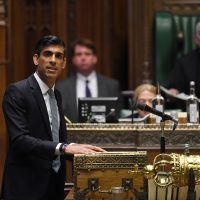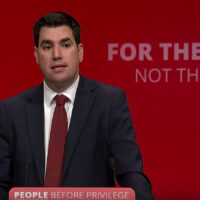

Below is a sample of the emails you can expect to receive when signed up to Labour List.

 |
 We’re back to tricky amendments, legislative loopholes and possibly even parliamentary ping pong after the government dismayed its own Tory MPs and peers by confirming that it wants to break international law on Brexit. Bob Neill, the Conservative who elicited that infamous response from Brandon Lewis earlier this week, has tabled an amendment to the internal markets bill that would establish a parliamentary lock on changes to the withdrawal agreement. And he says its supporters are “not natural rebels”. There is also trouble in the Lords, where Brexiteers are unhappy with the government’s proposal. Is this whole drama intended to serve as a distraction ahead of UK concessions? And will Labour back the rebels? Silence on that question so far. But the Welsh Labour government isn’t happy, as Mick Antoniw has explained on LabourList. The latest coronavirus measures aren’t going down well in the Conservative Party either – and I’m not just talking about the libertarians who insist on the right to meet in groups of more than six. The Treasury committee, made up mostly of Tory MPs, has told the Chancellor to “carefully consider” targeted extensions to its furlough scheme. This is what Labour has been calling for: a recognition that some sectors won’t be able to recover by October, even without the possibility of a second wave and lockdown, but don’t deserve to be cut off from support because they could be viable in the future or need more time to adapt. The TUC and Unite are pushing hard for changes to the job retention scheme instead of a cliff edge. If Rishi Sunak cares about avoiding deep scarring to the economy, not to mention his leadership ambitions, he’ll need to listen. The battles in Scottish Labour are also coming to a crunch point tomorrow. A motion has been submitted to the Scottish executive committee (SEC): "The SEC expresses that it has no confidence in the leader of the Scottish Labour Party." It has been signed by ten SEC members, the number required for the motion to be accepted. There are some swing voters on the SEC, and there is the potential for the result to be close, but this is a matter of building pressure rather than getting the no-confidence motion approved anyway as it would have no binding consequence without other rule changes. And then there’s the matter of regional list selections. More on this stuff from us later. We’ve had some must-read comment pieces on LabourList this week, and we’ve published so much content that I’m worried you may have missed some of them. On the environment, we had Nadia Whittome backing the climate and ecological emergency bill last week and Andy Newman opposing it this week. On Brexit, Michael Chessum has argued that Keir Starmer is making the same mistakes as Jeremy Corbyn. On Covid, Richard Burgon MP has explained why the government should adopt a ‘zero Covid’ strategy. On the economy, John Lehal set out how Labour can shift the narrative from Tory incompetence to why Labour has the right plan to build back better. And James Meadway suggested ways for Labour to develop a distinctive narrative on business. For more on Labour’s electoral strategy and internal affairs, Caitlin Prowle’s piece on the GMB report and misogyny in the labour movement is essential reading. Our columnist Jake Richards has explored how Labour could become the party of law and order. On Scottish Labour, David Martin – not someone on the party’s left – defended Richard Leonard. Gurinder Singh Josan shared ideas for fixing Labour’s governance deficit. Alice Perry delivered a report on the latest national executive committee (NEC) meeting. Unite’s Steve Turner issued an urgent #SOS4jobs. Ged Nichols invited you to TUC Congress, all taking place online next week. And there is plenty more comment to come. Donate to LabourList if you can, and have a great weekend. Sienna @siennamarla |
|
Top stories |
|||||
|
|||||
|
|||||
 |
|||||
|
|
|||||
|
Media round-up |
|||||
|
I was at the heart of Corbynism. Here''s why we lost If we cannot learn from our mistakes (and from our successes), how can we do better in the future? Neither the emergence of Corbynism nor its failure were primarily due to individuals or groups of individuals, but to structural factors that need to be understood. Of course the roles of individuals are important, but they are only important within the context of whether they take the opportunities and dodge the pitfalls that structural factors put before them. Andrew Fisher, openDemocracy.
|
 |

Home
Contact
Donate
Legal
Unsubscribe

 |
 The Equalities and Human Rights Commission report on Labour antisemitism has been sent to the party, it was confirmed last night. As outlined in an earlier piece on the EHRC drafting process, the inquiry’s conclusions are first sent to the Labour Party for review. Over these 28 days, the party can make written representations on the contents of the document, which is finalised by the EHRC and published at the end of this period. Labour MPs and staffers have been told by new general secretary David Evans not to comment on either the arrival of the draft or the investigation itself. The worry is that this leak-prone party could see the draft being released early. But if all goes to plan, we should be reading the EHRC report in early August. Labour’s task is then to prepare an action plan, if the EHRC serves the party an ‘unlawful act notice’, and to start implementing the recommendations. The equalities watchdog has supervisory powers over such an action plan, and the Labour leader will also be looking for the approval of groups such as the Jewish Labour Movement and the Campaign Against Antisemitism. Both are prepared to criticise Keir Starmer, as JLM’s statement on Lloyd Russell-Moyle and the CAA’s recent comments on his leadership have shown. The Labour leader has already laid the groundwork for this moment, by ensuring that he can reliably win votes on the ruling body and by installing a new general secretary. Speaking of which, it’s all change in the wider labour movement: UNISON’s general secretary Dave Prentis has announced that he will be retiring at the end of the year when his term ends. He was thanked by Starmer for “many years of outstanding leadership” and for representing frontline workers during this crisis, as well as by deputy leader Angela Rayner who started as a carer and came up through UNISON to become a Labour MP. Our round-up of MPs’ tributes to Prentis, described as a "giant of the labour movement", can be found here. A huge thanks also from LabourList for UNISON''s crucial support over the years. The biggest party-affiliated trade unions are going through a period of change. GMB is currently looking for a new general secretary, with an interim head in place at the moment, while three candidates have put themselves forward for the top job at Unite – Howard Beckett, Steve Turner and Sharon Graham. Beckett and Turner will be vying for the endorsement of United Left at a hustings on Saturday. At UNISON, left-winger Roger McKenzie is thought to be keen but there will be plenty of others. This is an exciting time for the wider labour movement: it has played a pivotal role in fighting for workers during this crisis, and any new general secretaries will be boosted by growing union membership. There is much cause for optimism. Sienna @siennamarla |
|
Top stories |
||||
|
||||
|
||||
|
Media round-up |
||||
|
This pandemic is spreading extremism as well as coronavirus For the last four months our focus has been on tackling the devastating impact of Covid-19. Life as we know it has changed dramatically as we’ve all made huge sacrifices and played our part in reducing the spread of the virus. One of the many results of lockdown has been a drop in overall crime. This is, of course welcome. But behind these falling numbers, there are still some areas of real concern. One is the rise in extremism. Sadiq Khan, The Independent.
|
 |

Home
Contact
Donate
Legal
Unsubscribe

 |
 Brexit talks were extended past the ''deadline'' this Sunday, and will continue this week as both sides agreed to "go the extra mile". No new arbitrary deadline was set with negotiators working frantically ahead of the only one that matters – December 31st. EU Brexit chief Michel Barnier said this morning that an agreement is "still possible" but differences remain over "free and fair competition" and "reciprocal access to markets and waters". In an energetic media appearance on Sunday, Ed Miliband stressed the importance of getting a deal and called on the Prime Minister to "stand up to a small bunch of people in his party whose fantasy it has always been to have no deal", also confirming Labour would be "minded to support" a deal. His Labour colleague Steve Reed described the situation as “surreal” and highlighted that Boris Johnson told the public a year ago he had an ‘oven-ready’ deal. Jeremy Corbyn yesterday announced his Peace and Justice Project. In a short video message released on social media, the former Labour leader said the programme will work for "social and economic justice, peace, and human rights in Britain and across the world". Its mission statement commits to "work with labour and social movements and provide platforms to those campaigning for change for the many, not the few". A number on the left have tweeted in support of the project, including Labour MPs Ian Byrne, Beth Winter and former Shadow Chancellor John McDonnell who described it as a "brilliant new initiative". It will launch next month with an online event featuring Labour peer Christine Blower, Unite general secretary Len McCluskey and MP Zarah Sultana. Keir Starmer has this morning called on the Prime Minister to tackle rough sleeping this Christmas, warning it represents "just the tip of an iceberg" of poverty and destitution this winter. In a letter to Johnson, the Labour leader urged him to work with local councils and mayors to ensure access to Covid-secure shelter. The intervention from Starmer comes ahead of his visit to the West Midlands to meet with homelessness projects in Worcester and food poverty campaigners in Birmingham later today. Also to look out for today is our editor Sienna in conversation with Andy Burnham at 6pm this evening. Feel free to send in questions for the Greater Manchester mayor before tuning in. Elliot @elliot_chappell |
|
Top stories |
||||||
|
||||||
|
||||||
|
|
||||||
|
Media round-up |
||||||
|
Keir Starmer''s vision to win in 2024 - economy, love of Britain and voter''s trust Keir Starmer vows to make Labour the party of the economy as he sets out his party''s battle plan for the New Year. The Labour leader will deliver a major speech in January on his vision to “recover and rebuild” the country in the wake of the pandemic. But he admitted the party was only just “beginning to climb the mountain” to prove to the public that it could form the next government. Pippa Crerar, The Mirror.
|
 |

Home
Contact
Donate
Legal
Unsubscribe

 |
|
Today''s top stories |
||||||
|
||||||
|
||||||
|
Other top stories |
||||||
|
||||||
|
Media round-up |
||||||
|
Conservative Party used disinformation ‘with new level of impunity’ during 2019 general election, report finds Researchers from King’s College London warned that the campaign had risked undermining public trust during the coronavirus pandemic. Their report said Tories had “employed overt disinformation” to secure votes, such as by altering a video of Sir Keir Starmer and posing as a fact-checker on Twitter during a leaders’ debate. Lizzie Dearden, The Independent.
|
 |

Home
Contact
Donate
Legal
Unsubscribe

 We’ve come to the end of the August parliamentary recess and LabourList’s morning email pause. We did not return for big Labour news as promised because there was none: the final Equality and Human Rights Commission report on antisemitism within the party still has not been released, such is the length of the ''Maxwellisation'' process whereby those criticised are given the opportunity to respond. While we continue to wait for that major event in Labour Party history, however, the government has provided us with plenty of news as ministers perform U-turn after U-turn. Over the last four weeks, I spoke to Labour MPs recovering from coronavirus, Elliot shared the experiences of parliamentary caseworkers during the crisis, we interviewed Cat Smith, and our new columnist barrister Jake Richards looked at judicial review, children in care and Tory cronyism in government procurement. LabourList ran a readers’ survey. We also reported on the SQA results scandal, followed by the predictable A-Level results fiasco, as well as the toing and froing on the use of face coverings in schools. Oh, and we’ve hired a new reporter. Thanks to all who donated to help us reach that goal. Schools are the top priority this week, as pupils in England and Wales start returning full-time today. Gavin Williamson, the apparently unsackable Education Secretary, has penned an open letter to parents in a bid to reassure them that it is safe. Will it be enough? Teachers have put tons of work into Covid preparations: pupils will be taught in ‘bubbles’, there will be staggered breaks, cleaning stations, face coverings in communal areas if the school wishes or if it is in a high transmission area. But the pressure doesn’t end there. The Mirror reports that headteachers will be responsible for the £216m cost of making schools safe – and could be forced to use funds meant for teaching. More broadly, the economy is set to suffer a major blow as the furlough scheme ends in all sectors next month. It is no coincidence that as we approach this crunch moment, the government has briefed that people could face the sack unless they return to the office. Should we adapt to the changes brought by the pandemic, which is here to stay for the foreseeable? Nah, just threaten working people instead. The message to millenials was clear: forget the housing ladder, spend your money on avo toast in the city centre! But there is conflict, as ever, among ministers, with Health Secretary Matt Hancock saying he didn’t care where we worked. If you can believe it, the government is sending mixed messages during the coronavirus crisis. Can Labour set out an alternative vision of the Covid and post-Covid economy? Rishi Sunak is reportedly considering a raft of wealth-targeting measures to pay for the crisis, many of which featured in Labour’s 2019 manifesto. Yet the party under Keir Starmer’s leadership has said this isn’t the time for tax increases. Just how worried should the left be about the slick Chancellor? Could he become a tricky-to-beat rival leader at the next election, or is he being set up for a big fall? I will be discussing all of these questions and more with Shadow Chancellor Anneliese Dodds at 5.30pm. As always, feel free to suggest questions for our Q&A at the end, and visit this link to watch the event live later. Sienna @siennamarla |
|
Top stories |
||||||
|
||||||
|
||||||
|
Media round-up |
||||||
|
How Keir Starmer plans to make Labour great again Labour’s new leader Keir Starmer is on a surprisingly Trumpian mission: (Re)build the wall! The so-called red wall — a collection of once-solid Labour-voting constituencies in the Midlands and north of England — was laid waste by Boris Johnson in his 2019 election victory. It was the culmination of a decade or more in which old party loyalties based on class have loosened and given way to cultural divides on identity, immigration and Brexit, divides that placed millions of Labour’s traditional working-class, socially conservative voters firmly in Johnson’s camp. Charlie Cooper, Politico.
|
 |

Home
Contact
Donate
Legal
Unsubscribe

 The free school meal row is rumbling on, as one Tory council leader has advised parents who struggle to feed their children to shop at Marks and Spencer and accused Marcus Rashford of creating a “political football”. He’s a real comedian, this one. Dido Harding’s husband John Penrose has also chipped in, blaming “chaotic parents” for food poverty. But will ministers listen instead to the government’s own food tsar? Henry Dimbleby has sent Downing Street a four-point plan for a holiday activity and food programme and a healthy food voucher scheme, as well as Labour’s demand for extended free school meals. He is urging them to “set aside ideology”. If the government won’t listen to campaigners, maybe this Etonian from a famous family can convince them. Devastating news emerged as a migrant boat sank in the Channel yesterday, leading to the deaths of four people including two young children aged five and eight. Others have been hospitalised. As usual, the government has responded by promising to make crossings “unviable”. Labour’s Nick Thomas-Symonds has called for “compassion”, and specifically for the Home Office to reopen safe legal routes and the Dubs scheme, which offered sanctuary to lone minors until ministers decided the mere 480 places had been filled. The opposition is also urging the government to reverse the decision to scrap the Department for International Development and come to an agreement with France. In Covid news, the Resolution Foundation has released a report with crucial data for the UK’s handling of the economic crisis. The think tank has found that the unemployment rate in September was likely to be 7%, and 20% for 18- to 24-year-olds. Another group being disproportionately affected, as predicted by everyone and highlighted by the Lawrence Review this week, is Black, Asian and minority ethnic workers. 22% of BAME workers furloughed during lockdown have since lost their jobs. Youth and BAME unemployment are the two areas to which Gordon Brown has drawn attention in recent months. Read our write-up here, which features the TUC’s response to the vital research. On LabourList today, we’ve got an interview with Kate Dearden from Community union on the struggle of self-employed workers to be heard during the coronavirus crisis. We talk about their new campaign and new inquiry, how the self-employed are misunderstood and how they’ve been forgotten by the government. I will also be in conversation with shadow minister Sarah Jones tonight. If you have suggestions for questions on her policy brief, policing and the fire services, please email them to me – and don’t forget to join us at this link from 6pm to watch the event live. Sienna @siennamarla |
|
Top stories |
||||||
|
||||||
|
||||||
|
|
||||||
|
Media round-up |
||||||
|
Hostile rhetoric will not stop refugee children dying in the Channel After the death of Alan Kurdi, the Syrian toddler pictured washed up on a Turkish beach, many promises and commitments were made by global leaders to step up their response to the migrant crisis. But today, five years on, we are facing an identical tragedy, and much closer to the UK’s doorstep, raising the question: did Kurdi’s death change anything?’ Jamie Grierson, The Guardian
|
 |

Home
Contact
Donate
Legal
Unsubscribe

 |
 Labour is still working out its response to the Chancellor’s summer statement on Wednesday. The party came up with a sound bite to criticise the meal discount scheme, comparing the promised “New Deal” to the delivered “meal deal”. The founder of the Labour Hunger Campaign has written for LabourList on why it’s a “let them eat cake” moment for Rishi Sunak. And Keir Starmer’s party is focusing today on the “secret £1bn giveaway to second homeowners” that was later “snuck out”. Thangam Debbonaire is highlighting that stamp duty on second homes has been reduced from 8% to 3% – benefiting the most well-off, while renters have not had one bit of help during the crisis. But the opposition party centred its criticisms yesterday on the job retention bonus scheme. This was Sunak’s plan for making sure that employers bring back furloughed workers rather than simply laying them off after the job retention scheme ends in October. It will see employers given £1,000 per employee that is retained until at least January. On Thursday morning, the Chancellor admitted that there was “dead weight” involved in the £9bn initiative, as a number of employers receiving the bonus will have already planned to bring back their staff. Some commentators found Sunak’s honesty about the flaws in the scheme refreshing. But Keir Starmer leapt on the comment, declaring that “we can’t afford dead weight”. Bridget Phillipson as Shadow Chief Secretary to the Treasury followed this up with a letter to the head of HMRC, piggybacking on reports that he had expressed concern over the “value for money” of the proposal and it went through via a ministerial direction (when ministers instruct senior civil servants to go ahead with a use of public money even if it hasn’t met their tests, a tool that has been used frequently for Covid-19 measures). Labour is absolutely right to be picking apart this scheme. A one-off £1,000 bonus probably isn’t enough to persuade employers who weren’t already going to retain furloughed staff to start doing so, which means it will mostly serve a nice little bonus that does little to reduce unemployment. As former John McDonnell aide James Meadway has set out, it is an example of corporate welfare: a handout for bosses, not a support for jobs. What scares many Labour members, however, is the language of affordability being used by the leadership. They are talking of “efficient public spending” at a time of crisis, and when the normal rules have been thrown out of the window – something that Labour should surely celebrate. There are fears on the left that this could be a return to the austerity-lite days of Ed Miliband and Ed Balls. It is ground on which Labour cannot win, many have argued. There are clearly tensions over the response to the government’s current approach to the economy: last night, left-wing shadow Treasury team member Dan Carden rejected a Times story that described Labour backtracking from supporting a wealth tax in principle, though the story is accurate. This all goes to the need for Labour to find a way of criticising the government that doesn’t simply urge it to spend more, but doesn’t call for a targeted approach in a way that might limit the parameters of future policy-making either. Sienna @siennamarla |
|
Top stories |
||||
|
||||
|
||||
|
Media round-up |
||||
|
Police in England and Wales face inquiry into possible racial bias Police across England and Wales face an inquiry to establish whether they racially discriminate against ethnic minorities in their use of force and stop and search, the Guardian has learned. The Independent Office for Police Conduct (IOPC) says it will use its formal powers to investigate cases and then look if any pattern of racial discrimination exists. It has vowed it can “drive real change in policing practice”. Vikram Dodd, The Guardian.
|
 |

Home
Contact
Donate
Legal
Unsubscribe

 The Labour Party was formally referred to the Equality and Human Rights Commission by the Campaign Against Antisemitism in July 2018. The equalities body, set up under a Labour government, decided after receiving evidence that the threshold had been met for a full statutory investigation, which was launched in May 2019. It sought to determine “whether unlawful acts had been committed by the party, its employees or its agents”, and whether the party had “responded to complaints of unlawful acts in a lawful, efficient and effective manner”. The Jewish Labour Movement and Labour Against Antisemitism both made substantial submissions, while the CAA regularly contributed to the inquiry. Today the EHRC report on Labour antisemitism has been published. This long-awaited event is a culmination of some of the party’s darkest moments, which have caused pain and hurt to many members – and the days that follow are likely also to be difficult. A press conference by the EHRC is currently underway, the CAA will hold another at half past, Keir Starmer will lead his own at 11am and JLM will do so at 12pm. Jeremy Corbyn is also expected to respond. LabourList will be covering the developments in detail. You can start with our story on the report''s release here. Sienna @siennamarla |
|
Top stories |
||||||
|
||||||
|
||||||
|
|
||||||
|
Media round-up |
||||||
|
Labour must do more to deal with the antisemitism that drove me out My crime was that I was a “Zionist”. My support for an independent Palestinian state alongside Israel with Jerusalem as a shared capital was of no interest. My work in combating poverty, supporting refugees, regenerating Liverpool, campaigning against miscarriages of justice and chairing the transport select committee was seen as far less important. I felt I was on trial. Louise Ellman, The Times
|
 |

Home
Contact
Donate
Legal
Unsubscribe

 "A short, sharp, shock to turn back the clock, slow down the virus and buy us more time." The Welsh government has announced a ''firebreak'' lockdown starting at 6pm on Friday. It will look pretty similar to the UK-wide restrictions seen at the height of the pandemic in March, with the key exception that primary schools – and secondary schools for years seven and eight – will reopen in the second week of the lockdown when the half term ends. Mark Drakeford has announced economic support of almost £300m alongside the measure, but the First Minister told Rishi Sunak that more support for workers is needed in the Covid crisis. He warned: "Only the UK government has the financial firepower to guarantee the levels of income support workers need." Meanwhile in England, we are just hours away from 2.8 million people being forced into Tier 3 restrictions without adequate economic support, with the government on track to reject the concerns voiced by their local leaders. Mayor Andy Burnham has accused the government of "trying to respond to a pandemic on the cheap" as Greater Manchester local leaders face a midday deadline to agree to enter the most severe measures. A late-night ultimatum was delivered by Housing, Communities and Local Government Secretary Robert Jenrick via the media last night, saying that restrictions will be brought in unilaterally if no deal is agreed. The offer on the table, outlined in a letter to council leaders yesterday, is £22m for enforcement and support for vulnerable people, while ministers have said that there will be "additional support commensurate with what we have done in Liverpool City Region and in Lancashire". Merseyside received a financial settlement of £44m, while the government gave Lancashire £42m. But, as Burnham has pointed out this morning, Greater Manchester leaders have never been told how much that support will be. He has said they will write to the PM with what they think is a "fair figure" today, but the mayor has also acknowledged that he will ultimately have to accept the decision of the government. In other news, ballots have started to drop into members'' inboxes for the national executive committee elections. This marks the beginning of the end of the (very long) process of electing new reps to the party''s governing body, and LabourList has put together a handy explainer on the state of play as voting opens. And make sure you also check out our exclusive interview with UNISON general secretary candidate Christina McAnea on compromise, Communists and Red Clydeside as she discussed her working-class roots and plans for the future. The LabourList team sends its best wishes to Labour MP Yasmin Qureshi, who is currently in hospital being treated for Covid. Elliot @elliot_chappell |
|
Top stories |
|||
|
|||
|
|||
|
|
|||
|
Media round-up |
|||
|
Teachers ''busting a gut'', says Wes Streeting Mr Streeting said he agreed with Sir Kier that a two-week circuit-breaker was needed, but that the country should "avoid" closing schools outside of half term. Asked whether schools should shut for two weeks, as suggested by the NEU, or just for the half-term break, Mr Streeting said: "We want to avoid closing schools outside of half term because we know that for those children from the most disadvantaged backgrounds, missing out on school really does do significant harm." Amy Gibbons, TES
|
 |

Home
Contact
Donate
Legal
Unsubscribe

 |
 Momentum is now chaired by a climate activist living in New York and a firefighter working for the Fire Brigades Union. Replacing Jon Lansman with Gaya Sriskanthan and Andrew Scattergood serves to highlight a number of aims and values for the organisation’s new leadership: diversity, links with the wider labour movement, an emphasis on the Green New Deal policy proposals and a renewed focus on international work. Of course, what everyone wants to know is how they will handle Labour’s national executive committee (NEC) elections. The hope for the party’s left is that the Centre-Left Grassroots Alliance meeting tomorrow goes smoothly and a single slate is formed. In news from Labour itself, the party is calling today for a new £1.7bn fightback fund to protect the hospitality industry and high streets amid the lifting of coronavirus restrictions. On the theme of “jobs, jobs, jobs”, the shadow business team has identified those most at risk of going under: beauty salons, nail bars and gyms, which remain closed; pubs, bars, hotels and restaurants, which are allowed to open but cannot trade as normal due to distancing guidelines still in place. These partially and fully shut down sectors could risk the loss of one million jobs, Labour says. The proposed new fund would give councils more flexibility over support for their local economy. This fightback fund idea follows the demand by Labour that the government adapts the furlough scheme being wound down by the Chancellor amid many thousands of job cuts. Anneliese Dodds used the Sunday shows media round to reiterate her message that the “one-size-fits-all” approach should be dropped in favour of sector-specific support. Shadow minister Lucy Powell has warned that the employer contribution aspect of the scheme, which kicks in next month, will be a “step too far” for many businesses. The whole job retention programme is due to end in October, but – as we heard DCMS Secretary Oliver Dowden this morning – many areas of the economy, such as theatres, are not expected to be up and running by the end of the year. Labour has been attempting throughout this crisis to avoid getting trapped, either by promoting impractical ideas or by being overly critical of the government. But the party could also be trapped if it underestimates the scale of this crisis. The furlough scheme being extended to October, for example, was warmly welcomed by the labour movement. And it was indeed a great victory for trade unions that thoroughly deserved celebration. But that move now looks seriously lacking in ambition: the depth and length of the crisis was not appreciated in that moment. Repeating similar miscalculations must be avoided. Sienna @siennamarla |
|
Top stories |
||||
|
||||
|
||||
|
Media round-up |
||||
|
The government errors that led to Leicester''s Covid-19 spike are clear to see I wholeheartedly reject those seeking to blame Leicester residents and particular communities for this outbreak. The Public Health England preliminary inquiry found that there are a multitude of factors behind Leicester’s increase in coronavirus cases. This reinforces what we already know: that we must not focus the blame inwards towards our varied black and minority ethnic communities. Claudia Webbe, The Guardian.
|
 |

Home
Contact
Donate
Legal
Unsubscribe

 We might have assumed that this week would be dominated by Brexit news, as Boris Johnson did set today – the European Council summit – as his deadline for getting a deal. But the Prime Minister has accepted that this self-imposed target will be missed, and has done so with little scrutiny because everyone is talking about coronavirus. Although Andy Burnham has pushed against Greater Manchester being put into the government’s new ‘Tier 3’ category of coronavirus alert level, Downing Street is now expected to do just that to the area along with Lancashire. (Meanwhile, London is expected to enter ‘Tier 2’.) The Labour mayor has warned that this would be “by imposition, not consent” and the region would consider taking legal action over the lack of financial support available to the low-paid and self-employed. Before final talks with 10 Downing Street, set to be held this morning, again the news was briefed to the national media first and Sky News tweeted it last night. Local council leaders and MPs took to social media in protest – including Tory William Wragg. “They don’t even have lists of which MPs represent GM constituencies and keep leaving people out of briefings,” added Labour’s Barbara Keeley. It is an undeniable mess. Ministers keep claiming that the decisions for local restrictions are being made “jointly” with local representatives, but that clearly is not the case. Of course, the situation could be transformed by a well-functioning test and trace system, yet the Tories will not consider dropping Serco and handing power to local public health teams – as shown in the rejection of Labour’s motion yesterday. Coming up in the House of Commons today is the government’s controversial covert human intelligence sources (criminal conduct) bill, which Labour will not be voting against at third reading, as revealed by LabourList on Monday. Trade unions and Labour MPs concerned about the bill are supportive of the party’s amendments, seeking to introduce safeguards in the legislation, but the proposed changes will be blocked by the Tories. Although the general secretaries of 14 trade unions have joined with a number of Labour MPs and campaigning organisations including both Momentum and soft left Open Labour to urge Keir Starmer to oppose the ''spycops'' bill if it is unamended, the leadership is undeterred. After more than just Socialist Campaign Group MPs expressed concerns at the Monday meeting about abstaining on the CHIS bill, the Labour leader arranged personal meetings to persuade them not to break the whip. We will know this afternoon whether this has ensured that the rebellion is kept at around 20 MPs only. Want to know more about the arguments on either side? Diane Abbott wrote for LabourList on why she plans to defy the whip this week, while shadow minister Conor McGinn has also written for LabourList to set out the reasons for the leadership’s decision. Both are worth reading. Sienna @siennamarla |
|
Top stories |
|||
|
|||
|
|||
|
|
|||
|
Media round-up |
|||
|
Coronavirus: Test and Trace consultants paid equivalent of £1.5m salary The government is paying individual private sector consultants million-pound wages to work on its test and trace system, according to documents seen by Sky News. Some executives from Boston Consulting Group (BCG) helping the government set up and run its testing system are being paid day rates of around £7,000 - equivalent to an annual salary of around £1.5m. Ed Conway, Sky News
|
 |

Home
Contact
Donate
Legal
Unsubscribe

 |
 Deputy leader, party chair and campaign coordinator Angela Rayner was the star of Connected on its opening weekend. She used her media round and speech to promote Labour’s demands for key workers, highlight the “indefensible” average wage of a social worker and declare that “applause on a Thursday night doesn’t pay the rent”. The arguments are all the more relevant in light of fresh reports that Rishi Sunak is looking at freezes on benefits and public sector pay in response to coronavirus. Rayner also told her personal story, widely considered to be one of the leadership’s greatest assets, to ensure that the message packed a punch. “My first step in politics wasn’t in the Oxford Union, it was in my trade union,” she said. “40 years ago, a girl named Angela was born. She was born into poverty, and grew up in a Britain that was broken. Scarred by mass unemployment and hardship. The odds were stacked against her. But a Labour government changed that.” Now it’s the turn of Anneliese Dodds, who will deliver the keynote speech today. The Shadow Chancellor has a tough job going up against Sunak: her opposite number has developed a high profile and high personal ratings, being given the ‘Boris’ treatment as people refer to him as ‘Rishi’. Restaurants and pubs have named their discount offers after the Chancellor even after Eat Out to Help Out ended. Missteps have been made, too: the photo opportunity that showed him serving Wagamama diners without a face covering or visor could see Sunak become the poster boy for the second wave. And unless the government acts fast ahead of furlough ending, there will be huge and avoidable unemployment. In response to these challenge, Dodds has three Rs: “recover, retrain, rebuild”. This is the outline of her three-step economic plan: a job recovery scheme to replace furlough; a national retraining strategy for workers who have had their hours cut or lost their job; a business rebuilding programme that will help struggling but viable firms. She will urge the government to work “hand-in-hand” with trade unions and businesses, as Labour wants people to know that it understands business as well as public service workers. There are three Rs, and there also three strands to the intervention this morning. Dodds will talk about a “file of failure” that shows how much money has been wasted by the government during the Covid crisis. Similar to past comments made by the shadow Treasury team’s Bridget Phillipson on “value for money”, Labour will argue – somewhat counterintuitively for much of the public – that the Tories are not spending efficiently. The Shadow Chancellor will reinforce the case for more targeted measures by highlighting the contrast between herself (responsible) and Sunak (doesn’t know the value of public money). The second strand is that the speech will put an emphasis on values, particularly “security and fairness”. Both new general secretary David Evans and Keir Starmer’s head of policy Claire Ainsley are big fans of the ‘values model’, basically believing that policy is not enough to win an election and the worth of reassuring noises should not be underestimated. Evans wrote about it for LabourList in 2017. Labour has struggled with voters who are more socially conservative, which means the new leadership will talk about Britain, patriotism, family and security at every opportunity. And the third is something for Labour members to celebrate: policy demands being based on green priorities. The retraining of workers could be part of the just transition to a greener economy, and the business rebuilding programme being proposed would see targeted financial support offered when consistent with the UK’s net zero carbon emissions target. We’ll be covering the day’s Connected events, from Dodds’ speech starting at 10.35am to the Open Labour and Socialist Campaign Group rallies this evening, and much more in between. Sienna @siennamarla |
|
Top stories |
||||
|
||||
|
||||
 |
||||
|
|
||||
|
Media round-up |
||||
|
The mystery of Boris Johnson’s “trip to Perugia” There is a new mystery surrounding Boris Johnson. During the weekend of the 12th and 13th September, the British premier is reported to have secretly been in Perugia, Italy. An official statement of the local airport dated September 17th claims that Mr Johnson was in Perugia “over the past few days”. Local airport sources exclusively told la "Repubblica" and Umbria publication “Umbria24" that Johnson “travelled to Perugia”. Antonello Guerrera, La Repubblica.
|
 |

Home
Contact
Donate
Legal
Unsubscribe

 Labour has opened up its biggest lead over the Tories since Keir Starmer became Labour leader. A new YouGov poll shows the opposition party on 40% with the Conservatives behind on 35%. Coming out a little over 24 hours into lockdown 2.0 for England, a measure the PM assured us would not be needed, the latest numbers suggest the emphasis on ''competence'' has gone down well. Labour is benefitting from the the contradiction between a Prime Minister who repeatedly says he is ''following the science'' while rejecting for weeks calls from his own experts to introduce a lockdown. And, as Starmer highlighted at PMQs this week, no one is buying the argument that the facts "suddenly changed". But Labour knows it needs to avoid attaching Tory failure over Covid to Boris Johnson alone. Over the past few days we have seen the Labour leader blame Rishi Sunak for not implementing a two- to three-week national lockdown earlier as “his decision”, and Anneliese Dodds yesterday slammed the Chancellor for the "last-minute" U-turn on extending the furlough scheme. Venting frustrations seen across the country, the Shadow Chancellor told the Commons that he “can change his mind at the last minute, but businesses can’t”. As the current favourite to replace Johnson at the top of the Tory Party, Sunak is firmly in the Labour Party''s sights. The poll released this morning comes as the Labour leadership tries to maintain control of the row over the suspension of Jeremy Corbyn. General secretary David Evans issued a warning to local parties last night, saying there should be no discussion or motions on individual disciplinary cases. A similar instruction was circulated by his predecessor Jennie Formby in 2019. The latest directive comes after allegations emerged earlier in the week that a motion expressing solidarity with the former Labour leader was blocked by party officials at a meeting of the London regional executive committee. Across the pond, Donald Trump gave a dishonest and frankly dangerous take on the US election overnight. The President made a number of unfounded claims of vote tampering and being barred from overseeing counts. He declared, without any evidence: "We have so much evidence, so much proof." Several news networks cut their feed of the press conference and the rambling 16-minute speech has been roundly condemned, including by numerous Republican politicians. In a cringeworthy interview this morning, Tory minister Nadhim Zahawi repeatedly refused to condemn Trump''s comments. Shadow Foreign Secretary Lisa Nandy, in contrast, slammed "attempts to attack and undermine", tweeting: "Democracy matters and we should not be silent when it is threatened." Elliot @elliot_chappell |
|
Top stories |
||||||
|
||||||
|
||||||
|
|
||||||
|
Media round-up |
||||||
|
Britain must end its infatuation with America – this election shows why Forget the “special relationship”. Pull down the “Atlantic bridge” that never was. The US is a far away country about which we have just learned a salutary lesson: even if Joe Biden squeaks a win, the nation in which half the people voted for Donald Trump is utterly alien. (Yes, even to most of our Brexiters.) Polly Toynbee, The Guardian
|
 |

Home
Contact
Donate
Legal
Unsubscribe

 |
 The long-awaited report on Russian interference in the UK has been published, with some pretty extraordinary and damning findings. It confirmed that Russia did try to influence the 2014 Scottish independence referendum, but that even after this the government only "belatedly realised the level of threat" posed. On the 2016 Brexit vote, the document described how the committee had "not been provided with any post-referendum assessment of Russian attempts at interference", and its members accused the government of having “actively avoided” looking for evidence of meddling. So, the government didn''t find any problems with the Brexit referendum... But only because it didn''t look. And while this might be the way I handle my own personal finances, it''s probably not the best way to approach national security. The government has rejected the claim, along with any suggestion that the UK has been complacent in its approach to Russia. It also rejected the report''s call for a new investigation into the referendum. Reacting to the findings, Labour slammed the government for "deep systemic failings" in its approach to national security. Shadow Europe minister Catherine West has written for LabourList this morning on the need for the government to "make amends for its weak handling of the Russian threat", and called for the introduction of legislation to "clean up the murky dealings of business and politics". The party has tabled an urgent parliamentary question for today. Meanwhile, Labour''s lawyers are set to read out an apology in court this morning in the libel case relating to the Panorama documentary about Labour antisemitism. Seven of eight former Labour staffers who appeared in the programme last year took legal action, claiming that senior figures had attacked their reputations and suggested they had personal motives to undermine the party. A Labour spokesperson at the time had described them as "disaffected officials who have always opposed Corbyn’s leadership, worked to actively undermine it and have both personal and political axes to grind”. The Guardian reports today that both the former Labour leader and the former director of comms Seumas Milne have taken legal advice about the settlement and apology, and that "senior figures are considering routes for a future challenge to the settlement". Keir Starmer reportedly reminded national executive committee (NEC) members yesterday that all candidates in the leadership race earlier this year had pledged to settle the case – and told them it''s the right thing to do both morally and financially. But settling remains controversial within Labour. For some on the left, the leaked report into the party''s handling of antisemitism complaints makes a real difference. The dossier, which emerged after the leadership election, described a “hyper-factional” environment in the party and alleged that disciplinary cases were mishandled in order to undermine Corbyn''s leadership. That internal document is of course subject to its own investigation now. A four-person panel, chaired by Martin Forde QC, was appointed to look into the allegations in the report, its commissioning and how it was put into the public domain, and the culture within the party. But constituency party NEC representatives yesterday wrote to Forde and the leadership requesting clarification in response to the panel''s call for evidence, in which it appeared to suggest that the inquiry “intends to focus on paragraph three of the terms of reference" – the bit about party culture. The reps have called for the inquiry to also cover the contents of the report. A Labour spokesperson told LabourList that "an independent investigation into the circumstances, contents and release" of the report is taking place. Elliot @elliot_chappell |
|
Top stories |
||||||
|
||||||
|
||||||
|
Media round-up |
||||||
|
Corbyn-era Labour figures may challenge antisemitism settlement Key figures in Labour when Jeremy Corbyn was leader are mulling a challenge to the party’s settlement with a BBC journalist and seven of its former staff over a libel case relating to a Panorama programme last year about its handling of antisemitism. It is understood the former Labour leader himself as well as his former director of communications Seumas Milne have taken legal advice about the settlement and apology set to be read at the high court on Wednesday. Jessica Elgot and Lisa O''Carroll, The Guardian.
|
 |

Home
Contact
Donate
Legal
Unsubscribe

 |
 The Prime Minister has released a video to share his views on the Black Lives Matter protests, which in the UK saw the statue of slave trade Edward Colston torn down by protesters. Boris Johnson acknowledges a “depth of emotion” and “feeling of injustice”, agrees that politicians “can’t ignore” certain realities and reassures activists that they are “right to say Black Lives Matter”. But he goes on to condemn “those who flout the rules on social distancing”, preparing to blame activists for a rise in the coronavirus infection rate – as if he hasn’t just unlocked without first putting in place a properly functioning test, track and trace system. And as if 10 Downing Street advisers are not held to different standards. Labour’s response to the Colston statue being pulled down has been the subject of fierce debate within the party. Nobody expected Keir Starmer to make a media appearance with ‘ACAB’ written across his forehead. Nobody expected the leader to quote his younger self, who was interested in discussing “the question of the role the police should play, if any, in civil society”. What Starmer did do, of course, is tell LBC listeners that the statue should have been removed “properly, with consent”. He argued that “nobody should condone lawlessness”, although it “should have been taken down a long, long time ago”. He followed the mainstream line that appealing to authorities is preferable to direct action, as you would expect. The substance of the comments were to be expected, but the way in which the message was communicated did fail to recognise that people had tried to get the statue removed or altered through conventional political means for many years without success. It also may have been useful to note that “consent” was never obtained from the black community for the statue, and that much of this discussion assumes black people should “live in spaces that reproduce trauma”, as argued by Sabrina Huck in her latest column. The comments make clear that the priority of this new weekly LBC slot is not particularly to challenge mainstream narratives, but to present Keir Starmer as a Prime Minister-in-waiting. This is entirely natural for a leader who wants to restore the image of Labour and present it as a party that is ready to win the next election. And this example is representative of a dynamic that many Labour members will take time to get used to after Jeremy Corbyn’s leadership (which did not question the role of the police either, but was more accepting of frontbenchers freestyling on controversial topics and would likely have struggled more with this debate). It is also quite right that remarks such as those on LBC are debated: the tensions between establishment and movement-building politics are entirely appropriate for a democratic socialist party such as Labour. As a critical friend, LabourList exists to accommodate that whole spectrum of debate while supporting the leadership. Luke Pollard, Shadow Environment Secretary, has today called on the government to take action on animal cruelty amid concerns that there has been a spike during lockdown. This is a timely reminder that I will be in conversation with the shadow cabinet member at 6pm tonight: just revisit this LabourList post at that time to join us for the online event. Sienna @siennamarla |
|
Top stories |
||||||
|
||||||
|
||||||
|
Media round-up |
||||||
|
What is Keir Starmer up to on the Brexit extension? Starmer is also a politician who, perhaps owing to his legal experience, thinks very carefully before he opens his mouth – someone who neither speaks nor holds his peace without good reason. And as soon as you start to think about it, there are plenty of good reasons for Starmer to keep schtum on the question of an extension. Tim Bale, The New Statesman.
|
 |

Home
Contact
Donate
Legal
Unsubscribe

 The third reading of the covert human intelligence sources (criminal conduct) bill divided the Labour left in parliament yesterday. 34 Labour MPs, plus suspended Claudia Webbe, defied the whip on the controversial government-proposed legislation, and seven frontbenchers including shadow ministers Dan Carden and Margaret Greenwood quit to vote against it. The rebellion was the biggest so far under Keir Starmer’s leadership but could have been far larger: it was in the mid-40s that afternoon, I’m told, but the Labour leader himself took charge of efforts to get Labour MPs in line on Monday evening at the Parliamentary Labour Party meeting and continued to do so yesterday. This lobbying is understood to have prevented at least another eight frontbench resignations. As Corbynsceptics did over recent years, the Labour left is struggling to settle on a path for maintaining power and influence under Starmer’s leadership. MPs on the left were not divided over the bill’s substance but over strategy: frontbenchers including Andy McDonald, Imran Hussain, Rachael Maskell, Cat Smith, Marsha de Cordova, Alex Sobel, Sam Tarry and Charlotte Nichols decided that abstaining on a bill – that will pass regardless of how they vote – was worth it. Any return to the “sealed tomb”, in which the parliamentary left was encased by Tony Blair, is obviously undesirable. But others considered the subject matter, which includes ‘spycops’ relationships that amount to state-sanctioned rape, to be too sensitive. It was a “matter of conscience”, Carden said. Those who did not quit took a “collective decision” to “use their roles to ensure the left has a stronger voice in future party policy”, a source close to the group said. They also secured what have been described as “concessions” from Starmer: from aggressively pursuing amendments in the Lords, and a clear statement that Labour in government would reform the bill, to pursuing legislation on trade union issues (e.g. the Orgreave Truth and Justice Campaign) and voting against the other controversial government legislation, the overseas operations bill, at third reading. But most of those had either already been confirmed by Starmer or they are moves that he would not have a problem with. Some close to the leadership believe that members on the left are coming round to Starmer’s way of looking at parliamentary votes and the party’s electoral strategy. It is the following. With an 80-seat Tory majority, the government can easily get its business through. The only way to change that is to win the next election. And the only way Labour can win is to fight the impression that it doesn’t care about national security, or even that the party would be a threat to it in government. And part of that mission is abstaining on bills like these, which are “far from perfect” but “necessary”, as Conor McGinn argued on LabourList. Whether that is either morally right or effective (the Tories still put out the message, “Labour can’t be trusted on national security”) is still a subject of debate in the party. This was not a pivotal moment that will shape Starmer’s Labour: he is the leader, and he has clear ideas of how to get the keys of No 10. A slightly lower or higher number of rebels would not have changed that. But it was an important moment for the Labour left, offering food for thought. The candidate selections leading up to the 2019 general election were a key player in last night’s vote: 16 of the 34 rebels were elected for the first time last year. The Socialist Campaign Group and Momentum aren’t the only sources of power: Geraint Davies and Sarah Owen also broke the whip, and soft left group Open Labour joined trade unions in urging the Labour leadership to change course earlier this week. Whether these lessons can form the basis of a coherent, joined-up approach remains to be seen. Sienna @siennamarla |
|
Top stories |
|||
|
|||
|
|||
|
|
|||
|
Media round-up |
|||
|
Boris Johnson''s inaction has forced me to ban travel to Wales from England''s Covid hotspots I want to be clear: these regulations do not create a new border between Wales and the rest of the UK where there was none before. This is not a ban on people entering Wales. These are not the actions of some nationalist Welsh government asserting independence from the UK. And this is not the result of any sort of anti-English sentiment. Mark Drakeford, The Guardian
|
 |

Home
Contact
Donate
Legal
Unsubscribe

 |
|
Today''s top stories |
||||||
|
||||||
|
||||||
|
Other top stories |
||||||
|
||||||
|
Media round-up |
||||||
|
Like it or not, who leads the Lib Dems matters: Labour can''t win without them The Lib Dems matter. The bitter truth is that it is virtually impossible for Labour to win in 2024 unless the Lib Dems do very well. Suck it up, but you have to wish them well and speed them on their way. Polly Toynbee, The Guardian.
|
 |

Home
Contact
Donate
Legal
Unsubscribe

 |
 You know that whole thing where tens of thousands have been dying due to coronavirus outbreaks in care homes? Well, according to the Prime Minister, “too many care homes didn''t really follow the procedures”. Glad we got that one cleared up. 10 Downing Street has denied that Boris Johnson was blaming care homes since he made that comment, which is up there with the weakest of rebuttals they have had to issue. Liz Kendall has pointed out: “Care workers have gone above and beyond the call of duty, and many of them in care homes have seen really traumatic things.” The other crucial fact is that the “procedures” were wrong: care homes were shutting doors to visitors before being told to do so, and they were being advised for too long that staff did not need to wear face masks. The Tories like to talk a good game about ‘coming together’ and that sort of thing. They are more than happy to do a bit of clapping for key workers. But ultimately they will shift the blame on to individuals when government failures lead to many avoidable deaths. Meanwhile, frontline workers are being forced to take matters into their own hands. As Shelly explores in the return of her TU-esday round-up column today, postal workers have had to stage walkouts when colleagues test positive for Covid-19, and there have been serious outbreaks in meat factories where safety assessments were not conducted. And then there are those workers who are being laid off in huge numbers. Labour’s Bridget Phillipson, Shadow Chief Secretary to the Treasury, has set out ten things to look for in Wednesday’s speech from the Chancellor on LabourList. Her detailed list of priorities for the opposition party will no doubt be used by Labour MPs to assess the announcements made by Rishi Sunak tomorrow and develop their criticisms. This is an important moment: both because the government plans must match up to the scale of the crisis and because the prospect of eminently popular Sunak taking over from Johnson before the next general election (don’t you think he looks tired?) is a worrying one. This evening, I will be holding our next LabourList ‘in conversation’ event with Jonathan Ashworth, just a couple of days after the 72nd anniversary of the NHS. We will be talking about the Service, the coronavirus crisis and the future of social care, of course, but I’d like to hear your thoughts on what else I should be asking the Shadow Health Secretary. Feel free to email with suggestions, and remember to join us from 6pm on this LabourList page where the event will be broadcast live. Sienna @siennamarla |
|
Top stories |
||||
|
||||
|
||||
|
Media round-up |
||||
|
Does Keir Starmer really want a ''wealth tax'' to fund a Covid recovery? Back in February, when the Labour leadership was far from in the bag, Keir Starmer moved to reassure party members that he was not backsliding on Jeremy Corbyn’s radicalism. At a hustings meeting in Cardiff, he said: “It’s right that we ask those with the broadest shoulders - the top 5% of earners - to pay more in tax.” But Starmer also had a lawyerly eye for the small print, which perhaps others didn’t at the time, and he made plain he would not be writing Labour’s 2024 tax and spend plans in advance of the next general election. Paul Waugh, HuffPost.
|
 |

Home
Contact
Donate
Legal
Unsubscribe

 |
|
Today''s top stories |
||||||
|
||||||
|
||||||
|
Other top stories |
||||||
|
||||||
|
Media round-up |
||||||
|
Those of us living away from Lebanon are broken by this latest tragedy To be Lebanese is to endure a life of tragedy. A country that endears tourists with its effervescent nightlife and scrumptious cuisine is simultaneously the source of constant misery for its inhabitants. And its people spend their years despairing at their beloved homeland, like witnessing a drowning child gasping for air. Tuesday’s devastating explosion is but another on a long list of tragedies to afflict the Lebanese people. Antoun Issa, The Guardian.
|
 |

Home
Contact
Donate
Legal
Unsubscribe

 |
 Brexit looms large again. After a general election being told about an ''oven-ready'' deal, Boris Johnson is well on his way to collapsing that deal and the ongoing trade talks between Westminster and Brussels, according to the Financial Times this morning. The Prime Minister is set to give a statement today, in which he''ll say that there needs to be an agreement by the time of the European Council on October 15th – otherwise the UK will be prepared to "move on" without a deal. This comes alongside reports that the internal market bill to be published on Wednesday will override two key parts of the withdrawal agreement, signed just ten months ago, on state aid and Northern Ireland customs. The backlash has seen the PM condemned by MPs across the board for reneging on the international agreement. Shadow Northern Ireland Secretary Louise Haigh said it would be an "act of immense bad faith" and one that would be "viewed dimly by future trading partners". After a bit of a sluggish restart to parliament last week, this one is set to be much busier. Labour has said it will try to amend the government’s fire safety bill today, after it emerged that over 80% of private and nearly 50% of social housing with Grenfell-style flammable cladding has not had the dangerous material removed. The party''s proposals would force the government to implement the recommendations of the Grenfell Tower Inquiry’s phase one report, published in October 2019. The opposition has also declared it will bring a motion to require the publication of all official documents relating to the exam results chaos over the summer, following reports that the Prime Minister and Education Secretary were warned about the problems with the algorithm weeks or months in advance. And it''s time for the Health Secretary to face the music in parliament today after almost 3,000 people in the UK tested positive for Covid-19 on Sunday, the highest total since May and a 50% increase in a single day. The government is hanging on to the fact that most of the new cases seem to be in younger people, but there is widespread concern that the government has simply "lost control of the virus". Shadow Health Secretary Jonathan Ashworth said: "This increase, combined with the ongoing testing fiasco where ill people are told to drive for miles for tests, and the poor performance of the contact tracing system, needs an explanation from ministers." We can look forward to that later. Extinction Rebellion had a busy weekend after a relatively quiet period. More than 100 demonstrators blockaded two printing presses on Friday, disrupting the distribution of papers owned by Rupert Murdoch. Labour''s reaction to the direct action has been mixed. Backbencher Dawn Butler initially tweeted "bravo... excellent work" before deleting the post two hours later. Former Shadow Home Secretary Diane Abbott defended the protests, saying the action was legal and describing reports that the group might be reclassified as a criminal organisation as "ridiculous". However, Labour leader Keir Starmer has taken a different view, condemning the attack on the "free press" and arguing that "denying people the chance to read what they choose is wrong and does nothing to tackle climate change". Don''t miss out on our live event at 7pm today – LabourList editor Sienna Rodgers will be in conversation with Shadow Transport Secretary Jim McMahon. You can watch along here and please email us with questions for the frontbencher about his brief. Elliot @elliot_chappell |
|
Top stories |
|||||
|
|||||
|
|||||
 |
|||||
|
|
|||||
|
Media round-up |
|||||
|
‘This is a problem across the whole of the nation’: 60% of population living with air pollution above legal limits Almost 60 per cent of people in England are living in areas where levels of toxic air pollution exceeded legal limits last year, analysis of official figures has revealed. Legal limits for nitrogen dioxide (NO2) – a toxic gas that inflames airways in the human respiratory system – were broken in 142 local authorities in 2019, potentially affecting as many as 33 million people in total. – Harry Cockburn, Independent.
|
 |

Home
Contact
Donate
Legal
Unsubscribe

 |
|
Today''s top stories |
||||||
|
||||||
|
||||||
|
Other top stories |
||||||
|
||||||
|
Media round-up |
||||||
|
Who will speak up against the demonisation of migrants? By the end of May, Britain had suffered the worst excess death level in Europe; our recession is both the deepest since records began and the most severe of the seven leading industrialised nations. The number of people in work is already in freefall and pay packets are shrinking, and that’s before the furlough scheme is wound down. With this record, it’s no wonder our rulers would rather direct public resentment and fury toward a reliable scapegoat: the alien. Owen Jones, The Guardian.
|
 |

Home
Contact
Donate
Legal
Unsubscribe

 The coronavirus press conferences have become markedly worse. Two months ago, I wrote that these events were “becoming torturous – lengthy, rambling, with no opportunity for video-linked journalists to ask follow-up questions”. They are not quite as rambling now, but after introducing follow-ups 10 Downing Street has rediscovered the mute button on Zoom and taken to cutting off journalists. As a result, Boris Johnson delightfully sped through the press questions last night. The Prime Minister also appeared to stop Chris Whitty and Patrick Vallance (who were stood down on Monday) from addressing the Dominic Cummings story. This “Trumpesque” move, as Angela Rayner put it, was a bad look. And when they did speak for themselves, the medical advisers made clear that they didn’t want to be “pulled into politics”. But the need for clarifications on rules post-Cummings is important to public health, and refusing to respond is itself political. 54% of the public believe that lockdown measures are being lifted too quickly, according to a new Ipsos MORI poll. From Monday, schools are being reopened, we’re allowed to meet outside in groups (of up to six in England and eight in Scotland), and Johnson has even encouraged us to have barbecues. (In England, you’re allowed to use the toilet in homes other than your own; in Scotland, you’re not.) Yet we were promised an app and a fully functioning test, track, trace programme before these changes were made, and we don’t have those in place. There are also concerns that income support schemes are being cut off too early. 113 MPs from across parliament have written to Rishi Sunak to demand an extension of the help available for self-employed workers. Although many will continue to be affected by restrictions, that scheme is due to end this weekend. And while the furlough scheme for employees has been thankfully extended to October, there are worries that forcing employers to contribute 20% of wages from August will lead to huge job losses. On LabourList today, Jon Ashworth has offered the second of his weekly updates on Labour’s Covid-19 response. The Shadow Health Secretary shares his views on Dominic Cummings, NHS Test and Trace, and the need to give people financial security. It remains unclear just how those who cannot work from home will be expected to take two weeks off if they are told to isolate after coming into contact with someone who has coronavirus. We need more comprehensive and more imaginative solutions from government to get through the coming months. Right now it looks like ministers are seriously underestimating the economic impact of this crisis. Sienna @siennamarla |
|
Top stories |
||||||
|
||||||
|
||||||
|
Media round-up |
||||||
|
Keir Starmer says women should gave ''right to know'' male colleagues'' pay On the 50th anniversary of the equal pay act, Starmer told HuffPost UK: "The equal pay act was a historic achievement that showed the impact Labour can make in power. But half a century later, progress is stalling. Coronavirus threatens to set us back years in the fight for pay equality." Arj Singh, HuffPost UK.
|

Home
Contact
Donate
Legal
Unsubscribe

 New polling has found high levels of consensus among the British public on the economy. Clear majorities were identified in support of a targeted extension of the furlough scheme (66%), job guarantees for under-25s (64%) and benefits covering the entire housing costs of unemployed people during coronavirus (64%). But independent think tank the Royal Society for Arts, Manufactures and Commerce (RSA), which commissioned the research, warns that this new ‘social contract’ could be undermined by the apparent culture war between ‘cosmopolitans’ and ‘traditionalists’. Of those who say they “have a lot of respect for traditional British values”, 39% also say the Tories best align with their values, with only 22% opting for Labour. Of those who say it is “a good thing that Britain is getting more diverse”, 43% pick Labour as the party closest to their views, compared to 15% choosing the Tories. These kinds of results are the ones that the new Labour leadership has its eye on. This line of thinking about consensus on the economy versus deep divides over culture came through in the Labour Together election review, and came through in the work of David Evans years before he was appointed as the party’s general secretary. And it will shape this morning’s keynote speech, as outlined by the RSA’s Anthony Painter on LabourList today. Keir Starmer will use his first party conference address since becoming leader to vow that the Labour he leads will be one of “opportunity, family and security”. Asking voters to “take another look at Labour”, he will share details of his own personal background, showing that Angela Rayner isn’t the only top figure with an emotive story that gives an insight into the origins of their politics. And he will tell this story while talking about the opportunities afforded to him in Britain. Setting out his vision for how this country can be the “best place to grow up in and the best place to grow old in”, the world “values” will appear and be defined as: “Decency, fairness, opportunity, compassion and security.” This is how Starmer intends to bridge the ‘cultural values gap’ and build a broad coalition of voters to win the next general election. Party members might think it all sounds quite Blue Labour, or ‘travaille, famille, patrie’ à la Vichy France. But this messaging around security, patriotism and family has been running through Starmer’s interventions since he became leader and they are central to his electoral strategy. They explain his appointments, too. Evans, who wrote for LabourList back in 2017 as I mentioned yesterday, advocates the ‘values model’ of understanding political behaviour. As I wrote back in May, policy chief Claire Ainsley would promote use of the word “family” by the leader’s office, based on her theory of ‘the new working class’. There is a danger that talking about ‘family’ can leave some people feeling that they are not being spoken to. As an only child with a single parent, ‘family’ in a political context sounds like a concept that does not apply to me, thanks to the stigma associated with single mothers particularly when I grew up in the ‘90s – stigma that New Labour reinforced. (My first political act was protesting in parliament, as a three-year-old, against Tony Blair’s lone parent benefit cut.) With coronavirus news dominating the news agenda, Starmer cannot afford to be subtle. For cut-through, his message needs to be bold and clear. But he must ensure that the language he uses does not only appeal to social conservatism, or he risks leaving parts of the all-important voter coalition behind. Sienna @siennamarla |
|
Top stories |
||||
|
||||
|
||||
|
|
||||
|
Media round-up |
||||
|
Daily ‘moonshot’ tests for Covid-19 will not be given out by NHS – the public will have to pay Daily “moonshot” tests for Covid-19 which will allow people to resume normal life will not be available on the NHS, the Government’s testing czar has suggested. Dido Harding said that individuals and companies would have to pay to access the proposed tests, which would return results in as little as 15 minutes, as a “cost of doing business”. Hugo Gye, The i.
|
 |

Home
Contact
Donate
Legal
Unsubscribe

 Government communications are not improving. You would have thought that they would be learning from their mistakes during the early stages of the coronavirus crisis, but the same problems keep reappearing. A large proportion of people living in this country have been told via a number of front pages this morning that pubs and restaurants are set to be shut again. Boris Johnson is predicted to announce on Monday that hospitality will close “in northern England”, which will come alongside news of financial support for those living under local restrictions and a tiered system designed to clarify rules. As Jennifer Williams pointed out last night: “It isn’t good enough to brief vaguely about ‘people in the north of England’.” And local leaders are complaining that as usual there was no consultation, with Andy Burnham concluding: “Millions of lives affected by Whitehall diktat.” Despite this calamitous approach led by Johnson, Keir Starmer struggled somewhat at the latest Prime Minister’s Questions. He highlighted that 19 out of 20 areas in England under local restrictions have actually seen an increase in infection rates: they can’t leave lockdown because their Covid-19 problem is getting worse, not better. The Labour leader called on the PM to “level with” those communities – just what is going wrong? This point has made front pages. He also rightly demanded standardisation: what are the criteria for why local rules are imposed, which measures determine whether they can leave lockdown, do you have a plan for any of this? But Starmer faced an unusually well-prepared Johnson, who picked up on Labour’s abstention on the ‘rule of six’ vote this week and use it to portray the opposition party as flip-flopping. Starmer said Labour does definitely back the rule of six. But his party didn’t vote in favour because: “This is a government with a majority of 80. It doesn’t need Labour to get its business through.” The practicalities of Commons voting during Covid are a nightmare. And you can argue that Labour was staying out of this issue to allow the Tories to fight amongst themselves. But when the opposition party does have a clear and firm position on something, it seems absurd to have it buried under ‘Captain Hindsight’ accusations. When Starmer attacked the PM over the 10pm hospitality curfew, Johnson similarly replied: our argument for it, without scientific evidence, was enough for you to back it two weeks ago. To state the obvious, Labour is in the tricky position of not being in government. Without the Scientific Advisory Group for Emergencies, should the party listen to its own experts? The leadership considers that option to be too risky, and Starmer is wary of muddying the crucial public health message. Should Labour create a new rule whereby it will only back Covid rules if the government shows a scientific basis for them? But ministers could simply refuse, and Labour would be portrayed as unconstructive. It is a very tricky situation, though it would help if Labour had a stronger theme running through its interventions: a line like the decisions being made unilaterally by “men sitting behind desks in Whitehall”, as Lisa Nandy put it during the leadership election, could be helpful. The argument that the Tory ''levelling up'' agenda has disappeared and even been put into reverse, along with the lack of democratic input during Covid, must be made again and again. Sienna @siennamarla |
|
Top stories |
|||
|
|||
|
|||
|
|
|||
|
Media round-up |
|||
|
Restaurants and pubs in north forced to shut again Boris Johnson is to close pubs and restaurants in northern England on Monday as hospitals face being overwhelmed by a rising number of coronavirus cases. The prime minister signed off on the lockdown last night alongside new financial support and a simplified system of restrictions in England. The Times
|
 |

Home
Contact
Donate
Legal
Unsubscribe

 Many of us assumed that the coronavirus ‘lockdown’ here, always a relatively light touch one, would be lifted significantly later in the year. But the Prime Minister is set to announce sweeping changes this afternoon that would allow pubs, cafés, restaurants, even cinemas and museums, to reopen on July 4th. At 12.30pm in the House of Commons, Boris Johnson will delight his parliamentary party by unveiling the details of ‘Independence Day’. With their top priority of ‘getting the economy moving’, Tory MPs will be delighted. The upcoming complications are evident, however. Business owners say they will struggle to implement mitigating measures at short notice. A new one-metre-plus rule could cause problems: Usdaw points out that swapping the signs from two-metre instructions to one-metre-plus would be expensive, and that fights could be triggered “if you get a situation where half the population thinks social distancing is over, and the other half are very scared about getting too close”. Unite has raised concerns over outbreaks in the meat processing industry, and how these could be exacerbated. What does Labour make of these adjustments, including the revised distancing rule? “We support the principle of this change around social distancing, however we do want to see the publication of the government review and its findings,” Bridget Phillipson said this morning. Labour is stressing the need for public confidence and for NHS Test and Trace to be working effectively. But most of all, the opposition is calling for a ‘back to work budget’ that would ensure businesses unable to reopen do not go bust during the pandemic. Much will depend on communication – from the messaging to the public and the specifics of government instructions for businesses to whether the top scientific advisors are convincing at the press conference later today. We know that the government has frequently failed on these measures over the past few months. We still aren’t being told how many people are tested each day. No wonder 74% of British people are worried about a second wave. Are we right to be anxious? Is health being put at risk to improve GDP figures? And crucially, should Labour be pushing back rather than simply calling for more transparency? Sienna @siennamarla |
|
Top stories |
||||
|
||||
|
||||
|
Media round-up |
||||
|
It''s been four years since the Brexit vote: everything and nothing has changed On this day in 2016, 72% of the UK’s electorate headed to the polls in the EU referendum. Four years on, one can hardly fail to be struck by the subsequent transformation of politics. Yet the consequences in terms of substantive policy have been significantly more limited. Brexit, to date, has changed everything and nothing. Anand Menon, The Guardian.
|

Home
Contact
Donate
Legal
Unsubscribe

 “The iron laws of geometrical progression are shouting at us from the graphs,” the Prime Minister announced in his address to the nation last night. In English, big Covid trouble has arrived. There is much debate over how strict the new rules should be at this point, with Professor John Edmunds of the government’s scientific advisory group warning today that there should be tough national restrictions now – or “it will be too late again”. If we don’t act immediately, “we’ll have the worst of both worlds” further down the line, he told BBC Radio 4. “We haven’t learnt from our mistakes.” But Boris Johnson wants to emphasise that this is a “great and freedom-loving country” and the fresh set of rules he has settled on are far from a national lockdown: 10pm closing time for hospitality, table service only, use of face coverings for workers, plus the rule of six. Keir Starmer had a busy schedule yesterday. He first had the tough job of delivering his first conference(ish) speech to an empty room, which saw him put across distinctly different messaging from that seen in his leadership campaign (more ‘progressive patriotism’ than the ten pledges – did RLB win the argument?). It was broadly well-received, though Momentum did criticise the lack of policy detail and the party’s online left spent the rest of the day debating whether there is such a thing as left-wing patriotism. They can never get enough George Orwell chat. Ultimately, the speech showed an absolute focus on appealing to voters lost in recent years and on winning the next general election, and that’s why members elected Starmer earlier this year. The Labour leader then responded to the new coronavirus restrictions, which he described as “necessary” but “not inevitable”. He argued that there is still time to prevent a second national lockdown being imposed, and that Labour would support the “national effort” required in the coming weeks and months. Starmer also highlighted the desperate need for more financial support. Applying additional pressure, Gordon Brown told Chancellor Rishi Sunak to deliver a new economic recovery plan “within days”. The former Prime Minister later remarked to John McDonnell: “I actually think this government has had so many U-turns that we can force U-turns on these issues.” Indeed it looks impossible, particularly now that more rules have come in, for the government to resist calls for extra support. This was all incredibly predictable, but they always need to be dragged kicking and screaming. The Financial Times has reported that Sunak is drawing up post-furlough plans to subsidise wages. Hopefully we’ll hear more in the coming days, rather than at the very last minute, but let nobody hold their breath. In the meantime, we can watch Keir Starmer’s own ‘right of reply’ address to the nation tonight on the BBC, responding to Johnson''s Tuesday evening statement. With his Connected speech being mostly eclipsed by the Covid-dominated news agenda, this will help to introduce the new Labour leader to the country – and it won’t be difficult to deliver a clearer message than that of the Prime Minister. Sienna @siennamarla |
|
Top stories |
||||
|
||||
|
||||
|
|
||||
|
Media round-up |
||||
|
Why the first black British prime minister is likely to be a Conservative The reason the Conservative Party has been more successful at hitting these historical firsts is because it is more successful in general. From the party’s exit from the Liberal-Conservative coalition in 1922 until the rise of Tony Blair, every Conservative Party leader also became prime minister. One reason to believe that the first black British prime minister will be a Conservative is because the British prime minister is almost always a Conservative. Stephen Bush, The New Statesman.
|
 |

Home
Contact
Donate
Legal
Unsubscribe

 We were treated to a genuinely pathetic performance from Boris Johnson at the first PMQs after summer recess yesterday. It was his worst yet – and that’s saying something. Utterly incoherent at times, the Prime Minister appeared to have dropped his previous jibes about Keir Starmer’s “briefs” (because he’s a lawyer, geddit?) and instead picked up some of the old Jeremy Corbyn material. Despite the much-criticised appointment of Claire Fox to the Lords, Johnson felt confident in accusing the new Labour leader of tolerating IRA support by serving under Corbyn. This simply handed Starmer the opportunity to highlight his anti-terrorism work. “When the Prime Minister has worked with the security and intelligence forces, prosecuting criminals and terrorists, he can lecture me,” he shot back. While the battle against the Prime Minister appears to be getting easier, as Johnson seems tired and lacking any convincing strategy for attacking the new leadership, there are problems in Labour’s own backyard. The internal criticisms of Richard Leonard were compounded this morning when UK shadow cabinet member Rachel Reeves called on the Scottish Labour leader to “consider his position”. This was after Starmer’s spokesperson carefully avoided getting involved yesterday, saying only that this was “a matter for Scottish Labour”. She has since tweeted to row back on that call. A source told LabourList: “Richard is in good spirits. The plotters don’t have a plan and are now floundering.” They added that he is now convinced “the MSP group needs a change of personnel”. This has been a failed coup – but damaging nonetheless ahead of Holyrood elections. In the wider labour movement, the independent investigation into sexual harassment at GMB – one of Britain’s biggest trade unions, and a key affiliate of the Labour Party – has concluded. The report by Karon Monaghan QC finds that the union is “institutionally sexist”, and states: “Bullying, misogyny, cronyism and sexual harassment are endemic within the GMB.” National president Barbara Plant has promised that the recommendations will now be acted on and “transformational change” achieved. Of course, a “masculine” culture in which bad behaviour is fuelled by alcohol consumption and sexual harassment is “common” is not limited to any one part of the movement, and needs rooting out across the board. A full reckoning is well overdue. There is also the publication of Left Out by Gabriel Pogrund and Patrick Maguire today. Expect to see more on its contents very soon. Sienna @siennamarla |
|
Top stories |
||||||
|
||||||
|
||||||
|
Media round-up |
||||||
|
The left is not dead. Britain is still crying out for a radical alternative Everybody loves an obituary, don’t they? The juicier the better. And what succulence the newspapers have in store. I speak, of course, of the memorials to the British left. You know: the force that, as of the 2019 election, is apparently no more. To quote the disgruntled parrot owner, it has expired and gone to meet its maker. It is an ex-force. Aditya Chakrabortty, The Guardian.
|
 |

Home
Contact
Donate
Legal
Unsubscribe

 The House of Commons returned from recess on Tuesday, and MPs were greeted with a new voting system thanks to the refusal of Jacob Rees-Mogg to keep the remote voting method that was working perfectly well. Public Health England said normal crowding in the voting lobbies would be unsafe amid a deadly pandemic that the government seems intent on ignoring. And that is how the genius solution of a “Mogg conga” was born. It was described by furious MPs as “batshit”, “a joke”, “absolute farce” and “like queuing for a ride at Alton Towers that has just turned out to be a bit shit”. As well as making the UK parliament “an international laughing stock”, as noted by Tan Dhesi MP, the Equalities and Human Rights Commission said the changes “cannot be right”. They exclude those who must shield or have shielding responsibilities, and they will have a discriminatory impact on older and BAME MPs and those with health conditions. Labour’s Cat Smith confirmed that she almost fainted yesterday while queuing, which took around 40 minutes for each vote. And all apparently because Rees-Mogg found it distasteful that with remote voting in place “some people tweeted they were doing it whilst going for a walk”. While we’re on the subject of Covid-19 risk for different groups, that Public Health England review did get released after all. But its publication was without fanfare and without press release. It certainly looks like the Sky News report about its further delay spooked the government into getting it out quickly. As for the report itself... it doesn’t tell us much. It confirms that there outcomes vary according to racial and health inequalities but, as pointed out by Labour, does not make recommendations despite those being promised. It doesn’t even try to explain the disparities, stopping short of merely describing them. The Health Service Journal may have found out why: apparently those sections “did not survive contact with Matt Hancock’s office”. The staggering incompetence and openly hostile attitude of this government has nudged Keir Starmer towards a tougher opposition style. No more Mr Nice Guy. The Labour leader has accused the Prime Minister of “winging it” and of overseeing “mismanagement” of the lockdown easing that has “made a difficult situation ten times worse”. He needs to “get a grip”, Starmer has warned. Thankfully, The Telegraph exclusively reports today that “Boris Johnson is to take “direct control” of the government’s handling of the coronavirus crisis”. Exactly who was in charge before now could be one of questions put by the opposition leader to the PM in the chamber this afternoon. Sienna @siennamarla |
|
Top stories |
||||||
|
||||||
|
||||||
|
Media round-up |
||||||
|
Keir Starmer warns PM: get a grip or risk second coronavirus wave Keir Starmer has accused Boris Johnson of causing a collapse in public confidence over the government’s handling of the coronavirus crisis, saying No 10 will be directly responsible if the infection rate starts to rise again. In an exclusive interview with the Guardian, the Labour leader launched a stinging attack on the the prime minister, accusing him of “winging it” over the easing of the lockdown and making an already “difficult situation 10 times worse”. Rowena Mason, The Guardian.
|

Home
Contact
Donate
Legal
Unsubscribe

 When the Public Health England report on disparities in the risks and outcomes of Covid-19 was belatedly published this week, it offered confirmation that Black and Asian people are twice as likely to die from coronavirus than white people. It also said that the risk is higher for people living in deprived areas. This was useful, but the document – despite promising to do so in the terms of reference – did not delve deeper: we needed conclusions as to the causes of these disparities, and recommendations for what needs to be done. Anything less lets the government off the hook. That is why Labour and the TUC have welcomed the statutory inquiry launched today by the Equalities and Human Rights Commission. The equalities watchdog has promised to use its legal powers – such as the ability to compel evidence from government departments and other organisations – to investigate the impact of coronavirus on ethnic minorities and “develop clear, evidence-based recommendations for urgent action”. The need for such action makes the fact that the equalities minister had never heard of the Marmot Review until yesterday is even more worrying – or “shameful”, as Jonathan Ashworth said. It is fitting that a Covid equalities plan is the subject of his latest weekly update setting out Labour’s coronavirus response. Labour members online are discussing Britain’s welfare system this morning. In an interview with PoliticsHome, new Shadow Work and Pensions Secretary Jonathan Reynolds has expressed support for greater contributory aspects to our benefits. His unequivocal commitment to scrapping Universal Credit in his LabourList piece last month was received well. He also says the two-child limit, the welfare cap and no recourse to public funds should all go in this interview. But the argument about contributions – not a surprising one, given that leader''s office policy director Claire Ainsley also supports the principle – has resurrected a fiery debate within the party. If you''re interested in further discussion of policy areas, LabourList is planning video interviews with several shadow cabinet members over the coming weeks, which readers will be able to watch live on the website and on Facebook. We have one lined up with international development spokesperson Preet Kaur Gill on June 18th. The next one is on Tuesday, June 9th, with Luke Pollard. As I said yesterday, please feel free to email in suggestions for questions. Remember to keep checking the site today and over the weekend as we host plenty more interesting Labour news and comment. Sienna @siennamarla |
|
Top stories |
||||||
|
||||||
|
||||||
|
Media round-up |
||||||
|
If we truly value the special relationship, we must not be a party to Donald Trump''s violence against the American people When an overseas government takes up arms against its own people, the natural and correct reaction of most British ministers is to condemn their actions, and urge them to stop. Unfortunately, when they get back to their desks, there is all too often a civil service memo waiting for the minister, gently pointing out that the arms the overseas government is using were sold to them by Britain. That in turn usually prompts an undignified scramble to suspend licences for those arms exports, before the accusations of hypocrisy become too loud and embarrassing. Emily Thornberry, PoliticsHome.
|

Home
Contact
Donate
Legal
Unsubscribe

 Conservative MPs dutifully, or worse enthusiastically, traipsed into the voting lobbies yesterday to reject a “fair deal” for Tier 3 areas and to oppose free school meals during holidays in the coronavirus crisis. Yet it was not these votes in the House of Commons but a heckle by Angela Rayner that made the news, after she appeared to call Tory MP Chris Clarkson “scum” during a debate. Labour’s deputy leader apologised last night, but the response of many party activists has of course been: well, they are scum. Those close to Rayner said her response came after Clarkson accused the opposition frontbench of “opportunism” and of holding the vote “for release on social media afterwards”. As Rayner mentioned in the debate, her aunt died of Covid-19 only last week. It was certainly a heated session in the chamber: Toby Perkins said the Tories were “screwing people over”, Rebecca Long-Bailey compared the sink-or-swim approach to The Hunger Games, and other key moments can be found in my write-up. Just two Tory MPs rebelled in the vote and supported Labour’s call for an 80%, not 67%, furlough scheme. The debate that followed, on the motion to support Marcus Rashford’s free school meals campaign, was no less intense. 320 Conservatives voted against, and five voted with Labour. Worse than that were the speeches, including that of Brendan Clarke-Smith who declared “I do not believe in nationalising children”, dismissed “celebrity virtue signalling” and called for everyone to “get back to the idea of taking responsibility”. Rayner’s heckle was not in keeping with the new Labour leadership’s sober style. But any person capable of empathy will have understood where that anger came from, and – if watching the debates that followed – will have seen many on the Tory benches do nothing to disprove her. They talked about free school meals in terms of parents not taking responsibility. We’re in the middle of a pandemic and devastating economic crisis, yet still their ‘scrounger’ rhetoric survives – no matter that Serco receives 40% of its income from the UK government. Rishi Sunak will deliver his third economic update in a month, once again revising his winter economic plan this morning. He is expected to announce support for businesses and workers in Tier 2, which London has now entered but many other areas have been living under for months. The measures will undoubtedly be welcome, though not go far enough. A new joint statement from trade union, mayors, MPs and councillors brought together by Unite has called for 80% furlough and more. The Chancellor is not thought likely to deliver on these demands, but they will become increasingly necessary. Roll on, economic update number four. Sienna @siennamarla |
|
Top stories |
|||
|
|||
|
|||
|
|
|||
|
Media round-up |
|||
|
The people of Liverpool have been failed by the government''s woeful test and trace Take a drive through Liverpool city centre and it won’t be long before you come to a symbol of Britain’s rotten corporate culture. As our NHS comes under unprecedented pressure, the replacement for the ageing Royal Liverpool hospital still stands tragically idle. Its PFI contract was terminated after the collapse of Carillion, a company that continued to be handed public money. Dan Carden MP, The Guardian
|
 |

Home
Contact
Donate
Legal
Unsubscribe

 The first Pfizer/BioNTech jab was administered to a 90-year-old woman this morning, marking the start of the roll-out. A historic day in the fight against Covid. But, as we have been reminded by the Prime Minister and Matt Hancock, there is a long way to go. Labour has welcomed the news, with Jonathan Ashworth calling for us to head outside and clap the medical scientists and clinical researchers in the same way we did health and care workers. But the Shadow Health Secretary also urged the government to clarify when residents in care homes will get the vaccine, when new vaccination centres will open and when local GPs will start administering jabs – questions that will surely come to dominate the coming months. The UK is armed with a vaccine, but the crisis is far from over. The PM and European Commission President Ursula von der Leyen yesterday agreed over the phone that the "conditions for finalising an agreement are not there" on post-Brexit trade talks. Differences remain over the ''level playing field'', governance and fisheries. Boris Johnson is set to pack his bags and head to Brussels this week. Downing Street has not confirmed exactly when but tomorrow looks likely since the European Council is due to hold its final summit of the year on Thursday, at which it will want to sign off any deal. Labour used an urgent parliamentary question yesterday to remind the PM that the country is waiting for that ''oven-ready'' deal promised last December. Meanwhile, The Guardian has reported that Keir Starmer is expected to whip in favour of backing any deal despite eight members of his shadow cabinet expressing doubts over the party''s strategy. MPs voted last night to reinsert the controversial sections of the internal market bill, which would allow the UK to unilaterally rewrite parts of the withdrawal agreement and break international law, after they were removed by the Lords last month. The vote took place just hours after the PM offered to remove clauses 44, 45 and 47 at a later date if an agreement with the EU can be reached. But, as Ed Miliband pointed out during the debate, significant reputational damage has already been done. He described the row over the legislation as "embarrassing and toxic" for the UK and argued it was no surprise that the “beginnings of the climbdown” were now happening. He added: "If there is one thing this whole sorry saga has shown the world beyond any doubt, is that with this government their word is not their bond. They cannot be trusted because they are willing to rip up international agreements they made less than a year ago." The bill will now head back to the Lords. Janet Daby has issued an apology for her comments on same-sex marriage on Friday, which saw her resign her role as shadow faith minister yesterday. The Telegraph reported on Saturday that Daby had argued there should be a conscience clause to protect people of faith being penalised for objecting to performing certain tasks for religious reasons. Announcing her decision to resign, the Lewisham East MP tweeted: "I’m proud to support same-sex marriages. On Saturday Labour celebrated 15 years of civil partnerships, and all the progress we’ve made since. I sincerely apologise for my misjudged comments on Friday, and have decided to resign as shadow faith minister." Labour’s national executive committee yesterday afternoon agreed the draft action plan on tackling antisemitism to be presented to the Equality and Human Rights Commission. It comes after Labour was served with an unlawful act notice in late October and given six weeks to produce an action plan in response to the findings of the report by the equality body. LabourList understands that the plan, outlining steps around changing Labour’s procedures and culture, will be submitted this week and implementation will begin once agreed by the EHRC. LabourList has also been told that the party is not allowed to publish the draft as it is not the action plan until it secures EHRC approval. Whether the final approved plan will be released has not yet been decided. Find details of the plan’s content and the NEC meeting in Sienna’s write up. Elliot @elliot_chappell |
|
Top stories |
||||||
|
||||||
|
||||||
|
|
||||||
|
Media round-up |
||||||
|
Boris Johnson''s Brexit deal will light the fuse for a Tory civil war As I write, no puff of white smoke proclaims a done deal. Boris Johnson may drag out his excruciating psychodrama a few days longer, postponing the moment his Brexit is exposed as a sham. The infinite patience of EU negotiators never flags, as they wait for him to succumb to the inevitable, like adults waiting for a child having a tantrum to calm down. Polly Toynbee, The Guardian.
|
 |

Home
Contact
Donate
Legal
Unsubscribe

 Jon Lansman is stepping aside as chair of Momentum, LabourList revealed over the weekend. In a comment piece, the founder of the Corbynite organisation said he would continue in post until new members of Momentum’s national coordinating group are elected on June 30th, at which point he will “hand over to a new leadership”. And those contests are being hard-fought. The latest platform is ‘Momentum Renewal’, which launched on Sunday with a statement exclusively published on LabourList. Big names have signed up: several MPs including Ian Lavery and Jon Trickett; members of Labour’s national executive committee (NEC); Tribune and Novara editors; activists such as Grace Blakeley. It will be interesting to see whether this approach is more successful than that of ‘Forward Momentum’, which launched early last month. Going for a grassroots vibe, FM focused on pushing the democratisation of Momentum and itself held open primaries to put together a slate of candidates (to be announced today). This has already led to controversy over whether members linked to the Alliance for Workers'' Liberty (AWL) should be allowed to stand, and so on. Implementing democratic processes without creating further internal divisions is difficult. Then again, FM activists might say a top-down approach only serves to temporarily cover up such disunity. We’ll have more Momentum news over the coming days. Its future is significant in forging the direction of Labour as a whole – particularly in terms of whether a united left slate can be established for the NEC. Who sits on the ruling body is crucial, of course. Tomorrow the NEC will discuss conference and its own elections, due to be held this summer. Yet local parties have not had the chance to meet, nominate candidates, pass motions. It will also debate the introduction of a single transferable vote (STV) system for NEC elections. More on that soon. The immigration bill returns to the Commons this afternoon. Unfortunately for the Tories, a big political move against migrants in the UK has become trickier thanks to Covid. Labour’s new Shadow Home Secretary has accused the government of “rank hypocrisy” as the plan will “make workers in the NHS and the care sector feel unwelcome in this country”. The proposed legislation “creates a threat to our national interest”, Nick Thomas-Symonds says. But an 80-seat majority means it should pass easily. And finally, we have a piece from Unite the Union assistant general secretary Steve Turner today. It is a message for the Chancellor. He is urging Rishi Sunak to again get ministers round the table with trade unions and employers, this time with the aim of agreeing a post-Covid plan. As Keir Starmer so often says, the country can''t go back to business as usual. Sienna @siennamarla |
|
Top stories |
||||||
|
||||||
|
||||||
|
Media round-up |
||||||
|
The police have been severely let down by the government over its confusing lockdown plan Along with all our key workers, the police have been going above and beyond the call of duty during this pandemic, putting themselves at risk every day as they help to police the lockdown. The coronavirus has led to the biggest change to civil liberties in our country for generations, and in these unprecedented times policing by consent is more important than ever. Sarah Jones MP, The Independent.
|

Home
Contact
Donate
Legal
Unsubscribe

 Keir Starmer again used Prime Minister’s Questions this week to push along the news agenda and potentially government policy too. Boris Johnson appeared to commit to having a testing and tracing operation in place by June 1st, with 25,000 contact tracers able to track 10,000 new cases a day, although ministers had previously said this would not be possible. The new target will offer another metric by which the Labour leader can hold the government to account on its own terms, allowing him to be critical without appearing to make those “impossible demands” that he warned against when first elected. The opposition leader then announced that Labour would table an amendment to the immigration bill to exempt NHS and care workers from the immigration health surcharge. (This is the payment, required by some visa applications, that is due to increase from £400 a year to £624 in October.) When confronted with the idea, the Prime Ministers panicked and claimed it would cost the UK £900m. But Labour’s Seema Malhotra has said Johnson was either “poorly briefed or deliberately misleading” as analysis that she obtained from the Commons library shows the potential cost is “somewhere between £1.2m and £35m” depending on the scope of the exemption. With a Tory majority of 80 in the Commons, the immigration bill passed easily at second reading and will do so at the third. Already, however, a Tory MP has publicly backed the call for the NHS and care worker exemption. Whether Starmer’s proposal chips away at Conservative consensus, highlights the true nature of the ‘nasty party’ or actually changes policy, there is no clear downside for the Labour leadership. Party members might take a different view, however. Activists have already raised concerns over the possibility that this amendment promotes ‘divide and rule’ tactics and implies that migrants must literally put their lives on the line to be seen as ‘deserving’. (Not to mention that other key workers taking risks are not included in the exemption.) Asked whether Labour was in favour of scrapping the charge altogether, Starmer’s spokesperson confirmed that it was, “but this amendment is specifically targeted at making a bad bill better”. The party hasn’t retreated policy-wise, it’s just that the new Labour leader reckons he should only pick fights that he has a chance of winning. Labour’s general secretary appointment panel will interview and shortlist candidates today. There is much nervousness around the process because the national executive committee officers group has a clear left majority, and these are the members who form the panel. The leadership has only managed to add one ally, Shabana Mahmood, to it. The party’s right is pushing for David Evans, who held senior posts during the Blair era, and they are concerned that he might not be shortlisted. It is certainly true that left unions are not keen on him. But there are other candidates that the leadership would be happy with – indeed, Jon Lansman has suggested that Evans is a red herring. Follow LabourList today for all the developments. Sienna @siennamarla |
|
Top stories |
||||||
|
||||||
|
||||||
|
Media round-up |
||||||
|
The furlough scheme must be reformed to avoid mass unemployment No one imagines that the scheme can continue in its present form indefinitely. While a worthwhile investment to support the economy and ensure millions aren’t without a wage, it is a very costly scheme. It is also inflexible, requiring workers to completely remove themselves from work. And the “missing” 20% of earnings for those who have been furloughed has pushed many below even the minimum wage. Anneliese Dodds, The Guardian.
|

Home
Contact
Donate
Legal
Unsubscribe

 Boris Johnson has described the “situation” – i.e. efforts to secure a post-Brexit trade deal – as “very tricky”, but said he hopes that “the power of sweet reason” will allow an agreement to be reached. He is meeting Ursula von der Leyen for dinner in Brussels from 7pm tonight. Will high-level political talks move things along? Should we interpret the agreement in principle yesterday over the Northern Ireland protocol, and the UK’s subsequent move to ditch law-breaking legislation that MPs only on Monday spent time putting back into the internal market bill, as signs of progress? It’s too early to say, and neither side now expects the details to be ironed out before the European Council summit. Another deadline, Thursday, is probably going to come and go, and the uncertainty will continue until the very last possible minute. The key deciding factor is whether the Prime Minister prioritises listening to Brexiteers in his party or to ordinary voters, who I think we can assume do not care that the Tories were referring only to the divorce agreement when they said a deal was “oven-ready” last year. While Rishi Sunak might be pleased with the idea that he can patch up the economic effects of the transition period ending on December 31st with the help of Covid support schemes, the pandemic and arrival of vaccines make supply chain disruptions all the more critical. A new report by the Joseph Rowntree Foundation today has found that the number of people experiencing destitution rose by 54% between 2017 and 2019, and that 2.4 million people were experiencing “extreme hardship” before the Covid crisis hit. Labour’s Jonathan Reynolds has taken the opportunity to highlight yet again those five desperately-needed changes that the party proposed at the start of the pandemic, from scrapping the five-week wait to uprating legacy benefits. As Steve Turner writes in a piece for LabourList today, Unite is holding a day of action on Universal Credit. A live event tonight will focus on keeping the £20 uplift that the JRF report identifies as one of the few positives in our social security system right now. Last time the Labour leader could not attend Prime Minister’s Questions due to a period of coronavirus self-isolation, Angela Rayner stepped up. The former care worker grilled Johnson on pay in the social care sector and on the crisis that still goes unaddressed by the government despite promises of cross-party working. This afternoon, however, while self-isolating after a staff member in the leader’s office tested positive for Covid-19, Keir Starmer will take on PMQs himself. Fingers crossed the video link will work better than it did for the PM last month. Sienna @siennamarla |
|
Top stories |
||||||
|
||||||
|
||||||
|
|
||||||
|
Media round-up |
||||||
|
Government demands information from Liverpool Council following Joe Anderson arrest The government has written to Liverpool City Council requesting information as it investigates the situation at the authority following the arrest of mayor Joe Anderson. The letter reveals that the city council''s chief executive Tony Reeves met with Local Government Secretary Robert Jenrick at his request on Monday following Friday''s dramatic news. Liam Thorp, Liverpool Echo.
|
 |

Home
Contact
Donate
Legal
Unsubscribe

 Labour welcomed another government “U-turn” as Rishi Sunak unveiled a new job support scheme to parliament yesterday. With furlough ending next month, the Chancellor announced that its replacement would protect “viable jobs” in the next stage of the coronavirus crisis, as many businesses and whole industries face lower demand due to restrictions. Echoing the views of anti-lockdown Tory MPs, as well as Labour’s John Spellar, Sunak even declared that everyone “must learn to live without fear”. Unfortunately, the economic measures fall far short of what is required by those in hard-hit sectors, and there is much for people to fear over the coming months. Anneliese Dodds offered an immediate response to the economic update in the chamber. She used it to stress that Labour has been calling for the introduction of a targeted wage support system repeatedly, and that the new scheme “comes too late for many people who have already lost their jobs”. The Shadow Chancellor also pointed out that Sunak said little of training and retraining, which are crucial if the economy is changing drastically for the foreseeable – and if instead of suspended animation, the government is now aiming only to protect “viable jobs”. Perhaps most importantly, though, Dodds questioned whether the new jobs scheme truly incentivises short-hours working. Does it make employers want to retain more staff on reduced hours than retain some full-time and make others redundant? The truth is that in many cases no such incentive is presented – and we are talking here particularly about low-paid work. As highlighted by the Resolution Foundation and outlined in our piece on why the new support scheme isn’t up to the job, if we’re talking about a £17k a year job, it would cost an employer more to employ two people part-time under this scheme than it would to employ one full-time person. That is because it will see employers pay 55% of the salary of a worker who will work only 33% of the hours they are being paid for, rather than the one fifth that employers contribute now under furlough. Ministers say the new scheme needs to be considered alongside the job retention bonus, which is the only way it actually works, but the bonus is set to end in January whereas this scheme runs for six months. What is a “viable job”, according to the Chancellor? You would assume that “viable” means any jobs that could exist once the pandemic is over, or there is a vaccine, or there is an incredibly effective test and trace system. But many jobs that fit into this category will still go down the pan next month because this new scheme is nothing like the German Kurzarbeit in its level of government support. And there was no mention by Sunak of improving Universal Credit, or otherwise helping the unemployed. There is no V-shaped recovery in sight here, but for many UK workers there is much reason to live with fear. Sienna @siennamarla |
|
Top stories |
||||
|
||||
|
||||
|
|
||||
|
Media round-up |
||||
|
Keir Starmer, a true conservative Keir Starmer is not the first Labour leader to engage with this language and politics, but each of them dissolved back into a default globalisation and none could halt the long term decline of Labour in its heartlands. What Starmer’s speech did do was to dispel the idea that Labour will only fight on the issue of competence. In defining the party in terms of patriotism,”the country I love”, in terms of the ethics of care, for people and for nature, in terms of family, sacrifice and community, Starmer has given an intimation that his ‘plan’ goes much deeper than that. Maurice Glasman, Unherd
|
 |

Home
Contact
Donate
Legal
Unsubscribe

 Are we all recovered from the excitement of Labour’s new national executive committee (NEC) election results? The outcome released on Friday offered all party factions cause for celebration: the Labour left did better than expected, winning five of nine local party reps, plus both disabled and youth places, while Keir Starmer increased his majority on the ruling body, partly thanks to the introduction of a new voting system earlier this year that prevented a ‘winner-takes-all’ conclusion. Our write-up – including links to detailed vote breakdowns – is available here, and for more analysis, you can watch back our live event from the night and read my deeper dive from the weekend. More internal Labour news emerged over the weekend when the Labour Muslim Network released its findings on Islamophobia within the party. The survey conducted for the report saw one in four Muslim members and supporters of Labour report directly experiencing it in the party and one in three say they have directly seen it. A series of recommendations has been issued, which Starmer has committed to implementing, from a code of conduct around Islamophobia and more education for members to an improved complaints system. These urgently needed steps will be added to the already overflowing in-tray of Labour’s general secretary and new NEC. Labour’s weekend policy push was around anti-vax content on social media. With preparations underway to roll out the Covid vaccine as soon as possible, concerns around hesitancy and the sharing of disinformation are mounting. Both Jonathan Ashworth and Jo Stevens used the morning Sunday shows to make the case for online harms legislation designed to deal with these anxieties, which would see financial and criminal penalties introduced for failures leading to “serious harm”. This action would be aimed at big tech companies such as Google, Facebook, Twitter and YouTube, rather than individuals. Someone who will be spending yet more time online is Boris Johnson. We can safely assume that Zoom will play a key role in governing the UK in the near future, as the Prime Minister has been told by Test and Trace to self-isolate. He only has PMQs to front, a delayed ten-point climate change plan to announce, a Brexit deal to strike and a chaotic No 10 to sort out. You might assume that during coronavirus and following the exits of certain notable staffers the childish briefing war between the Vote Leave lads and others in Downing Street might die down, but if anything it is escalating. After all the incompetence and cronyism on display during this crisis, the idea that Johnson can bounce back to his cuddly London mayor image seems laughable right now. Sienna @siennamarla |
|
Top stories |
||||||
|
||||||
|
||||||
|
|
||||||
|
Media round-up |
||||||
|
Labour criticises lobbyist''s involvement in Covid strategy calls Labour has accused the government of having “one rule for lobbyists and their paying clients and another rule for the rest of us” after it emerged that a Westminster lobbyist was quietly taken on as an adviser and joined coronavirus strategy calls with health ministers. Labour’s deputy leader, Angela Rayner, has written to the cabinet secretary, Simon Case, urging him to investigate the roles of George Pascoe-Watson, director of the PR consultancy Portland Communications, and his colleague James O’Shaughnessy. Heather Stewart, The Guardian
|
 |

Home
Contact
Donate
Legal
Unsubscribe

 |
 "Our health emergency is not yet over and our economic emergency has only just begun," Rishi Sunak told us as he launched into his spending review. 2.5 million public sector workers will see their pay frozen – including 90% of police, 80% of fire service and 75% of prison officers, at least 80% of secondary school teachers and 75% of those in primary schools. This, remember, just a week after the PM unveiled the biggest investment in defence since the Cold War. The Chancellor announced a new £4bn ''levelling up'' fund that will see MPs bid for money in what looks to be the same mechanism that led to the controversy over the Towns Fund – in which the Tories prioritised spending to marginal seats ahead of the last election. He was silent on the £20 uplift to Universal Credit – the emergency top-up grudgingly given earlier in the pandemic. Failing to extend it will slash annual incomes for 16 million households by £1,040 in April. And, of course, the Chancellor rounded off all that (and much more) by going back on the Tory manifesto promise to keep UK aid spending at 0.7% of gross national income. The fallout from the review rumbles on today. Tory backbenchers and grandees are furious over the aid budget. Unions have roundly condemned Sunak''s statement as "austerity plain and simple" and slammed the government for pitting public sector against private employees. Anneliese Dodds has been doing the media round this morning and it is all about "responsible choices" for the Shadow Chancellor. Echoing Keir Starmer in PMQs yesterday, she emphasised the need to stamp out the "eye-watering waste and mismanagement" on the Today programme. Tory cronyism in Covid public procurement and incompetent splurging of taxpayer money featured prominently in her response to the spending review. The party is keen to highlight that while the government is busy laying the burden of the pandemic on millions of the lowest paid and those on the Covid frontline, it has spent months “spraying public money at contracts”. While friends of the Tories make bank and the PM wastes your hard-earned cash, low-paid workers pay the price. The row over Starmer deciding to withhold the Labour whip from Jeremy Corbyn after he was readmitted to the party is set to escalate. Sources close to Corbyn say there was a deal with Starmer’s office for his reinstatement, including agreement on the timing and wording of his second statement, and they believe the publication of correspondence will “show that there was a deal”. This claim is disputed by those close to the current leader. Corbyn’s team is starting legal proceedings and will submit a pre-action disclosure application today. One source told LabourList: “One way or another, things will come out in the wash soon enough.” Meanwhile, Labour left national executive committee members have said they took the decision to withdraw from the meeting on Tuesday “in the hope of pressing a reset button and returning hopefully to a more reasonable environment”. Speaking at a Momentum-hosted online event last night, newly-elected reps Gemma Bolton and Mish Rahman discussed the virtual walkout and made a call for party unity.
Look out for the announcement of which tier you''ll be placed in at around 11.30 today. And we have some exciting polling of Labour members to be released soon so keep following LabourList. Elliot @elliot_chappell |
|
Top stories |
||||||
|
||||||
|
||||||
|
|
||||||
|
Media round-up |
||||||
|
There is still no end in sight to the infighting tearing Labour apart The latest episode in Labour’s internal drama this week saw the first meeting of its newly elected ruling body kick off with a walkout, or perhaps more accurately described as a click out, given that the protest took place during a Covid-appropriate video conference call. Sienna Rodgers, The Guardian.
|
 |

Home
Contact
Donate
Legal
Unsubscribe

 The public are being told to follow the guidance over Christmas, not the law. What is legally allowed should be considered a “maximum, not a target”. At the same time, Boris Johnson talks of people who “simply want to spend Christmas with their families”, giving the impression that bubbling up and travelling to see them is therefore an entirely reasonable course of action. He reckons it would be “frankly inhuman” to cancel Christmas and has made clear that the UK government will not do so – while accusing Keir Starmer at Prime Minister’s Questions of wanting to do just that. This jibe, combined with his chaotic messaging at the latest coronavirus press conference, could not have made it clearer that policy is being guided by the potential for bad headlines possibly featuring the word ‘Grinch’, rather than expert advice. While the law in England will not change, with three households still allowed to form a bubble for five days, Labour’s Mark Drakeford took the step of toughening up not only the guidance but also what is legal in Wales, where only two households will be allowed to bubble over Christmas. (Wales will also enter a fresh lockdown from the 28th.) The four-nations approach fell apart yesterday, despite claims of unity from Johnson. This is deeply unfortunate, but the reasons are obvious. Daily Covid cases topped 25,000, deaths are rising, hospitalisation is increasing. The vaccine roll-out has just begun, meaning immunity is just weeks away for many elderly people, yet the legal situation decided three weeks ago will enable all sorts of risky behaviour in the meantime. It is difficult not to conclude that Starmer has made the right call in describing this approach to Christmas as “the next big mistake”. The key point made by the Labour leader at PMQs was this: the majority of Tier 2 and Tier 3 areas in the country are seeing coronavirus infections go up instead of down. This applies in three out of four Tier 2 areas and over half of Tier 3 areas, Starmer pointed out. How can anyone claim that the Prime Minister’s tier system is working? Although London and parts of Essex and Hertfordshire entered Tier 3 early this week, the scheduled review still took place and Matt Hancock will reveal new tier allocations later this morning. Johnson stated three weeks ago that it “should be possible for areas to move down the tiering scale” at this review, but reports suggest this is unlikely. The bigger question, however, is whether anyone will acknowledge that the whole system needs a rethink. Although a Brexit deal has not been struck, the House of Commons and Lords will rise for recess today, providing that outstanding legislation is passed as planned. Talks between the UK and EU are continuing, and both sides are making more optimistic noises about the chances of an agreement before December 31st. MPs and peers could be recalled at 48 hours’ notice to sit as early as Monday, but at the moment we simply do not know whether it will happen next week, between Christmas and the New Year, or not at all. Talk about a short Christmas... Sienna @siennamarla |
|
Top stories |
||||||
|
||||||
|
||||||
|
|
||||||
|
Media round-up |
||||||
|
Covid-19 vaccine rollout may be delayed - with IT system ''failing constantly'' GP practices have been forced to collect data on the rollout of the Pfizer vaccine by hand, following problems with the software being used to keep track of who has been given the jab. A senior health official told Sky News that the IT system, known as Pinnacle, was "failing constantly" and that GPs were "having to record on paper and then transfer". Rowland Manthorpe, Sky News.
|
 |

Home
Contact
Donate
Legal
Unsubscribe

 The Tory immigration bill was passed by the House of Commons at second reading last night, with 351 votes in favour and 252 against. The move will end EU freedom of movement and introduce a new, as yet €, immigration system. This is the reality of an 80-seat majority for the Conservatives: amid a pandemic, they can prioritise rushing through legislation to punish many of those on the frontline and many of those most at risk of losing their lives to the virus. Labour’s Shadow Home Secretary focused his arguments on this point: the bill sends a signal to key workers, many of whom earn under £25,600, that they are “unskilled and unwelcome”. Labour MPs were on a three-line whip to vote against the bill. None voted in favour, but 15 had no vote recorded. A number of them – including frontbencher Rachel Reeves and backbencher Clive Lewis – said they had technical difficulties, because this vote was done remotely. But chair of the home affairs select committee Yvette Cooper announced in the chamber that “in cross-party spirit” she would not vote against the bill. “I believe that this bill is flawed, but I recognise that legislation on immigration is now needed,” Cooper said. The former Labour leadership candidate has long taken the view that the UK needs “more honest public debate about immigration”, which from her perspective means not setting unachievable net migration targets but also being tough on illegal immigration. The party membership is overwhelmingly supportive of a more pro-immigration approach, however, and 2019 conference backed extending free movement. Some online activists expressed concern that Cooper’s move marked a return to the days of immigration mugs, but that the party unequivocally set a three-line whip against the bill stands in contrast to the indecision we saw when Jeremy Corbyn’s Labour ordered abstentions before performing a U-turn. Labour’s national executive committee will meet virtually today. Members will discuss party conference, the next set of NEC elections and the voting system used for those contests. On conference, the leadership is understood to be keen on holding it in some kind of virtual form, which will allow for a speech by Keir Starmer and perhaps the passing of rule changes made necessary by the EHRC antisemitism investigation. Local parties have not been able to pass motions – though that suits the leadership just fine when it wants to go slow on policy-making at the start of a parliamentary term. There is broad consensus on conference arrangements. There is less consensus on NEC elections. The moderates are keen for the contests to take place this summer, while the left members are less so – they say local parties have not been able to nominate candidates and the process should be put off until next year. A similar divide is seen on the issue of a switch to a preferential voting system for NEC elections, with Labour First/Progress-aligned NEC members happy with the change and Momentum-aligned reps not. However, Labour left figures such as Clive Lewis – more associated with Compass and electoral reform – are also in favour of STV, and it is thought Jon Lansman himself could vote for it. And of course the soft left are leading the STV campaign. You can read my preview of the NEC meeting here. Sienna @siennamarla |
|
Top stories |
||||||
|
||||||
|
||||||
|
Media round-up |
||||||
|
How do we stop an unemployment pandemic? As we struggle to stop Covid-19, we’re being hit with a fresh pandemic of unemployment. More than 1.8 million people had claimed universal credit in the UK by early May, probably taking us to over 10% unemployment. It’s now obvious that the UK government’s coronavirus job retention scheme, which subsidises 80% of people’s wages but did not put the necessary duties on employers to prevent them from firing employees, is failing in the one thing it’s meant to do: retain jobs. Ewan McGaughey, The Guardian.
|

Home
Contact
Donate
Legal
Unsubscribe

 |
 MPs will vote today on whether to adopt the updated tier system for Covid restrictions. Debate will start from 12.45pm with the final showdown expected after 7pm. Keir Starmer declared last night that Labour will be abstaining. The party has no problem with the tier system itself, but does have a problem with the lack of business support for those under the strictest tiers and the still failing ''NHS'' track and trace programme. Shadow minister Lucy Powell said this morning that Boris Johnson "still has time" to announce a "cash injection" for businesses in Tiers 2 and 3. Why won''t Labour simply oppose the measures? If Labour MPs were whipped to vote against, the new rules might not pass, which would force the government to pass them via emergency procedures. Some argue this risks the accusation that Labour is not providing ''responsible opposition''. Labour is not completely united in its response, however. Labour MP Emma Lewell-Buck, for example, has urged the leadership to offer a free vote on the issue. She argued: "You''re not going to get the government to look at a new approach if you keep abstaining and sitting on your hands." Meanwhile, Jon Trickett MP has written for LabourList on the publication of a new report by No Holding Back this morning and called for "uniform restrictions that treat the country as one". But with dozens of Tory MPs reportedly planning on rebelling against the Conservative whip this evening, the focus should remain on the splits in Prime Minister''s party over the measures. Today is World AIDS Day and Alex Norris has written for us on the hopes that we can end new HIV transmissions here in the UK. The shadow minister has highlighted a new HIV Commission report, which he says provides a "roadmap to get us there". Elsewhere on LabourList, Labour backbencher Zarah Sultana has marked the end of Islamophobia awareness month with a call for solidarity across discriminated groups and wrote: "In uniting our struggles, we all stand taller." And University of Manchester Rent Strike activist Ben McGowan penned a piece in which he explained that "the biggest student uprising in a decade is forming". The Labour member highlighted the absence of Labour from the movement, arguing that "the party feels invisible at the moment" and urging it not to turn its back on students. Elliot @elliot_chappell |
|
Top stories |
||||||
|
||||||
|
||||||
|
|
||||||
|
Media round-up |
||||||
|
Boris Johnson will get a deal: but it will be a betrayal of the Brexiters Ignore the blustering brinkmanship: there will be a deal between Britain and the EU. This week, next week or in the final second before the clock strikes 12, this Brexit-crazed government will sign on the line. It needs no crystal ball to foresee a deal. Though this government is disgraceful and dishonest, it is not certifiably insane. Polly Toynbee, The Guardian.
|
 |

Home
Contact
Donate
Legal
Unsubscribe

 |
|
Today''s top stories |
||||||
|
||||||
|
||||||
|
Other top stories |
||||||
|
||||||
|
Media round-up |
||||||
|
Educational inequality begins with schools admissions, not A-level results Covid-19 has blown the doors off the way we live. The virus has been responsible for exposing – and increasing – levels of inequality, and that’s undeniable, politically... But what the shocking exam-results algorithm fiasco laid bare was an officially approved system for cementing advantage and disadvantage according to birth and social background. Polly Toynbee, The Guardian.
|
 |

Home
Contact
Donate
Legal
Unsubscribe

 |
 Boris Johnson has said that the UK is “now seeing a second wave coming in”. The Prime Minister has described a second national lockdown as “the last thing anybody wants” – but the scientific advisers have warned that there is no real alternative to doing just that, as they expect to see hundreds of daily coronavirus deaths here within weeks. It seems under-acknowledged now that the whole point of the NHS Test and Trace system was to prevent another full lockdown. Yet there is little chance of avoiding one as the government has so badly squandered the opportunity to sort out the system and get it working over the summer. As Labour’s Angela Rayner communicated very well on BBC Radio 4’s Today programme this morning, there are important measures that the government has not taken despite the levers being right there for the pulling. Not just in relation to Test and Trace, which could see improvements by prioritising local public health teams over outsourcing firms with terrible records, including literal fraud in previous work for the government. And they could stop awarding Covid contracts to their mates and top Covid jobs to their peers. There is also the very basic move of giving people enough financial support to enable them to self-isolate. Speaking ahead of online conference ‘Connected’, Rayner has declared that the Labour Party is “offering the country the leadership it needs” and highlighted the need for key workers to be properly paid and respected. As public service union UNISON’s new campaign says: there should be no going back to normal. The deputy leader has written for The Guardian with a key message: our social care workers must be paid a living wage. It picks up on the theme adopted for her PMQs session earlier this week, which saw the Prime Minister unable to say – or unwilling to admit – that the average wage for a care worker is a little over £8 an hour. On the subject of the care sector, which is of course dominated by women, Labour’s conference ‘Women Connected’ takes place today. The LabourList team will be covering the whole online series of events, so expect to receive these extra emails over the weekend and look out for lots of new content on the site. Sienna @siennamarla |
|
Top stories |
|||||
|
|||||
|
|||||
 |
|||||
|
|
|||||
|
Media round-up |
|||||
|
Nick Thomas-Symonds: "Who are usually the victims of crime? Women, poorer communities and minorities. That is a progressive issue" Channel 4 News has seen a leaked document which calls on care home providers in England to accept patients who are Covid-positive from hospitals. The contract, from Trafford Council in Greater Manchester, outlines how eligible care homes will receive Covid-positive patients within just two hours of the patient being identified by the hospital as ready for discharge. Kate Proctor, PoliticsHome.
|
 |

Home
Contact
Donate
Legal
Unsubscribe

 Coronavirus restrictions are being lifted from today, and yet the conditions that we were told would be in place before this happened... are not in place. There is no tracing app. Testing may have reached the 200,000 daily target for capacity but not for tests actually carried out. And then there is the number of people being tested, which we can only assume is pitiful because that figure is no longer being disclosed. They have refused to explain the omission at the press conferences. In fact, far from the “world-beating” system that the Prime Minister promised by June 1st, NHS Test and Trace is in chaos and won’t be fully operational until the end of June. As public health officials accuse the government of “misjudging the balance of risk” by lifting “too many restrictions, too quickly”, schools are reopening for many more pupils. The Labour leadership has been accused by journalists and the party’s left of not being entirely clear in its position on schools. Frontbenchers have been careful about endorsing the refusals of some Labour councils to reopen schools, and the party did not back the National Education Union’s call for the move to be delayed until mid-June. Rebecca Long-Bailey as Shadow Education Secretary is pretty straightforward, however, saying “schools should only open when it is safe to do so”. On LabourList today, we have a focus on our care workers. Angela Rayner, a care worker herself before entering parliament, recently hosted a Zoom call with frontline workers in the sector. Noting that half are not paid the real living wage, her piece sets out the anxieties of those workers who have risked their lives without receiving support. Scottish Labour leader Richard Leonard has also penned a LabourList article on this subject. He makes the case for care staff not only to be given “better pay, improved conditions and recognised trade union representation” but also a “re-evaluation of their status”. Leonard slams the SNP for joining forces with the Tories against Scottish Labour’s proposal to extend collective bargaining rights to care workers. There is plenty of news here, with lots of evidence that the UK government is risking lives in order to get more of the economy ‘back to normal’. But our attention is being drawn to events in the US. Following the police killing of George Floyd, there have been widespread protests fuelled by righteous anger. In response, the white supremacist in the White House, who recently encouraged anti-lockdown protests, tweeted: “When the looting starts, the shooting starts.” Trump has since claimed that Antifa, the amorphous anti-fascism movement, will be designated as a terrorist organisation. Across more than 75 US cities, police officers have driven cars into crowds, used tear gas and batons, shot people with rubber bullets to seriously injure and blind them. They know that they have the backing of their President, after all. The response of Foreign Secretary, Dominic Raab? He doesn’t want to comment on Trump''s statements. The footage is “very distressing”, he says, and “we want to see a de-escalation of all of those tensions”. Bothsidesing it, basically. We would expect nothing else. But the UK left must stand in solidarity with those scared and angry in the US, recognise that this country is home to discriminatory state violence too and – as party activist Jake Cable has written – work to ensure that Labour delivers justice for Black people and People of Colour. Sienna @siennamarla |
|
Top stories |
||||||
|
||||||
|
||||||
|
Media round-up |
||||||
|
Does Labour really need to ''repair'' its relationship with the City? Reports in the Financial Times that Labour’s new shadow City minister wants to “repair bridges” with Britain’s financial services industry read oddly to me. I remember accompanying the then shadow chancellor, John McDonnell, on his “tea offensive” meetings with City figures – with the emphasis on the cups of tea and digestive biscuits, rather than the offence. ." James Meadway, The Guardian.
|

Home
Contact
Donate
Legal
Unsubscribe

 |
 New coronavirus restrictions have come into force across Greater Manchester, east Lancashire and parts of West Yorkshire. As of midnight, households in those areas of the North are not allowed to meet each other indoors – although they can still visit pubs and restaurants while social distancing. There are plenty of details still to be cleared up, and this is yet another of government Covid communications being utterly unclear. For example, can a family in an affected area meet a household from outside the area in their home? Matt Hancock didn''t seem able to answer that question this morning. The news of these rules affecting four million people emerged after 9pm last night, with further information released at 11.30pm. Is this incompetence, or is it deliberate? This will particularly affect families celebrating Eid, and the last-minute notification was a bit like being told on Christmas Eve that you shouldn’t be meeting with family members the next day, which is difficult to imagine happening. Hancock has insisted that the new lockdown has nothing to do with Eid, but few will believe that the timing is purely coincidental. Keir Starmer was not impressed by the rushed announcement, calling it a “new low for the government’s communications during this crisis”. But perhaps most importantly, he pointed out that a functioning track and trace system has not been delivered and that those affected by new lockdowns must be supported. Because if one thing is clear, it’s that the government is thinking about how to balance the books – despite borrowing costs hitting record lows, even turning negative – and not prioritising the need to protect jobs as we enter a deep recession. Labour is launching a new ‘jobs, jobs, jobs’ campaign today, which will run throughout August. As set out by the shadow Treasury team’s Dan Carden in a piece for LabourList, the party has a five-point plan to fight for jobs and offer targeted support as the furlough scheme comes to an end. The campaign kicks off with a warning to Rishi Sunak: there are “24 hours to save British jobs” before the first furlough changes come in tomorrow. If the Chancellor refuses to abandon those changes, Anneliese Dodds says it would be a “historic mistake” and there will be a “python-like squeeze on jobs”. Usdaw’s general secretary Paddy Lillis has explained why this is so crucial to the retail sector in his LabourList piece, and asked exactly the right question: “Why protect jobs through the early stages of the pandemic, just to sacrifice them now?”. Unite’s Steve Turner has written this week about the struggles of UK aerospace and of bus makers. Community’s Roy Rickhuss has highlighted the importance of manufacturing in the coronavirus recovery. The message from the labour movement is crystal clear: if the government ignores the warnings of trade unions at this critical moment, the consequences will be devastating. And they will have been avoidable. LabourList’s morning email will be paused throughout August – but we will return when there is big news for the Labour Party, including the publication of the Equality and Human Rights Commission report on antisemitism, and we will keep returning to your inboxes to remind readers that the website is hosting new content every day. We will be covering Labour news and publishing comment pieces as normal, and our weekly events will continue, such as our next ‘in conversation’ with Cat Smith on Wednesday. Have a great summer. Sienna @siennamarla |
|
Top stories |
||||||
|
||||||
|
||||||
|
Media round-up |
||||||
|
Universal credit needs £8bn overhaul, says cross-party report The committee’s chair, Lord Forsyth, said the committee broadly agreed with universal credit’s original aim of simplifying the benefits system. “However, in its current form, it fails to provide a dependable safety net. It has led to an unprecedented number of people relying on food banks and not being able to pay their rent.” Patrick Butler, The Guardian.
|
 |

Home
Contact
Donate
Legal
Unsubscribe

 Labour released the action plan sent to the Equality and Human Rights Commission yesterday, after sending it to the equality body earlier this month and now having secured approval for the document. Delivery of this plan was legally required, but publication of it was not, and such transparency is very welcome. It begins with words from Keir Starmer and Angela Rayner, reiterating their commitment to tackling antisemitism. As LabourList reported would be the case, the action plan does not go into detail about exactly what the party’s new independent complaints process will look like; however, there are other interesting features. The EHRC submission commits Labour to having the new disciplinary system “up and running” by December 10th next year, which recognises that an overhaul requires a rule change, and this in turn requires a conference. (As I’ve noted before, those close to the leadership were not keen on a special interim conference: partly due to the ongoing pandemic; partly due to concerns around recalling delegates from 2019.) While Labour is being allowed to take a year to set up a new system, the plan specifies that “independent elements” will be implemented sooner. And an advisory board of Jewish stakeholders will “act as a sounding board” on reforms. Read my write-up for further details and the plan in full here. It has also emerged that the government not only took an absurdly aggressive approach in response to slightly early school closures in areas with the highest infection rates – ministers have now announced on the last full day of term that mass testing will have to be put in place for their January return. Schools minister Nick Gibbs has denied that teachers will be responsible for administering the tests, as “volunteers” will do them. Guidance will be sent next week, apparently, to which Wes Streeting asks: “When? Christmas Day?!”. The shadow minister adds: “Who will be recruiting these volunteers? How will safeguarding checks be undertaken before these volunteers are sent into schools?” Another mess, putting frontline workers under unnecessary additional pressure. The EU''s Michel Barnier has declared this morning that there “just a few hours left” to agree a post-Brexit trade deal. If one is agreed by the weekend, the Commons is expected to be recalled on Monday, allowing the necessary legislation to be passed before Christmas. We have learnt to take claims around interim Brexit deadlines with a bucket of salt, however. Some Brexiteers reckon – or hope, because they think it will make for a better deal – that a bill will go through parliament after Christmas and before New Year’s Eve. Our LabourList morning briefing will pause over the festive period – but if MPs return to vote on a deal, we will be back in your inboxes. I also hear Starmer will be giving a constitutional convention speech on Monday, and we will be covering that too unless it is delayed again. Have a lovely break. Sienna @siennamarla |
|
Top stories |
||||||
|
||||||
|
||||||
|
|
||||||
|
Media round-up |
||||||
|
Liz Truss is trying to set up a hierarchy of suffering The only people who benefit from the argument about whether poverty, racism or sexism is worse are those who care about none of those things. Arguing that you are dealing with class discrimination is no basis to argue against tackling homophobia or disability discrimination. Especially when you aren’t dealing with class discrimination either. Harriet Harman MP, PoliticsHome.
|
 |

Home
Contact
Donate
Legal
Unsubscribe

 Public health officials has warned that it is “extremely likely” the North West will see around 3,000 Covid-19 patients in hospital by the end of the month, reaching the same levels as experienced during the peak of the virus in April, according to a document seen by the HSJ. The second wave has definitely arrived. The details that have trickled out in advance suggest the Prime Minister will announce on Monday that shielding is back and household mixing will be banned in high infection areas, plus there will be a ‘tiered’ system for clarity. The Chancellor is also set to unveil the “next stage” of his job support scheme (better late than never) with help for businesses having to close over the coming weeks and months. The TUC has called for a local furlough scheme, and something like their proposals is expected. Many of us living in the South and in other areas of the country have been unaffected by the second wave and its restrictions so far, but how long can that last? Boris Johnson is insisting that we push on with the strategy of ever stricter local lockdowns, instead of national restrictions (other than the rule of six and some hospitality changes such as mask-wearing and table service only). But without a properly functioning Test and Trace – its contact rate is actually getting worse, by the way – it can only be a matter of time before Johnson’s own constituents are hit by further measures. Nicola Sturgeon has opted for a sort-of circuit breaker whereby over the next 16 days pubs and restaurants can only serve food and non-alcoholic drinks from 6am to 6pm, for example. The current approach goes completely against the government’s ‘levelling up’ agenda, of course. As ITV’s Hannah Miller pointed out to the PM last week, the infection rate in his own constituency is higher now than the rates of almost all the areas in Greater Manchester when they were first put under restrictions. There appear to be no criteria for when areas enter and leave lockdown, and the delay in the extra financial support now being promised is simply outrageous. Our columnist Jake Richards today argues that Johnson’s ‘levelling up’ pledge is a slogan in search of a policy. Could Starmer make the bold call for a second national lockdown, as John McDonnell has done? Incredibly unlikely. His instincts from the start of the pandemic have been to resist restrictions that might themselves have a negative impact on public health. But the Labour leader can develop a community empowerment narrative, echoing the views of Andy Burnham and other local figureheads. That''s why we’ve taken a look at the new Local Government Information Unit report, offering suggestions with which Starmer could "hand power down to level up" and fill the policy gap left by Johnson. These ideas for radical devolution would align well with his complaint in the Telegraph today that the government is operating under the ‘Whitehall knows best’ view, as noted in yesterday’s LabourList email. Hope you have a great weekend. Sienna @siennamarla |
|
Top stories |
|||
|
|||
|
|||
|
|
|||
|
Media round-up |
|||
|
Exclusive: John McDonnell calls for ‘severe’ national lockdown “I know it’s unpopular,” the first senior Labour MP to call for a lockdown said. “Someone put it to me the other day about the economic effects, and people will lose their jobs and the companies being hit, that will have health effects. But you can revive the economy over time, you can’t resurrect the dead.” Arj Singh, HuffPost UK
|
 |

Home
Contact
Donate
Legal
Unsubscribe

 Asking government ministers about restrictions that they have put into place with little debate or scrutiny, affecting millions of people in the country, has a “gotcha” element to it. That is according to Business Secretary Alok Sharma, who compared the question to that of a “quiz show” this morning, and also presumably according to the Prime Minister who was unable to explain the coronavirus rules for the North East yesterday. That we still don’t have a handy way of checking local restrictions on the Covid app or a simple postcode-entering tool on a government website is bad enough, but there is no hope if Boris Johnson can’t be bothered to remember what is coming into force ahead of a national TV appearance – even after a minister made the same blunder that very morning. Angela Rayner called it “grossly incompetent”. As for the economic side of the crisis, Anneliese Dodds has written to the Chancellor with seven ways his winter plan “fails Britain’s workers”. Mocking the slick, neatly branded graphics always put out by Rishi Sunak to celebrate his policy announcements, and showing an awareness that he is the favourite to replace Johnson, a new Labour attack line has also emerged: “It’s got his name all over it”. And exploring the detail of Labour’s problems with the winter plan, Dan Carden has written for LabourList to point out the gaps in Rishi Sunak’s new job support scheme and set out Labour’s genuine job recovery scheme proposal. As Carden says of Sunak''s update last week: “It is staggering that the Chancellor had nothing to say to the millions facing unemployment and real hardship over the winter.” Labour has consistently called for five urgent changes to social security, which will be desperately needed over the coming months, but there is no sign of them being implemented. 50 organisations have now demanded that the planned cut to Universal Credit – which would take away the temporary £20-per-week increase Covid increase – does not go ahead in April. Jonathan Reynolds is supporting the campaign. The Downing Street residents may be blundering their way through Covid with remarkable little care, but for now the Tories still have an 80-seat majority – and they were able to get Commons approval for the internal market bill without a single Conservative MP voting against it. Closing the debate for the opposition, Ed Miliband expressed hope that the Lords would “bring this bill into compliance with the rule of law and salvage our reputation”. We know that there will be Tory peers uncomfortable with giving ministers the power to override parts of the withdrawal agreement with the EU, such as Richard Keen who resigned over it and former leader Michael Howard. But was it all just showmanship, a ploy for EU negotiations? Yet more Tory rebellion is threatened over the Coronavirus Act. One question is whether such a rebellion will even have the opportunity to manifest itself, as Speaker Hoyle is no Bercow and he is thought unlikely to select the Brady amendment. Another is whether Downing Street will bow to pressure anyway in a bid to improve its handling of party management – and the cross-party demands for some parliamentary scrutiny of Covid rules are, after all, very reasonable. We’ll find out more from the chamber this afternoon, plus we’ve got PMQs at the usual midday and a coronavirus press conference at 5pm. Sienna @siennamarla |
|
Top stories |
||||
|
||||
|
||||
 |
||||
|
|
||||
|
Media round-up |
||||
|
Priti Patel looked at shipping UK asylum seekers to south Atlantic Priti Patel asked officials to explore the construction of an asylum processing centre on Ascension Island, a British overseas territory more than 4,000 miles from the UK in the south Atlantic, for migrants coming to Britain. The home secretary’s officials also looked at the possibility of building an asylum centre on St Helena, part of the same island group. Sebastian Payne, The Financial Times
|
 |

Home
Contact
Donate
Legal
Unsubscribe

 |
 In the latest in the Panorama libel case row, Momentum''s national coordinating group has issued a statement saying that members deserve to know “whether or not these settlements were in line with the legal advice the party received”. Calling for the party to be "honest and transparent", the left group''s governing body has demanded that Labour publish this advice. The comments from the NCG follows remarks from both the former Labour leader Jeremy Corbyn and Unite general secretary Len McCluskey, who''ve said that the advice suggested that Labour had a strong defence. This is controversial since critics of the decision to settle have said it represents a waste of members'' money. At the same time, reports in this morning''s papers suggest that the potential payouts for further legal action being taken against the party, many related to the leaked antisemitism report such as that involving former general secretary Ian McNicol, could amount to £8m. Meanwhile, Labour''s Jo Stevens has called on Ofcom to review Russia Today''s licence to operate in the UK, following the publication of the report by the intelligence and security committee. Keir Starmer raised the issue in this week''s PMQs, challenging Boris Johnson to “stop the spread of Kremlin-backed disinformation” and adding that a 2018 High Court ruling had found that RT broadcasts "pose actual and potential harm”. Shadow Culture Secretary Stevens did the media rounds this morning to discuss the letter she penned to the communications regulator, highlighting that RT has committed "over 20 breaches" of broadcasting code. RT hit back to say that Stevens "knows nothing about the law", and suggested ominously that if its license is taken away, "something would happen to the BBC" in Russia. The Labour Party has continued its focus on education, with Kate Green giving her first interview since taking up the post as Shadow Education Secretary. She slammed the government for its approach to schools and for a “wasted summer”, with poor holiday catch up provision and no "plan B" for what will happen if the UK sees a surge in coronavirus cases later in the year. And Labour also launched a campaign on higher education yesterday, setting out seven tests to make sure that students and universities are "safeguarded from the economic impact of this crisis” – including a demand that no university should be allowed to go bust. In other news, allegations of gerrymandering by a Tory council leader and Conservative group of councillors are to be investigated following a letter sent to the PM by local Labour MP Jon Cruddas – the accusations follow the release of a 32-minute recording of a Tory Party meeting, in which the leader of the council is heard discussing how he had influenced the local boundary review to make it "politically advantageous" for the Conservatives. And as the rules on mandatory face coverings in all shops comes into force in England today, lots of businesses have said that they won''t be enforcing it. Unions have warned that retail workers should not be made responsible for enforcing the law, with Usdaw general secretary Paddy Lillis saying that this could be a “flashpoint" for abuse of staff. Elliot @elliot_chappell |
|
Top stories |
||||||
|
||||||
|
||||||
|
Media round-up |
||||||
|
Labour decries ''wasted summer'' of inadequate support for pupils in England In her first interview since taking up the post as Shadow Education Secretary, Kate Green spoke frankly of her fears for children in the “Covid generation”, most of whom will not have been in school for six months, and the urgent need to “make good” the damage done to pupils during the lockdown. Sally Weale, The Guardian.
|
 |

Home
Contact
Donate
Legal
Unsubscribe

 It is National Windrush Day, marking the 72nd anniversary of the first big post-war migrants group arriving in Britain on HMT Empire Windrush. The campaign of former Labour councillor Patrick Vernon to get this observed day recognised by the government only succeeded when details of the Windrush scandal emerged. Two years later, there has been a review concluding that the Home Office showed “ignorance and thoughtlessness” and perpetuated “foreseeable and avoidable” injustices while operating a “culture of disbelief”. Its recommendations have not been implemented. Wendy Williams, an inspector of constabulary, conducted this ‘lessons learned’ review. In an interview with BBC Radio 4’s Westminster Hour last night, she issued a predictable but stark warning: there is a “grave risk of something similar happening again” if government inaction continues. The compen sation scheme is “not demonstrating the benefits that it should”, she said, and the police use of stop and search powers is “far from satisfactory”. As Keir Starmer and David Lammy have highlighted, announcing another review on race inequality without first implementing the recommendations of many existing reports on the same subject is deliberate procrastination and simply insulting. Many of the criticisms levelled against the Home Office can also be applied to the Department for Work and Pensions, which similarly creates a hostile environment for already marginalised people while operating a “culture of disbelief”. The work and pensions committee has released a report this morning on the DWP’s response to coronavirus. While the department should be commended for a swift reaction, it concludes, the increased demand has further exposed flaws in the system – from the five-week wait for Universal Credit to the problems around legacy benefits. The cross-party report recommends that legacy benefit rates are lifted and such changes are made easier, as people will be claiming them until at least 2024 according to the government, that the no recourse to public funds policy is suspended during the crisis, and that Universal Credit is made more flexible. Labour’s Jonathan Reynolds said: "This report reinforces what Labour has said since the beginning of this crisis: our social security system is not fit for purpose.” It shows that the problems are integral to the system, which is why Labour has pledged to scrap and fully replace Universal Credit. If you’re interested in discussing the findings and recommendations of the Labour Together 2019 general election review, join us tonight at 7pm for an online panel and participatory workshop where you can do just that. Sign up here. Sienna @siennamarla |
|
Top stories |
|||||
|
|||||
|
|||||
|
Media round-up |
|||||
|
Labour councils in England hit harder by austerity than Tory areas Labour councils have borne the brunt of local government cuts over a decade of austerity, according to an analysis by the Guardian. It highlights for the first time the extent to which poorer, largely Labour-held areas of England had their funding slashed on average by at least a third, while more affluent, largely Conservative areas received greater protection. Felicity Lawrence, Niamh McIntyre, Patrick Butler, The Guardian.
|

Home
Contact
Donate
Legal
Unsubscribe


Government has again leaked to the press about upcoming changes to Covid restrictions. New plans include a new regional tier structure and "additional household bubbling" over the festive period. The Prime Minister will this afternoon outline the tougher set of tiers to come into place as England leaves lockdown on December 2nd. The plans for Christmas are due to be outlined later in the week. Tory backbenchers are gearing up to rebel on the more severe measures. On the vote for the second lockdown, 32 Conservative MPs broke the whip – this time, reports suggest as many as 70 are considering doing so. Labour has not committed to unconditionally backing the new measures, with Anneliese Dodds saying that the party needs to "see the detail of those proposals" first. Jonathan Ashworth has been doing the media round this morning in the wake of positive results for the Oxford AstraZeneca vaccine. The Shadow Health Secretary called on the government to appoint a "dedicated minister for vaccines" to boost accountability and avoid repeating the mistakes seen with the procuring of personal protective equipment and the NHS test and trace system. Many will welcome a bit of extra scrutiny, particularly as reports today revealed £5.6bn of taxpayer cash wasted in the last year, including £42m on bonuses for Whitehall officials. This, remember, from a government that refused to spend £20m on free school meals over half term and is planning a public sector pay freeze for many of the frontline workers in this pandemic. Rishi Sunak will deliver the spending review on Wednesday. Concerns around a public sector pay freeze have been mounting with reports that the Chancellor is planning a freeze from which NHS workers will apparently be exempt. Shadow Chancellor Dodds has slammed the proposal, which could see real pay fall for firefighters, community health workers and others, as "completely irresponsible" while citing the existing recruitment difficulties for many essential public service roles and the economic impact a freeze would have on high-street spending. Nationals are picking up on the fact that Labour Party membership has fallen by 57,000, around 10%, since Keir Starmer became leader earlier this year, a rate of almost 250 per day. 552,835 were eligible to vote in the leadership election in April but this fell to 495,961 in the national executive committee elections two weeks ago. As Charlie Mansell pointed out in his thorough, deep-dive look into those numbers, membership totals rise and fall. But this is perhaps an indication that those on the left, upset by the direction of the party and the suspension of former Labour leader Jeremy Corbyn, are not heeding calls from John McDonnell MP and others to stay and fight. Elliot @elliot_chappell |
|
Top stories |
||||||
|
||||||
|
||||||
|
|
||||||
|
Media round-up |
||||||
|
Greenwashing the status quo The past week has seen Boris Johnson try to reset his failing administration with a ten-point plan – unashamedly dubbed a ‘Green Industrial Revolution’ to showcase the Tories’ green credentials. Predictably, the plan utterly fails to address the climate crisis: reliant on unproven techno-fixes, it does nothing to combat the drivers of the crisis, and – perhaps most importantly – is backed by a pitifully small amount of investment. Lauren Townsend, Tribune
|
 |

Home
Contact
Donate
Legal
Unsubscribe

 |
|
Today''s top stories |
||||||
|
||||||
|
||||||
|
Other top stories |
||||||
|
||||||
|
Media round-up |
||||||
|
I saw from the inside how Labour staff worked to prevent a Labour government Relationships were so strained that colleagues would regularly turn up to meetings with party staff, get back to their desks, and be left feeling horrified on learning that the contents of the meeting had already been leaked to journalists. This became a major headache as it was almost impossible to plan effectively without the ability to share vital information between the leader’s office and party HQ. Senior aides close to Corbyn were regularly forced to withhold information on policy announcements until the very last minute for fear of leaks. Joe Ryle, openDemocracy.
|
 |

Home
Contact
Donate
Legal
Unsubscribe

 |
 It has been 100 days since Keir Starmer became Labour leader. There were always going to be tough challenges for any successor to Jeremy Corbyn: the party has just suffered a devastating defeat, from which it would take a historical turnaround to recover in a single term, the internal (should I say eternal?) warfare is vicious, and significant numbers of members have felt deep hurt. He was elected during a Brexit transition period after an election all about that issue. And, most importantly, Starmer took over in the middle of a deadly pandemic that has been particularly fatal in the UK where the government response is shambolic. The new leader has adopted a softly, softly approach to opposing the government and a ruthless one for internal party politics. Naturally, this has been divisive among Labour members, many of whom would have expected the reverse. Starmer has reshaped the party in his image remarkably quickly. He has forged a slim but reliable majority on Labour’s national executive committee, replaced Jennie Formby with a general secretary who is widely considered to be on the party’s right, and sacked his Corbynite leadership opponent from the shadow cabinet. The Labour frontbench has been thoroughly overhauled, both in terms of who’s on it and the tone that they take in interviews. The leadership has slowly ramped up criticism of the Tories over Covid-19, but caution is still the watchword for media engagement. The core objective of Starmer’s team appears to be ‘detoxifying’ the Labour brand. If we’re assessing these 100 days on that basis, the leader’s brilliant personal approval ratings certainly give cause for optimism – but the party has some catching up to do, still lagging behind the Conservatives in voting intention despite their calamitous response to the crisis. Perhaps most notably, the Keir Starmer/Anneliese Dodds team scores badly compared to the top Tory team including Rishi Sunak, who also presents a danger as a charismatic but crucially competent-looking politician with possible leadership ambitions. Much of Labour’s troubles right now relate to its economic policies, as highlighted by the recent confusing messages on a wealth tax. Starmer said he supports the idea in principle, but it is understood that the leadership is not backing such a proposal. The party seems to want to get away with saying nothing on taxes before the next general election campaign, but a key lesson from the 2019 defeat arguably should be that Labour needs a decent run-up for its policies – if we want a fair hearing, our ideas need to be normalised first. And Starmer’s personal appeal must be put to good use. There is a risk that the Tories could appear to outflank Labour from the left on the economy. A message from LabourList to kick off the week: huge thanks to everyone who has donated over the past couple of weeks, and even bigger thanks to those who have become regular donors. Your support, along with that of Unite and UNISON and hopefully other trade unions in the coming months, means our organisation can grow. We are now looking for another journalist to join our team, which will allow us to expand LabourList’s coverage of the labour movement and explore new ways of giving a platform to views from across the party. The details can be found here. Sienna @siennamarla |
|
Top stories |
||||
|
||||
|
||||
|
Media round-up |
||||
|
The return of benefit sanctions won''t help the Covi?d-19 jobs? crisis Covid-19 has magnified a social crisis centred on low pay and insecure work, an enduring housing crisis and inequality that defines millions of people’s everyday experience. Yet there is still no sign of any meaningful attempt to change those things. John Harris, The Guardian.
|
 |

Home
Contact
Donate
Legal
Unsubscribe

 |
|
Today''s top stories |
||||||
|
||||||
|
||||||
|
Other top stories |
||||||
|
||||||
|
Media round-up |
||||||
|
MPs ''advising'' big business undermines democracy. Second jobs should be banned Sajid Javid – the former chancellor, once a candidate to lead the Conservative Party, and still the member of parliament for Bromsgrove – has been hired as a global advisor to JP Morgan, one of the world’s largest banks. Second jobs of this kind for MPs corrupt our democracy, which is why they should be banned by law. Zarah Sultana MP, The Guardian.
|
 |

Home
Contact
Donate
Legal
Unsubscribe

 The coronavirus crisis has always been intensely political, but it has only recently become intensely party political. With the confidence of a man who has fought many Westminster and internal Labour battles, before finding clarity of purpose in a mayoral post, Andy Burnham has spoken up for Greater Manchester and every area that will soon enter Tier 3. This is why the government backlash has been so fierce: not only do they resent a politician who can talk like a normal person while giving voice to very real concerns on the ground; ministers are determined to preserve the messy – and crucially opaque – local negotiation approach to keep us quiet. Agreeing to an 80% furlough for employees and the self-employed in Tier 3 would have been a victory for the whole country and a huge concession by this stubborn government. The 4pm press conference by Andy Burnham and other Greater Manchester leaders was the start of an extraordinary few hours in the coronavirus crisis yesterday. Announcing that the government had walked away from negotiations after rejecting the local leaders’ proposals, the mayor asked whether they were “playing poker with people’s lives” and declared that “this fight is not over”. He was then shown a message that said Greater Manchester MPs had been told the area would only be getting £22m, which turned into a viral clip. Tories are frustrated because apparently this amount is only for test and trace and the £60m is still “on the table” – but the Prime Minister refused to confirm as much in his 5pm press conference, and it was only suggested by Matt Hancock in a 7pm statement that this was the case. UK Labour will today back up Burnham’s efforts with real action. Since last week, the party has replaced its original ‘fire and rehire’ and social care opposition day motions with debates on free school meals and a “fair deal” for those living under Tier 3. Both of these votes should make Tory MPs feel deeply uncomfortable. Conservative Robert Halfon, a former minister, has said he will vote with Labour today on free school meals unless the government backs down in the face of Marcus Rashford’s renewed campaign. This is highly unusual for an opposition day motion. The other vote will force Tories to admit that they do not want a “fair one nation deal” for those living under the toughest Covid restrictions. The motion explicitly calls for 80% furlough, rather than 67%, and the government struggles to defend the lower rate because it is unjustifiable. Why would people deserve 80% in March but only two thirds now? Burnham is right: this fight is not over. Robert Jenrick claims there is a formula being applied to every Tier 3 area, which is £8 per head for track and trace and £20 per head for business support. But as Lucy Powell points out, this would mean a better-off rural area with fewer businesses and more retired residents could receive more than an area with a high concentration of business and low-paid, working age residents. “The very definition of levelling down, not up.” Meanwhile, ministers intend to cut Universal Credit back to its pre-Covid rate in April, despite repeatedly referring to the benefit as justification for the less generous local furlough scheme. Yet we don’t know what the pandemic will look like next year, and what we can accurately predict is that unemployment and poverty will have risen. And while the North-South divide is key in all of this, London is not protected from hardship either: the government is threatening to take direct control of Transport for London unless Sadiq Khan accepts a hugely enlarged congestion zone and higher fares including cut concessions for children and pensioners. Playing poker with people’s lives, indeed. Sienna @siennamarla |
|
Top stories |
|||
|
|||
|
|||
|
|
|||
|
Media round-up |
|||
|
Starmer''s ''abstentionism'' treads fine line between election viability and party unity Keir Starmer has been accused of adopting an “abstention strategy”. This claim is denied by those close to the leadership, but you can see why it is being made: on two controversial government bills that have recently been presented to the House of Commons, as well as on disputed coronavirus rules such as the 10pm hospitality curfew, Labour MPs have been instructed not to vote at all... Sienna Rodgers, The Guardian
|
 |

Home
Contact
Donate
Legal
Unsubscribe

 |
|
Today''s top stories |
||||||
|
||||||
|
||||||
|
Other top stories |
||||||
|
||||||
|
Media round-up |
||||||
|
UK families bereaved by Covid-19 lose eligibility for welfare benefits The families of low-paid frontline NHS and social care workers who die from coronavirus will be stripped of eligibility for welfare benefits if they receive a payout under the government’s Covid-19 compensation scheme, it has emerged. Under the NHS and Social Care Coronavirus Life Assurance Scheme, the £60,000 lump sum breaches capital limits rules for most benefits, meaning that the recipient would unable to claim universal credit, housing benefit or pension credit. Patrick Butler, The Guardian.
|
 |

Home
Contact
Donate
Legal
Unsubscribe

 Keir Starmer used his first TUC Congress speech as leader, delivered from his attic, to accuse Boris Johnson of having “failed on all counts” during the pandemic. Instead of sorting out the chaotic test and trace system, he said the Prime Minister’s priority had been “reopening old wounds on Brexit” and “trashing Britain’s reputation abroad”. The Labour leader also announced his first major new policy that will not apply only in the time of Covid: urging the government to outlaw ‘fire and rehire’ tactics. These have been used by companies such as British Airways and British Gas to drive down worker pay and employment standards, particularly in this crisis. And on working with trade unions and businesses to prevent those failures, Starmer’s key message to Johnson was: “My door is open.” The Labour leader’s TUC address got a very warm reception from trade unions, particularly Unite general secretary Len McCluskey who said it “showed him to be absolutely on the side of working people”. Unions have come together in recent months to use the same key terms to deliver their demands and warnings: we need to ‘build back better’, and the government is risking a ‘tsunami of job losses’. Labour’s call for the furlough scheme to be replaced by more targeted measures shows the movement is working as one. Reinforcing the message, McCluskey has today written to the PM urging him to act before the “redundancy floodgates” open and requesting a meeting. While the unions and the party have been applying pressure on the issue of extending and reshaping the job retention scheme, Gordon Brown has continued his ambitious ‘Alliance for Full Employment’ campaign with Mark Drakeford and Labour metro mayors. Here is something else in Johnson’s inbox: 1,200 Labour council leaders, mayors and councillors from across the country have written to the PM asking for “strategic use of furlough and full quarantine support”, as Brown puts it. Statutory sick pay urgently needs to go up, and support must be given to hard-hit sectors and lockdown areas. It is understood that unions will soon also back Brown’s other calls, including for the Bank of England to focus on job creation. The extent to which our test and trace system has unravelled is clearer than ever. Richard E. Grant summarises the problem: “Please can someone explain to me why, when you land in Rome, there is a swift and well organised Covid test, with the result given 30 minutes later, yet we don’t have this in the UK?”. And because the UK system is in such a mess, Starmer is “still awaiting the test result for a member of his family”, according to his spokesperson, and needs to keep self-isolating. Angela Rayner will be standing in for the opposition leader at PMQs this afternoon, and she’ll be facing the PM himself. As Ed Miliband showed this week, it is hugely rewarding for the Labour frontbench to show off different ways of skewering Johnson. And later we’ll be treated to another liaison committee performance by the PM. Perhaps he''ll reveal there is another basic government policy that he knows nothing about. Sienna @siennamarla |
|
Top stories |
|||||
|
|||||
|
|||||
|
|
|||||
|
Media round-up |
|||||
|
Care home firm that sacked MP for raising PPE fears admits it did have shortage Care home bosses who sacked an MP for speaking out over PPE shortages have backtracked and admitted they did have a shortage. Nadia Whittome, Nottingham East’s Labour MP, had been working at the local Lark Hill retirement village for almost a month at the height of the pandemic. But Extra Care charitable Trust, which runs the site in Nottingham, told her she had to go in May because of her comments about PPE shortages. Alan Selby, The Mirror.
|
 |

Home
Contact
Donate
Legal
Unsubscribe

 Labour is keeping connected, despite the pandemic. The party''s online ''Connected'' series kicked off on Saturday morning with an updated slogan: "A New Leadership". Doing the media rounds this morning, Keir Starmer defended the branding. "Not very subtle, is it?" He was asked. "Corbynites might be a bit disappointed." But the Labour leader echoed sentiments he expressed in his campaign earlier this year. Steering away from commenting on Corbyn, he told Sophy Ridge on Sunday that leadership under Starmer is about recognising that the party has "lost not just one election, but four". The party''s online conference launched with ''Women Connected'' yesterday and LabourList remained glued to the screen to bring you all the highlights. We heard from Shadow Chancellor Anneliese Dodds on the Covid "motherlode", Shadow Foreign Secretary Lisa Nandy on women leading on the pandemic response around the world, and shadow early years minister Tulip Siddiq on childcare and unpaid carers in the health crisis. Former Shadow Home Secretary Diane Abbbott seized the chance to speak out at an anti-racism Black Lives Matter rally, criticising Labour''s failure to recruit Black staffers in its London headquarters: "It’s astonishing to me that in 2020, you can walk into Southside – the Labour Party’s HQ on Victoria Street – and see hardly any Black people." And there is plenty more to come today. We''ll be hearing from deputy leader Angela Rayner at 11am, and Scottish Labour leader Richard Leonard is expected to demand a targeted furlough scheme for Scotland. Panels will discuss the future of social care, whether the term BAME is fit for purpose and how we put health and wellbeing at the heart of society. There are also some interesting The World Transformed events taking place alongside Connected. Len McCluskey and Sam Tarry MP will join a panel to discuss the relationship between Labour and the unions, for example, and MP Rebecca Long-Bailey will be talking about left utopianism at 8pm. Keep your eyes peeled for LabourList updates. Elliot @elliot_chappell |
|
Top stories |
|||||
|
|||||
|
|||||
|
|
|||||
|
Media round-up |
|||||
|
Keir Starmer slams Boris Johnson as ''not up to it'' - but offers to help save Christmas Keir Starmer has made an astonishing offer to Britain’s incompetent Prime Minister: He will work with Boris Johnson to beat Covid – and save Christmas for the country. In an exclusive, hard-hitting interview with the Sunday Mirror, the Labour leader said he believes that opposition politicians have a duty to pull together to rescue Britain because the PM is so useless. Nigel Nelson, The Mirror.
|
 |

Home
Contact
Donate
Legal
Unsubscribe

 "It’s time for a bold and ambitious plan." Ed Miliband and Anneliese Dodds have challenged the government to ‘Build it in Britain’ and support the creation of 400,000 new jobs as part of a green economic recovery from the Covid crisis. It would see at least £30bn invested over the next 18 months, dedicating funds to low-carbon industries. The stimulus package would aim to recover jobs, retrain workers via an emergency training programme to equip those affected by Covid unemployment, and rebuild business with the creation of a national investment bank (a policy promoted by John McDonnell). Developed after a consultation on a green new deal, proposals include upgrading ports and shipyards for offshore wind supply chains; expanding investment in carbon capture tech; accelerating investment in electric vehicle charging; new orders for electric buses to help struggling manufacturers; a new National Nature Service; energy efficiency and retrofit programmes, including in social housing; new sectoral deals to protect jobs and promote the shift to net zero; and flood protection investment. The challenge is there. Let''s see what happens at the comprehensive spending review expected later this month. Cautious optimism was the watchword for the Prime Minister''s Covid briefing in the wake of the news of the first effective vaccine. With a string of frankly painful metaphors – featuring trains, football, arrows, "the distant bugle of the scientific cavalry", swallows and slam dunks – Jonathan Van-Tam and Boris Johnson stressed that its still early days in delivering a vaccine. Although we know the vaccine is effective, the government does not yet know that it is safe and there will be difficult challenges with the roll out. But this is, for the first time in months, good news. Trials show 90% Covid protection achieved within seven days of the second dose (keep in mind, that figure is based on only 94 confirmed cases out of the 43,538 participants so precise effectiveness may change). And Pfizer and BioNTech say they will have enough safety data by the third week of November to take their vaccine to regulators. As Labour leader Keir Starmer has said, this is "encouraging". Unite general secretary Len McCluskey also welcomed the news from Pfizer, saying it "reflects the professionalism, skill and dedication of Unite''s membership across the company". He called on the government to "build on this glimmer of hope" by investing in manufacturing supply chains needed to "turn it into the genuine breakthrough it can become". UNISON assistant general secretary Christina McAnea declared that "this could be the news the world’s been waiting for", but has strongly warned the vaccine must be delivered by public health bodies and the NHS after the "test and trace fiasco". The government suffered a large defeat in the House of Lords last night on its internal market bill, with peers voting to reject clauses allowing ministers to break international law and override the EU withdrawal agreement. Members voted by a majority of 268 against the powers and all parties expressed concerns about the contents of the proposed legislation. Labour’s leader in the House of Lords Baroness Angela Smith said the government would likely react with "bravado" and try to dismiss the votes, and indeed Downing Street has already said it will retable the clauses in the Commons. Keep watching for some parliamentary ping-pong. Also to watch out for is our editor Sienna Rodgers live in conversation with John Healey this evening. Tune in here at 6pm and please email in any questions you have for the Shadow Defence Secretary. Elliot @elliot_chappell |
|
Top stories |
||||||
|
||||||
|
||||||
|
|
||||||
|
Media round-up |
||||||
|
Wes Streeting: From free school meals to shadow schools minister Born to teenage parents and brought up in poverty, Wes Streeting, the new shadow schools minister, sees himself as a “proper Labour story”, of how a working-class lad from a council estate can get to one of the finest universities in the world (he studied history at Cambridge) and become an MP. He intends to throw every atom of his energy into making sure that under a future Labour government, the system will offer the same opportunities to every child. Liz Lightfoot, The Guardian
|
 |

Home
Contact
Donate
Legal
Unsubscribe

 The Prime Minister will deliver a statement this afternoon on the new ‘three tier’ system, under which every area of the country will be classified as ‘medium’, ‘high’ or ‘very high’. The details of which restrictions belong to each alert level are not entirely clear yet, but it is understood that ‘medium’ means current national rules, ‘high’ means additional restrictions on household mixing indoors, and ‘very high’ means no household mixing indoors or outdoors plus business closures. Crucially, however, it appears that not all areas in the highest tier will be under the same restrictions, which undermines the idea that this new system will clarify everything. Andy Burnham predicted back in May that the local lockdown policy would be a “recipe for chaos”, and he is being proven right so far. MPs, mayors and councils in the worst-hit places in the North of England – whether Labour or Tory – are not happy with the government’s handling of their Covid spikes, but the particular complaints vary: there are those most concerned about the level of restrictions, and those most worried about insufficient financial support for businesses and workers. The Chancellor has given his winter economy plan a makeover, but – as I set out on Friday – there are many holes in his latest set of proposals. After months of no consultation with local elected representatives and little transparency over data and decision-making, the government is now trying to kill two birds with one stone – impose restrictions, but allow Labour mayors to take the blame. They are continuing to present already finalised Covid measures, but meetings are taking place to guard against complaints that local leaders are not being engaged with. One minister is quoted by The Telegraph as saying of mayors: “We want them to own it.” For Liverpool, the focus is now on upping the financial support available; for Manchester, Burnham is still fighting the extent of restrictions (as students are a big factor in the spike there). Negotiations are ongoing.
We have a busy day ahead, including a PM statement to the Commons at 3.30pm and a coronavirus press conference at 6pm. Keir Starmer will also address the Parliamentary Labour Party at 7pm, and there is much for Labour MPs to discuss. At PMQs last week, Boris Johnson found a rather successful attack line: highlighting Labour abstentions on crucial matters. The Conservatives have released attack ads to the same effect, saying Starmer “can’t decide” and “Labour’s got LabourList understands that frustration among Labour MPs is growing over the leadership’s ‘abstention strategy’. Both the overseas operations bill and the ‘spycops’ bill saw Labour abstain at second reading, and Starmer has confirmed that they will also be told to abstain on the 10pm hospitality curfew this week despite Labour''s own tough criticisms of the arguably counterproductive measure. The Labour leader says he is worried that if the curfew is voted down, nothing will take its place. (There is also the issue of the Welsh Labour government having a 10pm “drinking-up time”, which is why Starmer is calling for reform along those lines.) But as Labour whips contacted MPs over the weekend, it is thought that irritation over the current approach was expressed by representatives from across the party and not just the left. Sienna @siennamarla |
|
Top stories |
|||
|
|||
|
|||
|
|
|||
|
Media round-up |
|||
|
Boris Johnson’s leadership throughout this crisis has been reckless, we need to pursue a ‘zero-Covid’ strategy A ‘zero-Covid’ strategy would avoid a second national lockdown by locking down cases and contacts instead of the whole country. If other countries can do it, there is no reason why we can’t too. Richard Burgon, PoliticsHome
|
 |

Home
Contact
Donate
Legal
Unsubscribe

 |
|
New survey |
||||||
|
||||||
|
Today''s top stories |
||||||
|
||||||
|
||||||
|
Other top stories |
||||||
|
||||||
|
Media round-up |
||||||
|
''Punishment by statistics'': the father who foresaw A-level algorithm flaws Publicly, Ofqual insisted that Duong was wrong. In what may now appear to be a carefully worded statement, a spokesperson said: “We expect the majority of grades students receive will be the same as their centre assessment grades.” But on Thursday morning Ofqual admitted that nearly two in five (39.1%) pupils in the country saw their A-level grades downgraded from their teachers’ estimates. Duong had been bang on. Helen Pidd, The Guardian.
|
 |

Home
Contact
Donate
Legal
Unsubscribe

 |
 We saw another dramatic day in Labour land yesterday as 13 members of the national executive committee (NEC) walked out of the first meeting held by the new ruling body. It was an ‘away day’, exploring internal governance, safeguarding and 2021 election preparations, but this was preceded by votes for a new chair and vice-chair. The Labour left were angry that the current system for choosing a chair was being overturned: they would have expected the FBU’s Ian Murray to be next, as he was vice-chair, but the leadership decided to return to the old system of seniority (the longest-serving NEC member becomes chair). This sparked the protest, described by one NEC source as a “complete overreaction to an inevitable change of control”. But the left saw the move as a “slap in the face” to trade unions, as Matt Wrack put it, and as “another example of the leader promoting factional division”, according to their subsequent letter to general secretary David Evans. Keir Starmer securing control of the NEC chairpersonship comes after the Baker’s Union only last week announced it would consult its members on staying affiliated to Labour and after the suspension of Jeremy Corbyn (and readmittance and withholding of the whip). It is no surprise that yesterday''s decision caused fireworks. But with a quorate meeting going ahead without those 13 members, Margaret Beckett now heads the NEC along with Alice Perry as vice-chair. The focus today will not be with Labour’s internal battles but with the wider political sphere. Following Prime Minister’s Questions at noon, Rishi Sunak will unveil his spending review. The government is promoting the one-year plan as being targeted at “jobs, jobs, jobs”, and it is expected there will be a £2.9bn ‘Restart’ scheme to help the unemployed find work, £1.4bn for Job Centre Plus and work coaches, as well as infrastructure spending. The commitments made by the geek chic Chancellor will probably be covered with lots of gushing comments along the lines of ‘ooh, isn’t he brave to be so unafraid of debt?’. Great efforts will have to be made to draw the conversation back to the reality of people''s lives and get some perspective. Bridget Phillipson, Shadow Chief Secretary to the Treasury, has written a piece for LabourList setting out three things to look out for (expect the opposition to scrutinise the announcements on capital spending, a pay freeze and post-Brexit funding arrangements) and four things to hope for (retraining and reskilling workers, a green recovery, supporting the NHS and local services). This is a clear guide to Labour’s priorities on the economy, and well worth a read. The other row that may emerge is over foreign aid spending, with the government expected to break a Tory manifesto promise by cutting it from the 0.7% of gross national income enshrined in law to 0.5%. We’ll be keeping up with all the developments, so stay tuned. Sienna @siennamarla |
|
Top stories |
||||||
|
||||||
|
||||||
|
|
||||||
|
Media round-up |
||||||
|
Scotland becomes first country to pass law on free access to sanitary products Scotland has become the first country in the world to provide free access to tampons and sanitary pads in a bid to end "period poverty". A landmark vote at the Scottish Parliament put the plan into action today after a long-running campaign. Labour''s Monica Lennon said the fight for legal access to period products should pave the way for other countries to follow. Andy Philip, The Daily Record.
|
 |

Home
Contact
Donate
Legal
Unsubscribe

 There were so many stunning moments in Boris Johnson’s liaison committee appearance last night, it’s difficult to choose which one to explore first. I think the most shocking was perhaps when the Prime Minister appeared to reveal that he had never before heard of the ‘no recourse to public funds’ policy. To watch the head of government literally reply, “Hang on… Why aren’t they eligible for Universal Credit or Employment Support Allowance or any of the other…?” was just too much like a comedy sketch. He is beyond parody. The good news is that the Prime Minister didn’t like what he heard when he was told about the punitive immigration policy that drives families and particularly migrant women into destitution. Apparently unaware that it was introduced by the Tories in 2012, Johnson told Labour MP Stephen Timms that he had “raised a very, very important point” and promised to “see what we can do to help”. Obviously activists cannot take that on trust, but the blunder should be used by Labour to apply pressure on this issue. For other priorities in the struggle for migrant rights, read Sabrina Huck’s latest column. As part of an effort to “move on” from the Dominic Cummings story, the Prime Minister also announced the launch of the UK’s test and trace programme. Because the government has rushed to reopen schools on June 1st and shops in mid-June, and previously vowed to have the scheme up and running before then, there are concerns that this has been a belated but also rushed job. This goes some way to explaining why Keir Starmer seems to agree with the PM that it is “time to move on” from Cummings. Unlike Johnson, he is clear that the adviser broke lockdown rules, but he backs the call to refocus on the task at hand. The Labour leader has pointed out that we were promised a tracing app, but the government has delayed it indefinitely, despite claiming that its trial went well. Starmer is also demanding that over 50,000 contact tracers are hired, and that testing be increased to a quarter of a million a day. Matt Hancock has said that testing capacity has reached 161,000, but actual tests carried out are below that and they have stopped providing the numbers of people tested. Finally, Starmer wants a “Covid test guarantee” ensuring that nobody waits more than 24 hours for a result. When asked by the committee about this target, however, Johnson said: “I’ve been forbidden from announcing any more targets and deadlines.” If only the UK didn''t have the highest excess death rate in the world during the pandemic, perhaps we''d find it funny. Sienna @siennamarla |
|
Top stories |
||||||
|
||||||
|
||||||
|
Media round-up |
||||||
|
Dominic Cummings broke the rules - Boris Johnson must end this farce and put UK first Let’s begin with something Boris Johnson can’t bring himself to say but the rest of us know: Dominic Cummings broke the rules. It is as simple as that. His actions were an insult to the millions of people across Britain who have sacrificed so much during this pandemic. Keir Starmer, The Mirror.
|

Home
Contact
Donate
Legal
Unsubscribe

 The Prime Minister has confirmed that pubs, cafes, restaurants, hotels, cinemas, museums, hairdressers and places of worship will be able to reopen from July 4th in England, and that the two-metre rule is changing to ‘one metre plus’. “Our long national hibernation is coming to an end,” he declared triumphantly. But health leaders have warned in an open letter that “local flare-ups are increasingly likely” and there is a “real risk” of a second wave. This group includes former chief scientific adviser Sir David King, who has described the easing of restrictions at this moment as “extraordinarily risky”. Patrick Vallance and Chris Whitty hardly sound enthusiastic in their comments about the changes, and it is now routinely acknowledged that these are political decisions. There have been over 65,000 excess deaths since the coronavirus crisis hit the UK, according to the Office for National Statistics. The promised app that cost almost £12m has been abandoned, which means we are reliant on the manual aspect of the system. But test and trace is not properly functioning: figures show that one in four people who test positive in England are still not being reached. Local councils report that crucial data is not being shared with them, which means outbreaks could go undetected. Labour mayor Andy Burnham has said that while he doesn’t “envy” the government, “they’ve taken some unnecessary risk here”. He also criticised the move to drop the daily 10 Downing Street briefings. As for trade unions, UNISON has cautioned that the easing “must happen safely”. GMB has warned of “unscrupulous bosses cutting corners”. The TUC has said the Prime Minister should pressure employers to publish risk assessments. Usdaw has opposed the distancing rule change and urged shops to stick to two metres. Unite has urged caution and again offered to deploy an “army” of health and safety reps. Keir Starmer struck a different tone in his response. Noting that he would scrutinise the detail of the announcement and study the guidance, the opposition leader said: “Overall, I welcome this statement. I believe the government is trying to do the right thing. And in that, we will support them.” He stressed the risks of inaction and clarified his position on schools reopening: “The sooner, the better.” Labour left MPs such as Ian Lavery and Richard Burgon made their disagreement clear. But you don’t have to be secretary of the Socialist Campaign Group to wonder whether the Labour leader should have put forward clear caveats to his support for the easing of restrictions. What are Labour’s demands right now? It wants a ‘back to work budget’, for the furlough scheme to be more flexible and for local councils to be better supported and integrated in the tracing system, among other things. These are all excellent steps for greater efficiency, but they hardly amount to an inspiring alternative vision for the country. As Labour for a Green New Deal’s Lauren Townsend reminds us, the government wants to borrow the ‘green industrial revolution’ framing, yet cannot be expected to implement the kind of transformation needed. Is this not the perfect time, when daily life has radically altered and priorities re-evaluated, for Labour to be pushing for fundamental change? Sienna @siennamarla |
|
Top stories |
||||
|
||||
|
||||
|
Media round-up |
||||
|
Eight out of 10 English councils at risk of bankruptcy, says study Without a major package of support from the government – councils are currently estimating a net shortfall of at least £6bn for 2020-21 – there is widespread agreement among authorities of all political colours that many will be obliged to draw up painful cuts plans in the next 18 months to avoid bankruptcy. Patrick Butler, The Guardian.
|

Home
Contact
Donate
Legal
Unsubscribe

 |
 Bumping up London, along with parts of Essex and Hertfordshire, to Tier 3 could not wait until the review originally scheduled for Wednesday. Matt Hancock has announced that the capital will face the toughest restrictions from tomorrow, and that the increase in cases could be linked to a new variant of Covid-19. (There is no evidence yet that this is cause for worry.) Labour in response continued to bang the drum for fixing the test and trace system by scrapping Serco. But perhaps the most pertinent point Jonathan Ashworth made was that the government was “warned” Tier 2 would not be enough to contain the spread – and in some areas, like Kent, Tier 3 is not enough either. It''s not looking good for Boris Johnson''s tier system. But in Wales, too, Mark Drakeford has suggested another lockdown could be due after Christmas. The row over school closures has escalated, with Sadiq Khan and some Labour local authorities on the one side, and the government and the Labour leadership on the other. There has been a huge increase in cases among 11- to 19-year-olds, which prompted the mayor to call for schools to be closed early and for longer, but the government has decided to take legal action to force them to stay open. As London councils chair Georgia Gould said, councils like Greenwich are doing their best and acting on public health advice. Labour frontbencher Rachel Reeves was clear when she declared yesterday that “schools should be the last thing to close”. The party does not want to be accused of taking a relaxed attitude to closures. The leadership does not yet appear to have taken a position on Christmas, however, and the situation is becoming increasingly anxious. On the record, No 10 has rejected suggestions that it will review the planned relaxation of rules. After all, the plans got buy-in from all four nations and Keir Starmer has not questioned the idea of making an exception for Christmas. If people are intent on seeing each other at the end of a really tough year, wouldn’t it be better not to start a rule-breaking pattern of behaviour, making breaches in the new year more likely? That was the logic. But clearly everyone is worried, with ministers now emphasising the importance of ‘personal responsibility’. Other countries, such as Germany, are making very different decisions. Andy Burnham and I covered all of these issues and more in our live event last night. The Greater Manchester mayor believed schools “should have been included” in the national lockdown and makes the point that there is lots of disruption anyway as pupils are repeatedly being sent home. “If I was running this thing right now, I would pretty much have the country in Tier Two,” he told me, rejecting the five-day Christmas bubbles as “far too risky”. Burnham also set out big plans for Labour on devolution in England, believing it to be absolutely key for the party, said he was “not plotting any return to Westminster” but not ruling it out one day in the future either, and had some big ideas for reform in parliament. Catch up with my write-up and the video here to watch it back. Don’t forget to sign up to our event with The UK in a Changing Europe at noon. We will be discussing Labour a year after the election with Sir John Curtice, Bell Ribeiro-Addy MP, Lucy Powell MP and Anand Menon. Join live and you’ll be able to put questions to the panel. Sienna @siennamarla |
|
Top stories |
||||||
|
||||||
|
||||||
|
|
||||||
|
Media round-up |
||||||
|
Labour''s £3bn welfare plan would lift 360,000 kids out of poverty, study shows Hundreds of thousands of children would be lifted out of poverty this Christmas under a series of welfare reforms urged by Labour, a study reveals. The party called on ministers to end a five-week wait for Universal Credit payments, scrap the £16,000 savings limit which disqualifies individuals from accessing UC, suspend the benefit cap and axe the two-child limit for UC and Tax Credits. Analysis by the House of Commons Library, commissioned by Labour, says the moves would cost £3billion and raise 600,000 people, including 360,000 children, out of relative poverty. Ben Glaze, The Mirror.
|
 |

Home
Contact
Donate
Legal
Unsubscribe

 |
|
Exciting news: Shadow Chancellor Anneliese Dodds will join us for our next ''in conversation'' event at 5.30pm on Tuesday, which is also when our regular morning email will return and parliament will sit again. Watch it live at this link, and feel free to send over suggested questions about her policy brief. Before then, our editor Sienna Rodgers will be chairing a Labour Together workshop about deliberative policy-making with manifesto writer Andrew Fisher and Frances Foley of Compass on Monday evening. You can sign up to that one here. |
|
Today''s top stories |
||||||
|
||||||
|
||||||
|
Other top stories |
||||||
|
||||||
|
Media round-up |
||||||
|
We need an urgent inquiry into institutional racism in the NHS Through my conversations with EveryDoctor, a doctor-led campaigning organisation, it has become clear that a culture of institutional racism is prevalent in NHS workplaces and this has been detrimental to the safety of BAME staff during Covid-19. Abena Oppong-Asare MP, PoliticsHome.
|
 |

Home
Contact
Donate
Legal
Unsubscribe

 |
 Ed Miliband smashed it out of the park yesterday afternoon in the Commons. If you missed the resurgence of the Milifandom on Twitter, he enjoyed a session debating the internal market bill in Keir Starmer''s place; the Labour leader was forced to isolate yesterday after a member of his household displayed Covid symptoms. Boris Johnson squirmed in his seat as Miliband grilled him on the controversial legislation, which the government has admitted would break international law. But the performance by the former Labour leader did not stop the bill passing its first legislative hurdle. It was backed by 340 MPs to 263 against, a majority of 77. Some 30 Tories abstained however, indicating that we could see more rebellions as MPs try to amend the bill in the coming parliamentary stages. The online TUC Congress 2020 got underway yesterday and general secretary Frances O''Grady had a message for the Chancellor. Today, Starmer will have another one for the PM. O''Grady told Rishi Sunak to “stand by working families" and warned of a “tsunami of job losses” as the furlough scheme ends. The latest job figures this morning showed that unemployment rose to 4.1% in the three months to July and the total number of people without a job rose by 62,000. At the same time, payroll data shows that 695,000 fewer people were employed in August 2020 compared to March. The Labour leader is expected to use his speech this morning to tell Johnson to stop trying to “reopen old wounds over Brexit” and “get on with defeating this virus”. He will reiterate his call for targeted support and urge the PM to replace the furlough scheme with new mechanisms to protect jobs and support hard-hit UK sectors. Watch out for that at 11am. Meanwhile, we saw the latest Covid testing fiasco emerge yesterday. After the PM unveiled his ''Moonshot'' plan last week to deliver ten million tests a day by next spring, reports have shown that there were none available in the UK''s ten worst coronavirus hotspots. According to LBC Radio, there were no walk-in, drive-through or home tests in Bolton, Salford, Bradford, Blackburn, Oldham, Preston, Pendle, Rochdale, Tameside and Manchester yesterday. The Times has reported that ministers are now putting together plans to restrict “frivolous demands” for tests – a marked change in tone since Matt Hancock told parliament several times in July that people should get a test "if in doubt". Given this latest news, mass testing plans to save Christmas don''t look good. The Health Secretary will come to parliament to make a statement on coronavirus today. Away from Westminster, new polling on the Welsh Senedd elections next May has suggested a three-way fight at the ballot box. According to the Welsh Political Barometer poll, voting intention is divided largely between Labour, the Conservatives and Plaid Cymru with a poor showing for the Lib Dems and the Brexit Party. Labour saw no change in its predicted vote share on the last iteration of the survey in June at 34%, while the Tories have fallen two points to 29% and Plaid Cymru has seen a boost of +2 to 24%. Elliot @elliot_chappell |
|
Top stories |
|||||
|
|||||
|
|||||
 |
|||||
|
|
|||||
|
Media round-up |
|||||
|
To lead Britain through a crisis, you have to be able to see beyond it Our country’s Covid-19 crisis, together with the economic crisis the pandemic brought with it, is not over. In fact, it is entering a dangerous new phase. With the UK economy collapsing by 25% in March and April – a fall twice as bad as those in Europe and the US and now only halfway back to pre-crisis level – a recovery plan is needed: closer to France’s £90bn, Germany’s £115bn and the US’s £1tn is required, not the £30bn announced by the chancellor in July. Gordon Brown, The Guardian.
|
 |

Home
Contact
Donate
Legal
Unsubscribe

 It is hard to escape a feeling of déjà vu. The R-rate is up and coronavirus cases are on the rise across the country. The number of people being hospitalised with Covid is doubling every eight days. And reports last night revealed worried care homes are being told to prepare to take Covid patients discharged from hospitals. Over ten million people are now back under tougher Covid restrictions, and experts on the scientific advisory group for emergencies have proposed a two-week national lockdown for all of us (being called a ''circuit break'' because it would not be as stringent as a full lockdown). Health Secretary Matt Hancock refused to rule out the possibility of imposing the national measure this morning, saying only that "we''ll do what is necessary to keep people safe". He''s also been busy plugging his winter plan for care home today, and Labour has welcomed the extra support for the sector. But shadow social care minister Liz Kendall has argued that the "real test" will be whether the Tories can deliver on their promise of weekly Covid tests for care workers – first promised by the government in July. The Groundhog Day vibes are compounded by the crisis facing renters... again. Four weeks after the government''s last-minute decision to extend the emergency evictions ban in August, the suspension is due to end on Sunday. Households across the country will soon face homelessness, and there is no suggestion of a reprieve at this point. Labour slammed the government early last week for failing to make time to consider protections for renters in parliament. And what has the government been doing instead? Pushing its controversial (international law-breaking) internal market bill. Shadow Housing Secretary Thangam Debbonaire has accused the the Tories of "prioritising reopening old wounds on Brexit above protecting renters" and called on the government to extend the ban. Today is International Equal Pay Day and Shadow Women and Equalities Secretary Marsha de Cordova has written an excellent piece for LabourList this morning, highlighting a UK gender pay gap of 17.3% and an international one of 23%. Travel towards equal wages has been far too slow, and has slowed further under the Tories, she has explained – concluding: "For all the talking and the nodding, we are nowhere near equal pay." De Cordova will kick-off Labour''s online conference replacement event on Saturday morning with ''Women Connected'' alongside Labour leader Keir Starmer. The weekend promises to be a busy one for the labour movement; events at ''Connected'' will run from September 19th to 22nd. LabourList will be covering the shenanigans as we would in-person at the usual Labour conference, albeit possibly without the same hangovers. Have a look at the programme of events here, watch out for regular updates on the website and check your inboxes for your conference morning briefings on Saturday and Sunday. Elliot @elliot_chappell |
|
Top stories |
|||||
|
|||||
|
|||||
|
|
|||||
|
Media round-up |
|||||
|
Revealed: Local authority calls on care home providers to accept Covid-positive hospital patients Channel 4 News has seen a leaked document which calls on care home providers in England to accept patients who are Covid-positive from hospitals. The contract, from Trafford Council in Greater Manchester, outlines how eligible care homes will receive Covid-positive patients within just two hours of the patient being identified by the hospital as ready for discharge. Ciaran Jenkins, Channel 4 News.
|
 |

Home
Contact
Donate
Legal
Unsubscribe

 The UK government has got a Brexit deal done. No, not one with the European Union – they’ve reached a compromise with their own MPs on the controversial internal market bill. 10 Downing Street issued a joint statement last night with critics Damian Green and Bob Neill. They have agreed to the principle of the Neill amendment: that there should be a parliamentary lock on the use of certain powers in the bill, which would allow MPs to decide whether ministers can break international law. This does not address Labour’s concerns, however. The opposition party was quiet on the question of whether it would support the Neill amendment last week because the change doesn’t fix the basic problem of writing into law – and normalising – the act of law breaking by the government. Telling the world that the UK is happy to renege on previous agreements. As Ed Miliband put it: “On the basis of tonight''s statement, this bill still breaks international law, reopens the Brexit debate and Labour will continue to oppose it.” Tories know that to be true: after trying to defend the bill in the upper house and coming up short when faced with Labour’s cutting Lord Falconer, advocate general Lord Keen resigned yesterday. Boris Johnson might have prevented an embarrassing Tory rebellion in the Commons by striking a deal with Tory MPs. But the legislation being proposed still contravenes the withdrawal agreement, which could lead to trouble in the Lords – as well as abroad. Joe Biden has intervened, tweeting: “We can’t allow the Good Friday Agreement that brought peace to Northern Ireland to become a casualty of Brexit.” Government officials may be trying to play down the significance of this development, but as Shadow Foreign Secretary Lisa Nandy replied: “This shows the scale of the damage the government have done to Britain’s standing in the world. They’ve lost trust and undermined co-operation at the moment we most need it – and all to tear up an agreement they negotiated.” The whole situation is farcical. One man who won’t be talking about Brexit despite the news, Keir Starmer, will today be making his first in-person visit to Scotland since becoming Labour leader. On the trip to Edinburgh, he will visit research facilities and discuss the latest on Covid-19, air pollution and cardiovascular health. It is part of his mission to keep talking about what UK Labour thinks the public want to hear: the fight against coronavirus and for public health. The testing system is in utter chaos, with symptomatic people having to wait longer for a test while frontline workers are prioritised. At the start of the pandemic, teething problems were understandable – but now, after a summer of opportunity? Starmer will also be thinking about Labour’s vast and numerous electoral challenges in Scotland. Nicola Sturgeon’s popularity. Boris Johnson’s unpopularity. The perception that Scottish Labour is treated “like a branch office of London”. The political narrative being dominated by a seemingly binary question, to which the party offers a nuanced answer. Recent opinion polls have suggested that independence is not a top priority at this time, but as a third party Scottish Labour struggles to get a hearing. Can Starmer’s message today, urging everyone to stop the “blame game”, cut through? Sienna @siennamarla |
|
Top stories |
|||||
|
|||||
|
|||||
|
|
|||||
|
Media round-up |
|||||
|
Why we can’t have four nations pulling in different directions Labour in government created devolution so that decisions could be made closer to people. But, for that, we need governments to work in partnership. As we have seen with the recent blame-game over testing in Scotland, if governments spend their time fighting each other there is only one loser – the Scottish people. So I say to both governments: get a grip, focus on the job in hand and work together to defeat this virus. I continue to believe that a four-nations approach is the best response to the health and economic crises we face. Sir Keir Starmer, The Scotsman.
|
 |

Home
Contact
Donate
Legal
Unsubscribe

 |
 Keir Starmer is visiting the seaside town of Falmouth in Cornwall today, where he will be highlighting the struggles of businesses in the UK’s tourism hotspots during the coronavirus pandemic. There is a growing jobs crisis faced by towns like these, which are “falling through the cracks”, the Labour leader says. Data shows they have been disproportionately affected by Covid-19 unemployment. This underscores the demand repeatedly made by Labour that the government drops its “one-size-fits-all” approach in favour of targeted support and recognises the dangers of cutting off the furlough scheme in October for all sectors, regardless of the varying extents to which they are affected by the virus. The National Institute of Economic and Social Research think tank has predicted “scarring effects” on the UK economy, rather than any “V-shaped” recovery. While local businesses in hard-hit areas are left fighting to keep afloat, many of those employed by huge companies such as British Airways are being treated appallingly, with terms and conditions downgraded, or being laid off even while the furlough scheme is in place. Unite has warned BA to expect an “immediate” ballot for potential strike action. Shelly Asquith’s latest TU-esday round-up of trade union activities is a must-read: it helpfully outlines the action being taken on the ground by workers, from PCS advocating for civil servants to protests outside Papa John’s over unpaid wages. We’ve also got an important piece from Community’s general secretary today, who spells out why the government should be paying more attention to manufacturing – particularly as part of a green recovery. 69% of the British public believe that all NHS staff should get an early pay rise before the end of the year, according to a new poll conducted by Savanta ComRes for UNISON. Well, duh, you might think. Of course these frontline workers should be given a wage increase following years of austerity and this traumatic year of Covid-19. But the government is refusing to consider that proposal, instead arguing that NHS workers who are in their final year of a three-year pay deal should wait until April 2021 for a bump. This is supported by just one in ten, the poll finds. This evening, a socially-distanced protest organised by Unite’s branch at Guy’s and St Thomas Hospital, the Keep our NHS Public campaign and others will see defenders of all NHS and key workers demand fair pay in a march to Downing Street at 6pm. Don’t forget that tonight LabourList will be hosting an online event with Jonathan Reynolds MP. I will be talking to the shadow cabinet member about his policy brief: I’ve already received suggested questions about a universal basic income and services, so what else would you like us to discuss? Please feel free to email us, and tune in at 6pm – unless you’re at the march, in which case you can watch it back afterwards. Sienna @siennamarla |
|
Top stories |
||||||
|
||||||
|
||||||
|
Media round-up |
||||||
|
I joined the Twitter boycott – but racism on social media is just the tip of the iceberg That Twitter needs to take further action is beyond doubt. On a daily basis, the site pulses with Islamophobia, anti-blackness, antisemitism, misogyny, homophobia, transphobia, and every other form of bigotry, often directly targeted at individuals. Owen Jones, The Guardian.
|
 |

Home
Contact
Donate
Legal
Unsubscribe

 |
 Our test and trace system is becoming more shambolic, not less, and in new ways. Public Health England admitted last night that almost 16,000 positive Covid-19 cases were not properly registered on the system between September 25th October 2nd. Those who received the positive results were informed, but due to this “technical issue” (according to Playbook, the problem was a maximum file size… genuinely) the recent figures have been wrong. This has serious implications in itself. Worse, though, is that there is only a small window in which contact tracing is effective and many opportunities have been missed. The contacts of the positive cases were not traced and told to self-isolate, and this is not something you can simply do up to ten days later. We’re expecting Matt Hancock to answer questions on the latest failure in the Commons later. Hopefully he will offer better responses than the insulting one he gave to Tan Dhesi last week, which has been doing the rounds on social media. Now for an update on the economic problems of Covid-19. Rishi Sunak is delivering a speech to the virtual Tory conference (which also faced embarrassing technical difficulties over the weekend). The Chancellor will remind us that he cannot possibly protect every job affected by the crisis. Labour is taking this opportunity to highlight that nearly half a million still on furlough are living under local restrictions and a further 480,000 are living in places on the national watch list. With the job retention scheme ending this month, that means nearly one million jobs are at risk. Also coming up today is a potential Labour rebellion, much like the one we saw over the overseas operations bill nearly two weeks ago. On the covert human intelligence sources (criminal conduct) bill, Labour MPs are again on a one-line whip to abstain at second reading. Shadow Home Secretary Nick Thomas-Symonds has explained why in a piece for The Independent. Basically, the leadership supports properly codifying in statute the licence to commit a crime to prevent something more serious occurring. The plan from the top of Labour is, like with the last controversial bill, to allow the legislation to progress but press the government on “robust safeguards” at committee stage and beyond. But those planning to rebel cite Pat Finucane''s killing, spycops relationships, the surveillance of colleagues such as Jeremy Corbyn and interference in legitimate trade union activities as just some of the reasons that they cannot follow the whip on this vote. Labour left unions including Unite are making clear their view that Labour MPs should oppose the bill today. Keep following LabourList to find out how many defy the whip this evening. Sienna @siennamarla |
|
Top stories |
||||
|
||||
|
||||
 |
||||
|
|
||||
|
Media round-up |
||||
|
‘We have a mountain to climb’: Keir Starmer on winning the next election During his campaign for the leadership, he sought support among the left by issuing “10 pledges”, signing up to much of the Corbynite prospectus. Starmer is now putting a lot of distance between himself and those pledges, using the coronavirus crisis as his alibi. “The slate has been wiped pretty clean for everyone,” he contends, arguing that the pandemic means that both Labour and the Tories “are going to have to fundamentally rethink what they want to offer the electorate in 2024”. Andrew Rawnsley, Toby Helm, The Observer
|
 |

Home
Contact
Donate
Legal
Unsubscribe

 Who? That will be the question on almost everyone’s lips this morning as the news that Lee Cain has quit 10 Downing Street dominates headlines and bulletins. Boris Johnson’s director of communications has resigned after the ‘Vote Leave lads’ apparently tried to bounce the Prime Minister into promoting him to chief of staff – but it didn’t work, he has gone and Dominic Cummings could follow. To those at the centre of government, even during coronavirus, it is all just a big game of competitive masculinity and imitating House of Cards safe in the knowledge that highly paid private sector jobs faciliated by revolving doors can always provide a safety net. The central way in which any of this matters to ordinary people was summed up by a Labour spokesperson last night, who said: “On the day the UK became the first country in Europe to report 50,000 coronavirus deaths and the public endured another day of lockdown, Boris Johnson’s government is fighting like rats in a sack over who gets what job. It is precisely this lack of focus and rank incompetence that has held Britain back. The public deserve better than this incompetence and divided Conservative government.” In Labour news, LabourList has interviewed Momentum co-founder and former chair Jon Lansman in his final week as a member of Labour’s ruling national executive committee. The Labour left figure has spoken out for the first time about the response of Jeremy Corbyn to the Equality and Human Rights Commission report on Labour antisemitism (“I wasn’t happy with the words that Jeremy used… I think Jeremy’s words were not right”) and the ex-leader’s suspension from the party (with which he “disagree[s] strongly”). You can read the comments here – and there is plenty more to come in the full interview being published later today. Sienna @siennamarla |
|
Top stories |
||||||
|
||||||
|
||||||
|
|
||||||
|
Media round-up |
||||||
|
Croydon Council bans new spending under Section 114 notice Cash-strapped Labour-run Croydon Council has imposed emergency spending restrictions with "immediate effect", the BBC has learned. The Section 114 notice bans all new expenditure at Croydon Council, with the exception of statutory services for protecting vulnerable people. A document seen by the BBC said "Croydon''s financial pressures are not all related to the pandemic". Thomas Mackintosh, BBC News
|
 |

Home
Contact
Donate
Legal
Unsubscribe

 |
 It didn’t take long for that entirely predictable U-turn on free school meals during the summer holidays to take place. Labour laid the groundwork, then Marcus Rashford ran a short, pitch-perfect campaign and scored the winning goal. Why is this government repeatedly doing it to themselves? They make every inevitable policy change as painful as possible. I don’t think the explanation needs to be any more complicated than pure incompetence. But it is also because ideology holds the government back from making decisions that live up to the moment during this crisis. There lies a lot of hope for Labour. Steve Turner touches on these themes and much more as he kicks off Unite the Union''s new #BuildBackBetter series on LabourList with a piece about UK manufacturing today. When Boris Johnson giveth, he taketh away, however. Just as we were processing the victory of the Holiday Hunger campaign, the Prime Minister confirmed to the House of Commons that the government would be scrapping the Department for International Development. It will be merged with the Foreign Office in September. In his usual way, employing vivid imagery to make a stark political point in the style of a Spectator column, Johnson described DfID as a “giant cashpoint in the sky”. Labour countered that it was actually “the most effective, respected development institution in the world”. Keir Starmer observed that this was being used as a “distraction” from government failings on coronavirus. It is a plan long in the making, though: Johnson expressed his desire to abolish the department when he was Foreign Secretary, and remarked last year that it behaves like “some Scandinavian NGO”. The danger here is that the anti-poverty mission will be replaced by altogether less virtuous political objectives, which was the reason that the demerger took place in 1997, and the Prime Minister basically confirmed as much when he addressed the chamber yesterday. This news makes our next online event a particularly timely one. I will be talking to Preet Kaur Gill MP, the Shadow International Development Secretary, on Thursday at 6pm. Submit suggestions for questions here and remember to visit this page to watch the event live tomorrow. Sienna @siennamarla |
|
Top stories |
||||||
|
||||||
|
||||||
|
Media round-up |
||||||
|
Coronavirus is a disaster for British workers. We need fast action to secure jobs There are strong reasons to believe that unemployment will get worse before it gets better, and that some people and communities will be very badly hit for a long time. That means we need government action – learning lessons from crises past, but also anticipating the trends of the future – and we need it fast. Yvette Cooper, The Guardian.
|
 |

Home
Contact
Donate
Legal
Unsubscribe

 |
 Labour launched a ‘Holidays Without Hunger’ campaign over the weekend, with a petition demanding that the government continues funding free school meals during the summer. We know that food poverty has been exacerbated in the coronavirus crisis, and the voucher scheme did not operate smoothly – but it was essential, including when it covered the May half-term. However, while the Welsh government has announced that it will provide each eligible child with the equivalent of £19.50 a week over the summer, the UK Tories are resisting calls to do the same. They are putting up a fight even against footballer Marcus Rashford, who wrote a brilliant open letter to all MPs that read: “Political affiliations aside, can we not all agree that no child should be going to bed hungry?”. He has 2.7 million followers on Twitter, but still Downing Street has not backed down. Government minister Therese Coffey even replied to one of his tweets this morning to say: “Water cannot be disconnected though”. No effort is being made to disguise the nasty party – in fact they seem to be defending that image at significant political cost. Labour’s first opposition day debate with Keir Starmer as leader is being used to apply further pressure on this issue. Shadow Education Secretary Rebecca Long-Bailey will say that not making a U-turn here would be “deeply callous”. It is understood that the Conservatives do plan to push this to a vote, and the Prime Minister has even made the wonderfully patronising move of tabling an amendment that welcomes alternative action being taken by the government. As the inboxes of MPs fill up with protest, will this position hold? The blockage appears to be the Treasury – as you would expect, though it does seem odd to expend so much political capital on something that would cost an extra £30m while billions are being spent on furlough schemes. As usual, this is about setting a precedent and building a narrative: ‘don’t get used to the state helping you out’, the Tories are telling us, even if this is an exceptional crisis. This has been identified as a good moment for Labour’s other main intervention today: Anneliese Dodds is calling for an emergency ‘back to work budget’ with a clear focus on ”jobs, jobs, jobs”. Trade unions have played a crucial role in forcing the government to make huge economic interventions, and the demands of the labour movement are more important than ever. If you have any questions about Labour’s international development plans, submit them via email ahead of LabourList in conversation with Preet Kaur Gill MP on Thursday at 6pm. Sienna @siennamarla |
|
Top stories |
||||||
|
||||||
|
||||||
|
Media round-up |
||||||
|
Dismay as No 10 adviser is chosen to set up UK race inequality commission The new government commission on racial inequalities is being set up by a No. 10 adviser who has cast doubt on the existence of institutional racism and condemned previous inquiries for fostering a “culture of grievance”, it has emerged. Peter Walker, Haroon Siddique and Jamie Grierson, The Guardian.
|
 |

Home
Contact
Donate
Legal
Unsubscribe

 |
 Boris Johnson is backing up his recently unveiled ten-point climate plan with a newly strengthened target to reduce carbon emissions by at least 68% over the next decade. The move, which should see the UK cut greenhouse gas emissions faster than any other major economy from now until 2030, has quietly impressed some, and it has been welcomed by Labour. But Ed Miliband has also pointed out that there is a “yawning gap” between the government’s stated aspirations and its policies. A chasm, really. The plan announced month set out proposals amounting to £12bn – but only £4bn represented new spending commitments. Rehashing existing pledges will not be enough for the UK to actually reach its 2030 target or aim for net zero by 2050. While Miliband is urging the government to “go further and faster”, activists in campaign groups such as Labour for a Green New Deal are pushing the opposition party to do the same. Spokesperson Lauren Townsend slammed the new Tory announcement as a “failed Tory tribute act to Labour’s Green Industrial Revolution of 2019”, but also called on Labour to “go beyond pointing out holes and voice the alternative”. They believe that under Keir Starmer’s leadership the party has shied away from presenting its own big ideas, merely reacting rather than shaping the narrative. And they ask: if the Tories can go more than two-thirds of the way, can’t Labour go for 100% of the emissions reduction aim that was backed by conference? The chances of a post-Brexit trade deal being struck in the next few days as expected are reportedly receding – or at least, that is what UK government sources are briefing. Fishing is still being cited as the key sticking point, and France is still playing bad cop, threatening to veto any agreement brought back that is not considered satisfactory. Whether Downing Street is exaggerating the difficulty of the talks or no deal is genuinely a very likely prospect, it does make one wonder why exactly the domestic ‘discourse’ on Brexit has been dominated this week by reports that Labour frontbenchers would consider resigning if Starmer tells them to vote for a Tory deal, as the leadership is currently inclined to do. We don’t know yet whether a deal will be struck. If an agreement is reached, the way that Labour MPs are whipped will probably be inconsequential in terms of whether the deal is passed by the Commons. If it looked as if Labour votes were actually going to matter because Conservatives were so unhappy with the deal, the government could simply cite “exceptional” circumstances and not hold a vote. Of course Labour members should debate the party’s position, but why is the focus right now on differences of opinion between the opposition leader and his Shadow Chancellor? Naturally, journalists enjoy the irony of Starmer – the man accused of blowing up Labour talks with Theresa May last year – promoting the line that a bad deal is better than no deal. But the media is the media, and the events of this week also point towards an issue of poor party management: clearly, the Remainers on Labour’s frontbench – and the backbenchers pitching critical comment pieces to LabourList – need a bit more love and attention from the boss. Sienna @siennamarla |
|
Top stories |
||||||
|
||||||
|
||||||
|
|
||||||
|
Media round-up |
||||||
|
The British government is still hiding the truth about my father''s murder Pat Finucane’s murder had a chilling effect on the legal community – some people changed the type of work they did; others left the practice of law altogether. The message was delivered loud and clear: demonstrate courage if you want to, but we will get you next. It is against this background that the campaign for a public inquiry into the murder of my father has been fought. John Finucane, The Guardian.
|
 |

Home
Contact
Donate
Legal
Unsubscribe

 |
|
Today''s top stories |
||||||
|
||||||
|
||||||
|
Other top stories |
||||||
|
||||||
|
Media round-up |
||||||
|
Working people will pay the price for the Tories'' ideological pandemic response Coronavirus has proved how much our fates are bound up with each other. It has also been a test of us – and government. How much do we – and it – recognise our sense of mutual dependence and obligation? Unprecedented steps such as the furlough, despite its significant injustice in the numbers excluded, have been a welcome expression of that. Ed Miliband MP, The Guardian.
|
 |

Home
Contact
Donate
Legal
Unsubscribe

 |
 The British people do not want to "throw in the sponge, they want to fight and defeat this virus". Boris Johnson called a press conference last night to give the nation a pep talk. Full of the usual hopeful bluster, the Prime Minister promised to get students home for Christmas – as if his government had not been complicit in cramming thousands of 18-year-olds into campus accommodation. What followed, from the chief medical and scientific officers, was a far more gloomy reminder that the fight against Covid is not going well. Keir Starmer in response called for an “urgent review” into whether the local lockdown strategy is actually working. The demand reflects the argument he put forward during PMQs, when he highlighted that of the 48 areas to have entered local lockdown, only one had seen those additional restrictions removed. Reminding MPs that the Prime Minister previously described the approach as a “whack-a-mole strategy”, he pointed out: “That implies that at some point the mole goes down.” MPs last night overwhelmingly voted in favour of renewing the emergency powers granted under the Coronavirus Act, with 330 voting in favour and just 24 against. The Speaker refused to select any amendments to the legislation, including the much-discussed Brady amendment that would have forced parliament votes on future coronavirus-related restrictions. Instead, the rebels will have to be happy with the assurance that "wherever possible" the government will hold parliamentary votes before introducing national measures (but not local ones). Labour criticised the vote as an "all-or-nothing motion", but the party backed the government. An interesting group of six Labour MPs – Rebecca Long-Bailey, Dawn Butler, Kevan Jones, John Spellar, Graham Stringer and Derek Twigg – defied the Labour whip to join six Tory rebels, Caroline Lucas and the Lib Dems in rejecting the extension. The papers feature more high-profile breaking of Covid rules. Stanley Johnson has been photographed out shopping without a mask, while Jeremy Corbyn was caught at a dinner party with too many guests. He has apologised for the mistake. Shadow mental health minister Rosena Allin-Khan said he was right to apologise and take responsibility, pointing out that Dominic Cummings failed to do so. She also said Corbyn “should pay a fine”, which would cost his household at least £400. Labour is continuing to apply pressure on the Chancellor, as party analysis shows almost three million jobs are at risk in small-and-medium-sized businesses. Today is the last day on which employers can issue notices if they are planning to lay off between 20 and 99 people before furlough support is fully withdrawn at the end of the month. Meanwhile, Keir Starmer has a busy day ahead as he marks the start of Black History Month with a visit to the Museum of London alongside Marsha de Cordova. The Labour leader will then join Shadow Education Secretary Kate Green on a Zoom call with students, following Labour’s demand that the government take urgent action to support the mental health of those self-isolating at university. Elliot @elliot_chappell |
|
Top stories |
||||
|
||||
|
||||
 |
||||
|
|
||||
|
Media round-up |
||||
|
Keir Starmer: pupils should learn more black British history The Labour leader, Keir Starmer, is to call for schoolchildren to be taught more about Britain’s black history, to help them reach “a full understanding of the struggle for equality”. As he marks the start of Black History Month by visiting the Museum of London with the shadow equalities minister, Marsha de Cordova, Starmer will join calls for the curriculum to be made more diverse. Heather Stewart, The Guardian
|
 |

Home
Contact
Donate
Legal
Unsubscribe

 Jeremy Corbyn has been readmitted to the Labour Party. 19 days after the former leader was suspended over his response to the Equality and Human Rights Commission report, a five-member panel of Labour national executive committee (NEC) representatives decided to resolve the case by issuing a formal warning only. Corbyn thanked those who had offered solidarity, while groups including the Jewish Labour Movement slammed the outcome as “extraordinary”. Keir Starmer posted a five-tweet thread that did not comment on whether he agreed or not with the NEC decision but emphasised the hurt caused to the Jewish community and his pledge to set up an independent complaints process “as soon as possible in the New Year”. There are members wondering why, when we all know of internal complaints that have still not progressed after months and even years, Corbyn’s case was wrapped up so quickly. It may surprise them to know that some close to the situation were actually wondering what was taking so long. Work on a path towards de-escalation was being undertaken behind the scenes from the start, and according to well-placed sources it was not the threat of legal action that persuaded the party to come to this conclusion but warnings that this was a political mess that needed to be resolved swiftly and not stay a running sore. A thoroughly political sequence of events has prevented wounds from healing, however. Ultimately, the way in which the whole matter was handled has left all sides feeling more mistrustful of party procedures than before, which is quite some feat. And it has not succeeded in avoiding further strife, as Labour is now entangled in a row over its rulebook – after all, it’s a day ending in ‘y’. Corbyn allies are declaring that the ex-leader has already had the whip restored, but the leadership insists that this is not the case. Whichever interpretation is correct, Starmer will be expected to make a decision on the whip today. If Labour is to look like a competent, professional, unified and electable party, which was Starmer''s promise, the focus must return to the spirit and recommendations of the EHRC report. Sienna @siennamarla |
|
Top stories |
||||||
|
||||||
|
||||||
|
|
||||||
|
Media round-up |
||||||
|
Hundreds of firms fast-tracked for lucrative Covid contracts after tips from ministers and MPs, report reveals The way procurement and transparency rules were ripped up in the scramble for equipment – with some deals secured by Conservative allies – is sharply criticised by the spending watchdog. Its report confirms a secret “high-priority lane” for favoured firms, with at least 144 put forward from ministers’ private offices as MPs suggested “a possible manufacturer in their constituency”. Rob Merrick, The Independent
|
 |

Home
Contact
Donate
Legal
Unsubscribe

 |
 Over the weekend, outrage grew in response to the government’s internal market bill that proposes breaking international law. All five living former Prime Ministers have now expressed concern, to varying degrees, about Boris Johnson’s plan, with Tony Blair and John Major teaming up to describe the UK’s negotiating style as “irresponsible, wrong in principle and dangerous in practice”. More importantly, current Tory MPs have become increasingly vocal about their opposition to the bill. Geoffrey Cox, Attorney General at the start of the year, has accused Johnson of damaging the UK’s reputation and announced that he will be voting against. ConservativeHome has advised Conservative MPs to do the same. On his media round this morning, Ed Miliband said: “We’ve got to stand up for the rule of law.” Yet Labour’s messaging has otherwise continued to focus not on the law-breaking aspect of the bill, but instead on the need to be sensible, secure a Brexit deal and move on – particularly amid a pandemic. (An approach that has attracted internal criticism, for example from Margaret Hodge.) To get this across in the strongest way possible, Keir Starmer has simply nicked the Tories’ 2019 “get Brexit done” slogan and sought to use it against Johnson. He has suggested that Labour could back the bill – though only if “substantial cross-party concerns” are addressed. The Labour leader''s framing obscures the fact that, as Andrew Marr pointed out, there wouldn’t be much of a bill to vote for if the devolved powers parts and Northern Ireland Protocol parts were taken out. The “get Brexit done” stuff might annoy some Remainers, but ultimately the party will vote against the internal market bill at its second reading in the House of Commons today. It is set to pass this stage. Labour is not yet saying whether it will support amendments such as that tabled by Bob Neill, which would give parliament a veto on overriding the withdrawal agreement. There are concerns that it is not robust enough, and the opposition will want to see the lay of the land, in terms of Tory rebels, by the time MPs are faced with it next week. The other big news item of the day is that the ‘rule of six’ has been implemented. The details of these fresh restrictions were published late last night – less than half an hour before they came into force. It is no surprise that they can’t get a huge and complex test and trace system to work. Home Office minister Kit Malthouse has advised people to contact the police if they think neighbours are breaking the new rules, so clearly we should all have been reading up on the complicated and often vague exceptions at midnight. Or this thread by barrister Adam Wagner gives a useful overview. TUC Congress 2020 begins today. Addressing the conference, general secretary Frances O’Grady will warn that “we face a tsunami of job losses” without further government intervention and will challenge the Chancellor personally to “stand by working families – don’t walk away”. Her keynote speech will be delivered at 11am this morning, and Starmer will speak at the same time tomorrow. Sienna @siennamarla |
|
Top stories |
|||||
|
|||||
|
|||||
 |
|||||
|
|
|||||
|
Media round-up |
|||||
|
We have a responsibility to help vulnerable refugee children access legal routes to safety in the UK As an immediate response to the tragedy unfolding in Lesbos we should, as Germany and the Netherlands have already, offer to rapidly relocate our fair share of the 407 unaccompanied refugee children impacted by the fire. Over a longer term, we should commit to welcoming 10,000 unaccompanied refugee children from Europe and nearby conflict areas over the next ten years. Alf Dubs, PoliticsHome.
|
 |

Home
Contact
Donate
Legal
Unsubscribe

 |
|
Today''s top stories |
||||||
|
||||||
|
||||||
|
Other top stories |
||||||
|
||||||
|
Media round-up |
||||||
|
The only V-shaped recovery after coronavirus will be in the stock markets It is business as usual on Wall Street. Forget that the US economy shrank by almost a tenth between April and June. Forget that the official unemployment rate is 11%. The only news that matters is that the stock market has topped pre-crisis levels. That’s not only true in the US. There is much talk – almost all of it the product of wishful thinking – about a V-shaped recovery from the pandemic. The one place it is certainly happening is in the world’s bourses. Larry Elliott, The Guardian.
|
 |

Home
Contact
Donate
Legal
Unsubscribe

 |
|
Have a great bank holiday weekend, readers. We''ll be back in your inboxes on Tuesday morning. |
|
Today''s top stories |
||||||
|
||||||
|
||||||
|
Other top stories |
||||||
|
||||||
|
Media round-up |
||||||
|
Commons Speaker warned parliament “risks failing in its duty of care” to staff over Tory MP accused of rape The House of Commons Speaker has been warned by trade unions that Parliament “risks failing in its duty of care to its own employees” if the Conservative MP arrested on suspicion of rape is allowed to return to the parliamentary estate after Summer recess. The House understands an initial meeting has taken place between the Speaker Lindsay Hoyle and union representatives on the issue – however Mike Clancy, general secretary of Prospect trade union, described the meeting as “hugely disappointing” and said it “went nowhere near close to addressing Prospect’s concerns”. Georgina Bailey, PoliticsHome.
|
 |

Home
Contact
Donate
Legal
Unsubscribe

 The news is once again dominated by No 10 drama as Dominic Cummings has confirmed on the record that he will leave Downing Street by Christmas. It is regarded as a welcome gift by many Tory MPs. While he was clearly an effective campaigner for Leave and the Conservatives in December, Cummings wreaked havoc in government. He is credited with the new lateral flow tests that offer much hope in the Covid crisis, but the new Sonia Khan pay out resulting from his sacking of the adviser is just one example of the acrimonious operation run under his watch. And of course we will not quickly forget how Cummings undermined public trust and health by breaking the rules during a pandemic and subsequently telling ridiculous lies in an entirely inappropriate press conference. But our focus is on Labour, and we have plenty to cover. We reported yesterday on members being threatened by the party with investigation as a result of considering motions on Jeremy Corbyn’s suspension. Bristol West Labour did hold that meeting, but believes that it was carried out in accordance with the rules because the motion made no reference to confidential information and no debate was permitted (it was simply voted on and passed). Yet general secretary David Evans had warned that the party would “not hesitate to take appropriate action – including against individual members”, and this has been followed through. LabourList understands that the local chair and co-secretary have now been suspended, as well as several other members for tweeting that the regional director should be sacked. The former leader''s suspension was just one of the many topics discussed in my interview with Jon Lansman, now published in full – and it’s an interesting read, if I do say so myself. The co-founder and ex-chair of Momentum expressed regret about factionalism both past and continuing on Labour’s ruling body, which he is leaving this week, and regret about the bid to scrap Tom Watson’s post, though not the successful Labour Students one. He also shares thoughts on Labour antisemitism, expressing frustration at “the level of denial” in the party, and disagrees with both Corbyn’s reaction to the report and his suspension. You can read all this, plus his reflections on Rebecca Long-Bailey’s campaign, the future of the left and more, here. Lansman is worried about the outcome of the Labour NEC elections. Will his assessment of the left''s strategy be proved right? The voting system change implemented under Keir Starmer will make it difficult to compare the results being released today to previous ‘winner-takes-all’ years in the members’ section, but interesting to analyse. The reform guarantees a factional mix among the nine local party reps, which ensures there will be no ‘[Labour to Win or Momentum] sweeps the board’ headline. Yet there are things to look out for: whether the trade union picks for youth and disabled reps will be overturned by members, and how many candidates each slate gets in the members’ section. Can the soft left win more than Ann Black? Will the left-right balance be equal or tilted in one side’s favour? Read my explainer, and keep an eye on LabourList for news of the final results later. Sienna @siennamarla |
|
Top stories |
||||||
|
||||||
|
||||||
|
|
||||||
|
Media round-up |
||||||
|
Labour calls for UK pension funds to be carbon neutral by 2050 UK pension schemes would be compelled to be carbon neutral by 2050 under a push by the Labour opposition party to force asset managers to step up their efforts on climate change. A Labour amendment to the pension schemes bill, in its final stage in parliament, would require pension schemes to align with the Paris agreement on climate change by 2050 “or sooner”. Josephine Cumbo, The FT
|
 |

Home
Contact
Donate
Legal
Unsubscribe

 Boris Johnson has rejected calls to cancel the Christmas Covid bubbling plans despite scientists warning that the increased household mixing will "cost many lives". But the messaging and guidance is changing, echoing the Prime Minister''s warning late last month to be "jolly careful". The government is expected to tell people today to effectively isolate before they bubble with another household, to think carefully about meeting with elderly relatives at all and not to travel if possible. Keir Starmer called yesterday for an urgent review of the restrictions relaxation and told Johnson that "doing nothing is not really viable". The Labour leader will have a chance to take a firmer position in PMQs this afternoon if he so chooses. Robert Jenrick was on the telly this morning making sure the message from Downing Street is clear as mud. "Easter can be the new Christmas," the Communities and Local Government Secretary told viewers. But, it is fine to carry on as you were planning to anyway... But, but, but – it is also "incumbent on each and every family" to decide the best course of action. The government is derogating its duty and, once again, instead putting the onus on the public to ''do the right thing''. You can be sure the subsequent spike will be put down to too many doing the wrong thing. "You can’t legislate for every eventuality," Jenrick protested. True, but on the day 11 million people enter Tier 3 restrictions and most of the rest of the country remains in Tier 2 – under which households are banned from mixing indoors – people might be forgiven for thinking this is one eventuality for which ministers can legislate. As London enters Tier 3 this morning, councils in the capital continue to grapple with dilemma of whether schools should be open this week. Following legal threats from the government after boroughs Greenwich and Islington advised schools to close slightly early ahead of the coming Christmas rules relaxation next week, two further councils have defied the government. Despite the DfE telling schools they must stay open, Redbridge Council has tweeted that it will "support our local schools if they choose to move to online learning" while Waltham Forest has shared a statement saying it has "recommended" they do the same. London currently has the worst rates of Covid in the country and prevalence is highest among secondary school-age children. Downing Street announced yesterday the roll-out of mass testing in schools, with lateral flow test kits to be sent to schools, as DfE figures show that 60% of state-funded secondaries sent one or more pupils home last week, with an average of 24 pupils in state secondary schools isolating per confirmed Covid case. Labour welcomed the news, but pointed out it has been calling for this for weeks. Students and staff identified as having had close contact with a Covid case will be able to get a daily test over seven days from January, while teachers will get weekly tests. GMB has argued that school staff not medically trained should not be performing these tests. The trade union called the plan "dangerous" and highlighted that the chance of returning a false positive in a lateral flow test when performed by scientists is 20%, doubling to 42.5% when self administered. Schools and testing will no doubt come up at PMQs this afternoon, while Covid Christmas rules should feature as we are now just seven days away from the rules relaxation. The Labour leader could also mention the "bumper bonus" 40% pay rise awarded to Dominic Cummings this year. He clearly ended up on the Prime Minister''s nice list despite breaking lockdown rules. Elliot @elliot_chappell |
|
Top stories |
||||||
|
||||||
|
||||||
|
|
||||||
|
Media round-up |
||||||
|
After Windrush, Britain is still deporting people to countries they barely know 22-year-old Osime Brown has lived in this country since he was four. Whatever the law may say, he is British: he has spent the majority of his life on UK soil and has the vaguest memories of Jamaica, the country in which he was born. Yet Brown, who has autism and a learning age of between six and seven, now faces deportation because he was jailed in 2018 for the robbery of a friend’s mobile phone – something he denies responsibility for. Owen Jones, The Guardian.
|
 |

Home
Contact
Donate
Legal
Unsubscribe

 |
|
Today''s top stories |
||||||
|
||||||
|
||||||
|
Other top stories |
||||||
|
||||||
|
Media round-up |
||||||
|
New reports on the 2019 election show Labour''s conflicts aren''t over Since the devastating 2019 general election result, few Labour members would disagree that their party’s campaign was chaotic. Confused messaging, panicky policy announcements and a forgettable slogan (“It’s time for real change”) all pointed towards that conclusion. But the messy details of the campaign are now emerging in a series of Times extracts from Left Out, a new book by two reporters from the paper, Gabriel Pogrund and Patrick Maguire. Sienna Rodgers, The Guardian.
|
 |

Home
Contact
Donate
Legal
Unsubscribe

 We are edging towards a result, and a Democrat win is projected. Both candidates have polled staggering numbers with more than 140 million votes between them. Joe Biden has 264 electoral college votes and Donald Trump 214. Four battleground states remain undecided: Nevada, Georgia, Pennsylvania and North Carolina. Any one would give Biden enough to reach the winning 270-seat threshold, while Trump needs to win all four. The President is not taking it well. He has demanded access for observers to vote counts and started legal proceedings in Pennsylvania, Michigan and Georgia, while decrying among a series of tweets the damage done to the "integrity of our system". LabourList is looking forward to his reaction when a Biden win is declared. MPs voted yesterday afternoon to overwhelmingly approve lockdown 2.0 for England, with only 38 against (34 of them Tories). The motion was expected to pass easily as Keir Starmer made clear several times that Labour would be voting with the government. But the Labour leader used yesterday''s Prime Minister''s Questions sessions to issue Boris Johnson with a deadline: use the four-week period to fix NHS test and trace. He also told the Commons it would not be "sensible" to reopen at the end of the lockdown if the R rate remains above one. Meanwhile, Johnson told MPs that the restrictions will "expire automatically" on December 2nd with parliament to "decide thereafter what to do". This could spell trouble for the Tory leader if Downing Street decides an extension is needed since, as Conservative backbencher Steve Baker MP told Sky News, the next rebellion could exceed 80 MPs. An early Christmas present for the PM. 18 Socialist Campaign Group MPs last night issued a statement declaring that they oppose the suspension of Jeremy Corbyn and calling for the disciplinary action to be “quickly reversed”. The call from the left MPs comes as Starmer was warned in a meeting with Jewish community groups yesterday that the actions of leading figures on the left and within the trade union movement risked hindering his attempt to win back trust over antisemitism. And many remain concerned that, as Jewish Labour Movement national secretary Peter Mason has argued, the suspension of the former Labour leader continues to distract from discussion of the Equality and Human Rights Commission report and its recommendations. Elliot @elliot_chappell |
|
Top stories |
||||||
|
||||||
|
||||||
|
|
||||||
|
Media round-up |
||||||
|
Tory-linked firm involved in testing failure given new £347m Covid contract The UK government has awarded a new £347m Covid-19 testing contract to Randox, the Tory-linked private healthcare company whose testing kits had to be recalled over the summer because of concerns about contamination. Juliette Garside and Joseph Smith, The Guardian
|
 |

Home
Contact
Donate
Legal
Unsubscribe

 It has been a busy weekend for Marcus Rashford, whose call to action has seen thousands from across the country come together to provide children with free meals over the half term. The rallying of charities, businesses, councils and the public generally has been truly amazing – emphasising that the Tory vote to reject free school meals last week does not reflect national feeling. In response, Conservative MPs have spent the weekend showing just how callous a Tory can be. One demonised working-class families by likening free school meals to a direct payment to crack dens and brothels, and another said she "very much" hopes the businesses helping out “will not be seeking any further government support” in the pandemic. Labour is not giving up the fight. Kate Green slammed the "dangerous and stigmatising rhetoric” used by Conservative MPs in a letter to the Education Secretary, calling on him to "do the right thing". She requested the government meet with Rashford''s Child Food Poverty Taskforce to discuss its proposals to end child poverty, and urged it to reverse its position on free school meals. Labour has pledged to force another vote in the Commons on the provision of free school meals over the holidays if the government does not change course ahead of the Christmas break. But questioned this morning, the Health Secretary argued that extra funding already being given to councils during Covid was enough. Meanwhile, Chancellor Rishi Sunak has decided that now, just in the middle of a pandemic, is the right time to reinstate VAT on personal protective equipment. From November 1st, these items will cost 20% more. As Labour has pointed out, masks are currently mandatory in a range of settings and this will do nothing to encourage their widespread use. The party has estimated that for a family of four using disposable masks, it will mean paying an extra £94 over the next six months. A nice little Halloween gift from the Tories, dubbed a "mask tax" by Labour. To watch out for this week is the ever-imminent Equality and Human Rights Commission report into antisemitism in the Labour Party. Labour received a draft of the document back in July and we have been expecting the report to come out at any point since then. But the organisation has now confirmed that the report will be published "shortly". Elliot @elliot_chappell |
|
Top stories |
||||||
|
||||||
|
||||||
|
|
||||||
|
Media round-up |
||||||
|
Lawyers call for apology from Johnson and Patel for endangering colleagues The UK prime minister and the home secretary are accused of endangering the personal safety of lawyers through their abusive attacks on the profession and should apologise, more than 800 former judges and senior legal figures have said in a letter sent to the Guardian. Owen Bowcott, The Guardian
|
 |

Home
Contact
Donate
Legal
Unsubscribe

 |
 The government’s most senior lawyer resigned yesterday, just as a minister confirmed at the despatch box that, yes, Boris Johnson’s administration does intend to break international law by overriding parts of the Brexit deal that the Prime Minister celebrated not long ago. It will only do so “in a very specific and limited way”, though, Brandon Lewis told the House of Commons. Theresa May warned that the move could damage “trust” in the UK, while Shadow Northern Ireland Secretary Louise Haigh said: “This seriously undermines our authority on the international stage.” And it actually managed to break Keir Starmer’s silence on Brexit. Lord Falconer, our Shadow Attorney General, commented that the government purported to act legally throughout the Brexit process, adding: “This is new. And very bad.” But it is not really new for Johnson and his Vote Leave crew to smash convention, bend the rules, test the constitution and even break the law – just look at where we were one year ago, arguing about the prorogation of parliament, later ruled to be unlawful. Let''s be clear, this Conservative Party cares just as much about conserving the concentration of power with the few as any other iteration of the Tories, who have also been willing to threaten the rule of law, such as in the Windrush scandal. The difference is that this lot have adopted a ‘rebellious’ narrative to match their actions, and that makes some parts of the establishment nervous. Starmer didn’t delve into all of that, of course. He is sticking to Labour’s line on Brexit, the same one that the party has had since he took over as leader: the government must keep their word and deliver the deal as promised. Compare Starmer’s interview last night with the piece by Rachel Reeves for LabourList in July to see that the stance has not changed one bit. “Let’s get the deal, let’s move on and focus on the job at hand, which is dealing with this pandemic,” the Labour leader said. He is learning from the big message politicians were sent last year and effectively copying the winning slogan: “get Brexit done”. And he batted away any suggestion that Labour might talk about rejoining the EU. The Labour leader has a plan to further draw attention to the contrast between himself and Johnson: one a man of detail, a safe pair of hands during a crisis; the other capable of delivering a bold message but a bit of a mess and ill-suited to our current situation. Starmer is going to launch his own regular televised press conference, proving that he can handle tough questions. The Prime Minister, on the other hand, will have a new spokesperson to front White House-style daily press briefings. I’m told that Starmer’s conferences will be open to more than just broadcast journalists, but further details will come when we know more about how the government versions will work. Setting up these rival briefings makes sense. As Francis Beckett advised the leadership via a LabourList piece back in April, Starmer must not try to cultivate an image that doesn’t suit him but instead capitalise on his qualities. Most Labour MPs reckon his key asset is coming across as a normal, decent, trustworthy person, and they’ll be hoping that this move will see his positive personal approval ratings rub off on the Labour Party. The strategy does carry risks, namely irritating party activists as the LBC phone-ins occasionally did. But the platform offers a fantastic opportunity for Labour. Sienna @siennamarla |
|
Top stories |
|||||
|
|||||
|
|||||
 |
|||||
|
|
|||||
|
Media round-up |
|||||
|
Exclusive: Sir Keir Starmer launching his own televised press briefings Sir Keir Starmer is to go head-to-head with Number 10 in a battle for the airwaves by launching his own televised press conference next month, the Telegraph can disclose. The Labour leader is to begin giving monthly televised press conferences in a bid to counter the expected start of daily press briefings by Mr Johnson''s new spokesman in 10 Downing Street. Christopher Hope, The Telegraph (£).
|
 |

Home
Contact
Donate
Legal
Unsubscribe

 There is no holding back this PM. Self-isolating or otherwise, he has proven once again his formidable ability to put his foot in his mouth and kick off an almighty row. Reports emerged last night that Boris Johnson claimed “devolution has been a disaster north of the border” and was Tony Blair’s “biggest mistake” during a meeting with around 60 Tory MPs. Labour''s Greater Manchester mayor Andy Burnham has slammed the comments while Shadow Scotland Secretary Ian Murray said they confirmed that Johnson "doesn’t believe in devolution and would put the future of the UK at risk". Scottish Conservatives leader Douglas Ross argued: “Devolution has not been a disaster. The SNP’s non-stop obsession with another referendum — above jobs, schools and everything else — has been a disaster.” Downing Street gave a clarification just two hours after the story broke, and now the PM apparently thinks devolution is "great". Jeremy Corbyn has issued a statement this morning following his suspension nearly three weeks ago for his comments on the Equality and Human Rights report into antisemitism within the Labour Party. The party took disciplinary action after Corbyn argued that “the scale of the problem was also dramatically overstated for political reasons by our opponents”. Referring to his initial statement, the former Labour leader has now said: "I regret the pain this issue has caused the Jewish community and would wish to do nothing that would exacerbate or prolong it. To be clear, concerns about antisemitism are neither ''exaggerated'' nor ''overstated''." He added that he hopes the matter is "resolved as quickly as possible". LabourList sources say the national executive committee panel considering his case is set to meet this afternoon. The Tories last night voted down a Labour amendment that would have required pension schemes to develop strategies to comply with the Paris agreement on climate change by 2050. Critics within the labour movement pointed out that the party''s position on the bill, requiring funds to meet the objectives 30 years from now “or sooner”, represents a significant shift away from the net-zero carbon emissions 2030 commitment under the last leadership. Labour for a Green New Deal spokesperson Lauren Townsend described the amendment as an "unacceptable betrayal of party democracy". The 2019 Labour conference committed Labour to working “towards a path to net-zero carbon emissions by 2030” and Ed Miliband spoke out in favour of the 2030 target in July this year. Our editor Sienna spoke with former Shadow Attorney General Shami Chakrabarti to discuss the government''s legislation on covert human intelligence sources, or ‘CHIS’. While Labour under Keir Starmer abstained on the bill at both second and third reading in the Commons, Baroness Chakrabarti is tabling amendments and working cross-party to radically reform the proposed law. The former director of advocacy group Liberty warned: "If the CHIS bill passes, a real Rubicon will have been crossed". And we have more great content for you this evening. Tune in here at 6pm to see Sienna live in conversation with Liam Byrne. You can email us here with any suggested questions for Labour''s West Midlands mayoral candidate. Elliot @elliot_chappell |
|
Top stories |
||||||
|
||||||
|
||||||
|
|
||||||
|
Media round-up |
||||||
|
Croydon’s bankruptcy is the result of austerity – and more councils will follow Croydon is bankrupt...The government’s response is simple: blame the council. Croydon took bad financial decisions, made risky investments and is now suffering the consequences. It’s the same line as that taken when Northamptonshire council went bust in 2018, and has been trotted out regularly about local government as a whole in recent months. It’s a convenient fiction that deliberately ignores the context of an almost 50% cut in government funding to councils since 2010. Adam Lent, The Guardian
|
 |

Home
Contact
Donate
Legal
Unsubscribe

 |
|
Today''s top stories |
||||||
|
||||||
|
||||||
|
Other top stories |
||||||
|
||||||
|
Media round-up |
||||||
|
For once, the Trumps are only the Republicans'' second most dysfunctional family As the Republican national convention got under way last night, the party that has formed a personality cult around the personality of Donald Trump was treated to a speech from Don Jr. Say what you like about the polls, Junior’s mere presence sounded a note of optimism. After all, nothing says “hope” like being asked to believe in a second Trump administration by a man whose beard can’t even make you believe in his jawline. Marina Hyde, The Guardian.
|
 |

Home
Contact
Donate
Legal
Unsubscribe

 |
 Boris Johnson is expected to borrow the framing of Franklin D Roosevelt, as well as Gordon Brown’s New Labour jobs programme and the climate activists of today, when he announces a “New Deal” this morning. He will unveil a £5bn capital spending programme, which is designed to convince the public that the Tories want to “build back better”. But there is no new money here, and the projects – such as repairing a bridge in Sandwell – hardly compare to the Hoover Dam. It will also be overshadowed by a fresh lockdown in Leicester, where a coronavirus outbreak has led to community spread. Meanwhile, the Labour Party is having fierce internal debates. One is around the comments made by Keir Starmer on Black Lives Matter and its ‘defund the police’ demand. In some of his strongest ever on-the-record comments about anything, he slammed the call as “nonsense” and described BLM repeatedly as a “moment” rather than a movement. He gave the impression in doing so that the Labour leadership preferred to isolate the cause as only a flashpoint and keep the focus on what happened on US police brutality rather than wider injustices. The remarks got a poor reception not only from the party’s left but across the spectrum, including the BAME Labour Network, Socialists of Colour, BAME Young Fabians and Jewish Labour Movement activists. Nobody expected the Labour leader to agree with the defunding demand, but there were concerns over his harsh tone and apparently dismissive attitude. Nigel Farage tweeted that he approved of the clip, which led to Unite’s Howard Beckett calling it a “dark day” for the party. The other source of contention is a procedural issue: the decision to change voting systems for Labour’s internal national executive committee (NEC) elections. The ruling body is being presented with two options at its meeting today: carry on as usual with first-past-the-post for the upcoming contests, or the leadership-favoured route of switching to the single transferable vote (STV) system. We have published arguments in favour of the proposal and arguments against it. Four party members have threatened a legal challenge against the party if the NEC decides to adopt STV without first going to conference for approval. (Conference this year is, of course, cancelled.) They are backed by Labour left trade unions Unite, ASLEF, BFAWU and FBU, who all have seats on the NEC and will be making their views clearly today. You can find all the details of the row in our write-up, and we’ll be following the outcomes of the NEC meeting throughout the day. LabourList has launched a fundraising campaign this week. If an extra 500 people – less than 1% of our morning email readership – gave just £5 a month, we could raise more than enough to hire another reporter. Read my editor’s letter here and visit our donate page here. Thank you so much to everyone who has already decided to contribute and to our new regular donors. Sienna @siennamarla |
|
Top stories |
||||
|
||||
|
||||
|
Media round-up |
||||
|
I know how painful antisemitism is and never intended my tweet to cause hurt With the government badly mishandling the Covid-19 pandemic, dismissing valid safety concerns raised by many scientists and teaching unions, and doing very little for disadvantaged pupils struggling to learn at home, I felt my role as shadow education secretary was a critically important one at a time of crisis... I was determined to use my position to address the structural forms of economic and educational inequality that were holding so many of our children back. Rebecca Long-Bailey MP, The Guardian.
|
 |

Home
Contact
Donate
Legal
Unsubscribe

 |
 It''s the report we''ve all been waiting for. The intelligence and security committee will be publishing its paper on Russian interference in UK politics this morning, well over a year after it was written. Boris Johnson has been keen to suppress its publication, with No 10 refusing to allow its release ahead of the last general election. And as you probably saw, today''s big reveal comes after the committee rejected the PM''s choice of chairman last week and opted instead for Julian Lewis – who was promptly stripped of the party whip. According to the Daily Telegraph, the dossier is expected to show that Russia tried to influence the 2014 Scottish independence referendum, but will conclude that there is no evidence that it did so in the 2016 Brexit referendum. It should also give details on the influence of Russian money in the UK, and in particular could show the extent of political donations to the Tory Party. Keep your eyes peeled for its release at 10.30 today. Meanwhile, the Chancellor has announced a pay rise for certain public sector workers to recognise their "vital contribution" during the pandemic... but seems to have missed a few from his list. Those to get a pay rise include teachers, doctors and police officers – but others such as social care workers and nurses, for example, have been left out. Labour''s welcomed the pay rise as "good news" but Anneliese Dodds has said that it "won''t make up for a decade of real-term pay cuts" – economists have calculated that once inflation is accounted for, public sector wages will still remain below 2010 levels. British Medical Association vice chairman David Wrigley told BBC Breakfast this morning that its members feel "disappointed and let down" by the announcement. He explained that "these are the sort of rises we''d expect to see in normal times, not in a time when many of us have not had a day off in six months and have been putting our lives on the line". After a decade characterised by pay freezes and austerity, capped with a pandemic, many will rightly see this as an insulting offer to our health workers. In other worrying news, MPs voted down an amendment to the trade bill in parliament last night that would have protected the NHS and publicly funded health and care services in future trade deals. Specifically, the amendment sought to protect the NHS from control from outside the UK, and to make sure that any deal did not compromise the ability to provide a "comprehensive publicly funded health service free at the point of delivery". Put forward by Green MP Caroline Lucas and supported by Labour, MPs voted 340 to 251 to reject the amendment. The government has argued that existing UK law provides enough protection, but Labour''s Bill Esterson said that the lack of scrutiny leaves the NHS “wide open to pharmaceutical giants”. As Labour protested loudly at the last general election, this Tory administration is very much willing to put our health service on the table in trade talks – and this is the legislative manifestation of that. The bill has now passed to the House of Lords. Elliot @elliot_chappell |
|
Top stories |
||||||
|
||||||
|
||||||
|
Media round-up |
||||||
|
Care services must now be nationalised, says John McDonnell John McDonnell has called for the urgent nationalisation of care services in response to the coronavirus pandemic, warning that years of underfunding have put older and disabled people at heightened risk from a second surge in infections this winter. In his first significant intervention since stepping down as Shadow Chancellor earlier this year, McDonnell said fixing Britain’s long-running crisis in social care should be a top priority of government as Covid-19 exposes severe frailties in the system. Richard Partington, The Guardian.
|
 |

Home
Contact
Donate
Legal
Unsubscribe

 The right-wing press are in uproar over the lack of airport testing, as the Daily Mail screams: “Boris, let’s get flying again!”. Heathrow has actually set up a testing facility, ready for it to replace the existing quarantine system, but the government has not made progress on the rapid testing front. That is despite more than 30 other countries, including Germany and France, having an airport testing system in place. The rest of the testing regime failures are more worrying: the latest weekly stats showed that under 70% of “close contacts” were reached and told to self-isolate, when we’ve been told that 80% is the level above which this process works. These figures are going in the wrong direction – and the performance gap between local public health teams and outsourced firms is growing. Hardly “world-beating” and hardly a glowing endorsement of NHS Test and Trace head Dido Harding, the Tory peer who will be chairing the replacement for Public Health England. She has had to apologise because it was pointed out that people are being sent more than 100 miles away from their homes to get tested. Health experts are warning that the strategy of moving capacity around the country, giving more support to areas where Covid-19 cases are higher, is fundamentally flawed: it leads to people being sent far away and means new spikes are more difficult to identify early. We will constantly be playing catch up. This is not the situation that the UK wants to be in ahead of the usual winter NHS pressures and a potential second wave of coronavirus. And then there’s Brexit… and the jobs crisis. The TUC has released a new report today that warns the government of a “tsunami of unemployment” once the job retention scheme ends next month. Boris Johnson and Rishi Sunak so far have refused to take on board Labour’s suggestion of extending furlough in worst-hit sectors, instead going ahead with a pitiful plan to offer a ‘job retention bonus’ that will see employers given £1,000 for every furloughed worker they bring back. By the Chancellor’s own admission, there will be a “deadweight” cost to the scheme. The TUC is proposing an alternative: offering subsidies of up to 70%, which would have more conditions attached than furlough. It is clear that something bold needs to be done – millions of jobs are at risk. On LabourList today, I’ve published a review of Left Out by Gabriel Pogrund and Patrick Maguire. The new book has revealed that Ian Murray, now in the shadow cabinet, was one of the ‘Independent Group’ quitters before pulling out at the last minute – what a week for that detail to emerge. For more, check out my piece. Sienna @siennamarla |
|
Top stories |
||||||
|
||||||
|
||||||
|
Media round-up |
||||||
|
Labour''s left may feel dejected – but it still has a crucial role to play Three years ago, Labour’s left flank dared to believe that it was on the final approach to power. Today, it is tortured by what-could-have-been dreams and enraged by past betrayals. In normal circumstances, a discussion about where the left goes next would be emotionally fraught after a traumatic defeat. In the midst of a psychologically draining national emergency – in which debates principally happen in the hothouse of social media – it is proving more challenging still. Owen Jones, The Guardian.
|
 |

Home
Contact
Donate
Legal
Unsubscribe

 |
 The PM is at it again. As LabourList readers know, misleading parliament – and people generally – is a favourite hobby of his. You''ll remember of course his dodgy adding up on the immigration health surcharge, and when he contradicted what was written in his own government''s advice on care homes. In this particular instance of Tory deception, the Office for Statistic Regulation has concluded that Boris Johnson repeatedly made “incorrect” claims about the level of child poverty. Following complaints by charities, the watchdog agreed that the PM''s claim on The Andrew Marr Show in December last year, that there are "400,000 fewer children in poverty than there were in 2010”, was incorrect. It also found that his claims during Prime Minister''s Questions about relative and absolute child poverty having fallen were simply not true. Labour has slammed the PM for lying and called on him to correct the record. Shadow Education Secretary Kate Green said: "Children and families in such difficult circumstances deserve better than this shabby treatment from an out of touch Prime Minister who has repeatedly failed to be honest about the challenges they face." The OSR has written to No 10. And it''s clear child poverty is going to be a key focus of the new Labour leadership, as discussed by Jonathan Reynolds in his interview with LabourList. If you missed our event last night, catch up here on the conversation that covered scrapping Universal Credit, "not ruling out" a universal basic income and more. Meanwhile, Rachel Reeves has declared that "the landing zone for a negotiated deal with the EU will surely be found in the principles and promises of the political declaration". Labour has been pretty quiet on Brexit so far this year, but the Shadow Chancellor of the Duchy of Lancaster has set out the party''s position in an article for LabourList this morning. Focusing on the political declaration, she made clear that Labour will be trying to keep the Conservatives to the commitments made in that document. In particular, Reeves highlighted the promise to achieve a free trade agreement, free of "tariffs, fees, charges or quantitative restrictions across all sectors" – and the fact that businesses look to be facing between £7bn and £13bn of extra business costs each year in customs declarations. As far as Labour is concerned, it seems, the political declaration is the roadmap for the future – and the party is determined to make sure the Tories deliver on what they promised. Labour has issued another stark warning to the government about childcare in the pandemic. Earlier this month, shadow early years minister Tulip Siddiq warned of an impending "wave of nursery closures". Now, the party has described a "perfect storm" brewing in the sector – with significant increases in the cost of childcare since 2010, in many regions by as much as 50%, and a high number of providers being at risk of closure due to Covid-19. Both will stop parents returning to work, Labour has said. Kate Green described this as a "stark reminder that Boris Johnson is completely out of touch with the needs of working families". And it certainly feels that way – government figures have repeatedly failed to mention childcare in their various speeches over the past few months about saving the economy. The Chancellor failed to do so in his ''summer economic update'', and the PM didn''t when outlining plans to reopen the education system. It must not be much of a consideration for our Tory leaders. Elliot @elliot_chappell |
|
Top stories |
||||||
|
||||||
|
||||||
|
Media round-up |
||||||
|
Exclusive: Majority of care homes won’t reopen to indoor visitors The majority of care homes in England won’t fully reopen to visitors despite a change in the government’s guidance, a survey has suggested. The survey - carried out for ITV News by the National Care Association - found most homes will allow families to see their residents outdoors but not indoors, as the advice is altered across the country. Paul Brand, ITV News.
|
 |

Home
Contact
Donate
Legal
Unsubscribe

 Boris Johnson kicked off his conference speech by saying it "isn’t enough just to go back to normal", but he went on to re-announce an awful lot of policy already promised pre-pandemic. The Prime Minister repeated his manifesto pledge to encourage a new market in long-term fixed-rate mortgages, reiterated his commitment to "levelling up" and again vowed to "fix" care home funding. Johnson also declared that every home in the country would be powered by offshore wind by 2030, but Labour was quick to point out that the 40 gigawatt target given by the PM is only half of what will be needed by then. Deputy leader Angela Rayner accused Johnson of delivering the "usual bluster and no plan". And we can add the empty promises to a now long list of sweet little (or pretty massive) lies – including gems such as the ''Moonshot'' project – to distract from the crushing catastrophe of the Tory response to the pandemic. And there is plenty to distract from. Still reeling from the Excel blunder, which saw nearly 16,000 cases not passed on to contact tracers, Matt Hancock admitted yesterday that he does not know how many people could be unknowingly spreading the virus due to the error. Meanwhile, Johnson faces growing Tory rebellion over Covid restrictions. MPs voted last night to back the ''rule of six'', but as the Commons considers other measures greater resistance is expected. In particular, on the 10pm curfew. But the rebellion will come to nothing without the backing of Keir Starmer, which puts the Labour leader in an interesting position. He has called for a review on the local lockdown measures, but this could be the first time Labour defies the government on a specific restriction. Labour backed the government on the vote last night, but has yet to say how it will vote on the curfew. In an interesting development for Labour’s finances and its relationship with affiliated trade unions, Unite has cut its funding to the party by 10% following a narrow 25-to-23 vote by its executive. "Len couldn’t ignore the executive council voices," one source told LabourList. Ahead of the meeting, the general secretary warned against the new leadership making a too drastic change of course. McCluskey said members were still angry about the Panorama settlement, saying they "thought it was an absolute mistake and wrong to pay out huge sums of money to individuals... when Labour''s own legal people were saying that they would lose that case if it went to court". LabourList understands the ''Ergon House project'' – reports that Labour HQ ran a "parallel" campaign to the leadership in the 2017 election – also came up in the debate ahead of the vote. Labour today takes aim at Covid rule-breaking Scottish MP Margaret Ferrier. Starmer declared this morning that it “beggars belief that Margaret Ferrier thinks it is appropriate to continue as an MP” after it was revealed she breached Covid regulations several times. He will talk with residents in her constituency via Zoom this afternoon in the latest instalment of his ''Call Keir'' public meetings. And if you missed out on our event with UK in a Changing Europe yesterday, which saw Rachel Reeves set out Labour’s Brexit policy, you can catch up here. Elliot @elliot_chappell |
|
Top stories |
||||
|
||||
|
||||
|
|
||||
|
Media round-up |
||||
|
Labour is standing by as the government sanctions state violence against its citizens When a British woman declared she had been “raped by the state” after having a child with an undercover officer hiding behind a false identity, it should have been a national scandal, a catalyst for an urgent reckoning. She was one of a dozen women who had sexual relationships with men who pretended to be their companions and allies in order to spy on their political activities. Owen Jones, The Guardian
|
 |

Home
Contact
Donate
Legal
Unsubscribe

 New polling released by Opinium over the weekend saw Labour overtake the Tories in voting intention for the first time since Boris Johnson became Prime Minister and the first time since July 2019. Margin of error aside, the research suggests that the party can smash the glass ceiling of 40%. Of course, when it comes to first-past-the-post election time, it is more about distribution of votes than vote share. But this is a big boost for Keir Starmer, and a development that will certainly be interpreted by his team as a vindication of his approach to opposition during the crisis, despite what the Labour leader’s Gogglebox critics might say. And that the high personal ratings secured by Starmer are starting to rub off on Labour as a whole, which is what the polling firm Opinium suggests has happened, will make it easier for the party to attract individual donors. The aim to do just that via a new ‘Chair Circle’ initiative, revealed by Gabriel Pogrund, attracted some criticism over the weekend. Membership of this group, very similar to the ‘Rose Network’ set up under Jeremy Corbyn, offers wealthy donors the opportunity to join “invite-only strategy updates”. The Times also reported that Starmer is writing personalised letters to lapsed donors in a bid to reduce Labour’s reliance on union funding. Reacting to the ‘Chair Circle’ news, the FBU, which re-affiliated after Corbyn’s election in 2015, said the new programme “walks and talks like cash for access” and “has no place in the Labour Party”. The CWU similarly remarked: “The Labour leadership should be meeting with postal workers, not property developers – bus drivers, not billionaires.” But as well as shifting away from dependence on the unions, the party will be thinking about its expensive and politically difficult legal troubles. Away from internal party news, Labour has taken a stand on students being forced to self-isolate at university and called for them to be allowed to return home for Christmas. The party is incredibly reluctant to make calls that diverge from the government’s Covid rules, but this one seems inevitable (can you imagine trying to enforce such a restriction?) and touches on the importance of family, traditional values, etc. David Lammy proved himself a valuable asset to the shadow cabinet with an assured performance on Marr, where he had some strong words for the government: “By Christmas, we’ll have had the coronavirus for nine months. That we couldn’t get a test, track and trace system in place by then has got to be described as pathetic.” We published an excellent comment piece by the vice-chair of Glasgow University Labour Club on how profit has been prioritised above people, with students actively encouraged to move to campus, attend freshers’ week events and go drinking... before being blamed for outbreaks. With the i reporting that the roll-out of a Covid-19 vaccine in the UK could be delayed for two years because the government has failed to get to grips with the supply chain requirements, it can come as no surprise that the public’s patience is wearing thin and will continue to do so this winter. Sienna @siennamarla |
|
Top stories |
||||
|
||||
|
||||
 |
||||
|
|
||||
|
Media round-up |
||||
|
Keir Starmer’s ''new management'' will cost Labour minority votes. Does he care? The Labour party is under new management, Keir Starmer said in his online conference speech last week. But for many, it’s not working. Despite a warm reception in some quarters, in others the speech was regarded as a disappointment. His efforts to win back the red wall, pivot towards patriotism and generally move to the right on culture have left black and minority-ethnic party members angry, and some Labour MPs feeling despondent. Nesrine Malik, The Guardian
|
 |

Home
Contact
Donate
Legal
Unsubscribe

 "It''s been a really strong summer from everyone. And we’re starting to see a real contrast now. Professional, credible and responsible opposition – in the national interest. Versus an utterly incompetent government that’s holding Britain back,” Keir Starmer told his parliamentary party last night. The PLP meeting was held over Zoom, of course, and that will only change in time with a shift to a hybrid system whereby shielding MPs can join, LabourList understands. The government is also extending its hybrid system for parliament, according to Playbook, which means MPs will be able to participate virtually until November 3rd. “Professional, credible and responsible” – those are the key aims of the Labour leader. They were reflected in his priorities over the summer: the repeated lines on competence; the engagement with typically hostile pro-Tory publications such as the Daily Mail, particularly on schools reopening; the strong focus on message discipline among frontbenchers. Added to these aims, which came through during the leadership election, Starmer is stressing that Labour is patriotic, with phrases such as “in the national interest” and “holding Britain back”. But as I said last night to Anneliese Dodds, the other part of that puzzle is Scotland. And things aren’t going smoothly in Scottish Labour. Over the last few weeks, Richard Leonard has been working to draw public attention to Scottish Labour’s policy agenda – and away from another independence referendum – in the run-up to May’s Holyrood elections. He launched his vision for a Scottish Green New Deal, he joined with Dodds to warn the SNP of a jobs crisis (she suggested in our interview that it was no coincidence they announced more funding for culture and arts that day), and yesterday called for a Scottish National Care Service (which Sturgeon then announced would be going ahead). But the internal pressure on the Scottish Labour leader has just intensified, with the resignation of a shadow cabinet member who has called on him to quit, as have two other MSPs. As highlighted in the Labour Together election review, unless fortunes in Scotland are reversed, UK Labour would need to go so far down its list of seats that Jacob Rees-Mogg’s North East Somerset would need to be won to form a majority. Starmer’s big electoral test in May 2021 is not limited to the bumper set of local contests in England and Wales – Holyrood will also count. And just like the review says of UK Labour, a change of faces at the top won’t solve the party’s problems: they go far deeper than that. When the UK party struggled with the dominance of an existential question about national identity last year, skirting around the issue did not work – and it won’t work in Scotland either. But as in 2019, any alternative approach is fraught with difficulties. On LabourList today, we have a write-up of my interview with Dodds, which covers the root of government failures during Covid, how pushing Rishi Sunak for an economic response has been “like pulling teeth”, Labour’s position on wealth taxes and much more. Plus, we’ve revealed that alleged racism complaints against three of Labour’s national executive committee candidates are being investigated by the party. And later on, we’ll be reviewing our first Prime Minister’s Questions after the summer recess. We can bet that the word “incompetent” will feature heavily in Starmer’s attacks. Sienna @siennamarla |
|
Top stories |
||||||
|
||||||
|
||||||
|
Media round-up |
||||||
|
Covid lockdown eased in two of England''s worst-hit areas despite surge in cases Andy Burnham, the mayor of Greater Manchester, on Wednesday criticised the decision as “completely illogical” and urged residents in the two boroughs to ignore government advice and continue to follow restrictions. “We find ourselves in a completely unsustainable position this morning. That’s the politest way I can put it,” he told BBC Radio 4’s Today programme. Josh Halliday, The Guardian.
|
 |

Home
Contact
Donate
Legal
Unsubscribe

 If you were hoping to wake up this morning to a ''blue wave'' in the 2020 US election (or even just a result), you''ll have been disappointed. The vote is shaping up to be much closer than pollsters and pundits thought. The outcome is too close to call and it could take days to see the final results. At the time of writing, Joe Biden has 238 electoral college votes while Trump has 213 – they need 270 to win. Both candidates have now received more votes than either Trump or Hilary Clinton did in 2016. But with millions of votes still to be counted Trump has already falsely declared a victory and said a "major fraud" has taken place, threatening to mount a legal challenge in the Supreme Court. In classic Trumpian style, after accusing the Democrats of "stealing" the election overnight, he claimed this morning: "We will win this and as far as I''m concerned, we already have won it." Biden has labelled the statements from the President "outrageous" and said: "It ain’t over till every vote is counted." Labour has said the UK''s interests lie with a Biden victory. But, echoing comments made in a recent interview, Lisa Nandy argued this morning that the UK government has left the country in a "strategically weak position" if the Democrats win. Citing past comments such as the one Boris Johnson made about Barack Obama''s ancestry, the Shadow Foreign Secretary stressed the damage done to the relationship. She called for a "reset" in the approach to the US. Today is a busy one. As well as the first PMQs since Johnson announced a second lockdown for England, we will see the Commons vote on those new Covid measures. Keir Starmer is backing the plan and the legislation is expected to pass easily. Education unions meanwhile are gearing up for action as their calls for schools to close have been ignored. Their demand puts them at odds with the leader who has insisted that "schools must stay open". This afternoon will also see the return of the agriculture bill to the Commons – Shadow DEFRA Secretary Luke Pollard has written for LabourList this morning on the party''s pledge to back British farmers. Elliot @elliot_chappell |
|
Top stories |
||||||
|
||||||
|
||||||
|
|
||||||
|
Media round-up |
||||||
|
OK, America, so what the hell happens now? With the future and democratic reputation of the American republic hanging in the balance, this is not an occasion for bombast. Rather it is time to reach humbly in the darkness, seeking only to summon such measured words as convey the intense dignity of this moment. In short, I think we all feel the hand of history on our pussies. Marina Hyde, The Guardian
|
 |

Home
Contact
Donate
Legal
Unsubscribe

 |
 There is a “strong possibility” of no deal, the Prime Minister has told us, as he will not accept being “locked in the EU’s orbit”. Boris Johnson likes to call the alternative to striking a deal an ‘Australian-style’ relationship, i.e. World Trade Organisation terms. Former Australian Prime Minister Malcolm Turnbull has warned that Britain should “be careful what you wish for” and reminded everyone on Question Time that Australia is seeking to negotiate a free trade agreement with the EU for good reason. Lisa Nandy has expressed the view this morning that the government has “lost the plot”. Keir Starmer is reiterating Labour’s message that Johnson needs to keep his 2019 promises, deliver a deal and focus on the coronavirus crisis. But to the horror of the Irish Taoiseach and Labour MPs, no deal on the 31st looks increasingly likely. A fresh National Audit Office report has confirmed and highlighted further government failures during Covid. The last NAO investigation on the UK’s handling of the pandemic found a “lack of adequate documentation” in procurement, which gave rise to talk of Tory cronyism by Labour’s Rachel Reeves, who yesterday called attention to ten personal protective equipment contracts worth over £470m given to companies either listed in tax havens or with a parent company listed in a tax haven. The new probe has offered Labour yet more evidence for its arguments, with reference to the “choice of delivery model” as a cause for missed targets supporting the opposition’s call for more local authority involvement in test and trace. By June, the report states, the amount of time spent actively working during paid hours was just 1% for call handler staff. On LabourList this morning, our barrister columnist Jake Richards has penned a piece looking closely at the newly announced ‘independent review’ of the Human Rights Act. Sunny Hundal has argued that Labour’s soft left needs to get its shit together, and put forward some starting points for that mission. We’ve got an exclusive story on the launch of the ‘Compass Labour Network’, which will promote a cross-party progressive alliance. And in Liverpool, the council reportedly has until 3pm today to make the case that it should keep control of planning and other areas of governance. With Joe Anderson now having stepped aside as mayor, we touched on next steps and a potential fresh selection process in this piece. We are approaching one year since the 2019 general election took place on December 12th. How much progress has the Labour Party made since then? What work has been done so far to reconnect with voters, and what is there still to do? To what extent will the 2021 contests forecast the result of the next general election? If you’re interested in the answers to those questions, and putting others on that subject to a panel, remember to sign up to our event with the UK in a Changing Europe. Live at noon on Tuesday, we will discuss Labour a year after the election with Sir John Curtice, Bell Ribeiro-Addy MP, Lucy Powell MP and myself, with Anand Menon chairing. I will also be in conversation with Andy Burnham at the start of the week – do send in suggestions for questions before tuning in at 6pm on Monday. Sienna @siennamarla |
|
Top stories |
||||||
|
||||||
|
||||||
|
|
||||||
|
Media round-up |
||||||
|
Why civil war is breaking out in the SNP Murrell, for all his experience, is unused to being asked forensic questions by hostile actors in front of the cameras. Opposition MSPs saw the chance to land some boss-level blows, a twofer where every jab that connected with “Mr Sturgeon” also impacted on his wife. Murrell did his best to be as boring as possible, but in this he failed. Chris Deerin, The New Statesman.
|
 |

Home
Contact
Donate
Legal
Unsubscribe

 |
 President Trump has tested positive for Covid-19. We shouldn’t be shocked: he was probably the most likely person on the planet to contract the novel coronavirus, as a rule-defying campaigner in the world’s worst-affected nation. It was only in the debate on Tuesday that he mocked Joe Biden, saying: “I don’t wear masks like him. Every time you see him he’s got a mask!” The US President was also found this week to be the “single largest driver” of coronavirus misinformation. Who can forget the time he promoted the injection of bleach as a treatment? And ultraviolet light, of course. ("I''m not a doctor. But I''m, like, a person that has a good you-know-what,” Trump told us earlier this year, pointing to his head.) We are living through a truly special era. Naturally, the arch conspiracy theorist did not self-isolate after learning that his aide was displaying symptoms, but instead attended a fundraiser, joined a roundtable and delivered a speech. Even his behaviour was not as outrageous as that of the SNP’s Margaret Ferrier, however. Her Covid story is possibly more gobsmacking than the infamous Barnard Castle trip. First, after feeling unwell and taking a test, the MP travelled from Glasgow to London by train and gave a speech in the House of Commons. This address paid tribute to NHS key workers, and a clip was proudly tweeted. Next, Ferrier received a positive result… and took a train back to Scotland. Train drivers’ union ASLEF is unsurprisingly furious on behalf of its members, calling the actions “dangerous and disgraceful”. Scottish Labour’s Richard Leonard has wished Ferrier a speedy recovery but called for a by-election. She has been suspended from the SNP and her colleagues are also urging her to quit parliament, while Ian Blackford is saying she should consider her position. The handling of this debacle has not dragged on for weeks and produced a ridiculous press conference like the one we saw in Downing Street’s rose garden back in May for Cummings. But there are still questions to be asked. Why was the information only made public on Thursday evening? Why did the SNP initially release a statement refusing to suspend the whip until further investigation? If there is a by-election, it will be an interesting one: Rutherglen and Hamilton West has flitted between SNP and Labour since 2010. Remember to sign up for our event with UK in a Changing Europe, taking place at midday on Tuesday. To discuss the latest developments on Brexit and what exactly Labour’s policy is, we’ll be joined by Anand Menon, Stephen Bush and Rachel Reeves MP. Register here, and have a great weekend. Sienna @siennamarla |
|
Top stories |
||||
|
||||
|
||||
 |
||||
|
|
||||
|
Media round-up |
||||
|
Keir Stamer calls for new powers for mayors to decide local lockdowns Amid a growing revolt among local leaders at fresh restrictions imposed by the Tory government, the Labour leader told HuffPost UK that it was now time for them to be “put in the driver’s seat” in the battle against coronavirus. Starmer said that health secretary Matt Hancock should share decision making with council leaders and metro Mayors, offer cash packages for businesses locked down and end the confusing public health messages. Paul Waugh, HuffPost UK
|
 |

Home
Contact
Donate
Legal
Unsubscribe

 Edward Colston fell last weekend in Bristol. Robert Milligan in Canary Wharf was the next statue to be removed. It had actually been held in storage until 1997, before being re-erected that year in the drive to regenerate the Docklands area of east London. Milligan was a prominent slave owner, and as Sadiq Khan put it: “It’s a sad truth that much of our wealth was derived from the slave trade – but this does not have to be celebrated in our public spaces.” The mayor has established a commission to review statues and landmarks with the aim of improving diversity, while Labour councils across England and Wales have promised to undertake their own reviews. Many Tories are intensely annoyed about these activities as they claim that history is being erased. I can’t remember a time when there was so much discussion of these historical figures, though, which would suggest that the removals are more educational than the continued commemoration of men who traded in humans – as well as being historical moments in themselves. Conservative commentators cannot resist describing it all as ‘virtue signalling’ and they are desperate to return to discussions of ‘moral relativism’. But as David Olusoga wrote, this is “one of those rare historic moments whose arrival means things can never go back to how they were”. There is also much frustration in the Conservative Party over the government’s handling of schools reopening in England. We have witnessed a predictable U-turn: the aim to get all primary school children back in class a month before the summer holidays has been dropped, as it turns out trade unions were right to describe the current plans as unworkable. The Times has attributed this shambles to a lack of “determined and imaginative leadership” and called on the Prime Minister to “take personal charge”. Perhaps most important is a recognition that only 25% of those children eligible to return to school did so last week. This is a broader issue of public confidence in the government, which is falling at a time of crisis. The top scientific advisers have disappeared from the press conferences. Ministers keep making policy on the hoof, and they are unable to answer the simplest of questions in media appearances. The Tories are so eager to ‘return to normal’ that they dismissed the idea of improving life under lockdown, instead choosing to rush through measures that unsurprisingly go wrong and end up lengthening the whole process of easing restrictions. The damage will be felt for many years to come. Sienna @siennamarla |
|
Top stories |
||||||
|
||||||
|
||||||
|
Media round-up |
||||||
|
Black Lives Matter protesters deserve to see action and lasting change While black people make up just 3% of the total population, they make up 12.7% of the population in prison. At the other end of prejudice, only 1% of court judges are black. David Lammy MP, The Mirror.
|

Home
Contact
Donate
Legal
Unsubscribe

 Labour’s humble address motion – that old Keir Starmer trick used during the Brexit parliamentary chaos years – was successful in forcing the government to release documents relating to the Westferry Printworks scandal. The text messages and emails subsequently disclosed are evidence of a pally relationship, and also an insight into how Tories think: paying a community infrastructure levy that will help improve the local area is to “give the Marxists loads of doe for nothing!” according to media mogul and Conservative donor Richard Desmond. Most importantly, the published communications offer evidence that Robert Jenrick rushed through overturning the Planning Inspectorate’s decision (described, with disappointment, as "very thoroughly argued and evidenced") in order to help Desmond avoid the community charge of between £30m and £50m. We’re talking about Tower Hamlets, one of the poorest areas of the country, with the highest rate of child poverty in the UK at 43%. The Secretary of State for Communities didn''t want a billionaire developer to pay a charge to that community. Local mayor John Biggs has said he is “astonishingly angry” and called for Jenrick to resign. The Prime Minister has vowed to stick by him, however, and ministers are defending him on the airwaves. It is unclear just how badly you have to publicly mess up before deserving the sack under Boris Johnson’s leadership. The heartless attitude that dominates in the running of our country, on the other hand, is clearer than ever. In internal Labour news, Progress and Labour First have now formally launched new organisation ‘Labour to Win’. They describe it as a “coalition of mainstream Labour activists” that is striving to “make Keir Starmer’s leadership a success”. On the other end of the factional spectrum, Jeremy Corbyn and John McDonnell have joined a group of Labour MPs and party activists calling for the Starmer leadership to back a Green New Deal – including a path to net zero by 2030. I will be in conversation tonight with Ian Murray, Shadow Secretary of State for Scotland and Labour’s sole Scottish MP. As ever, if you have any suggestions for questions, please feel free to email them and I’ll include as many as possible I can during the interview. Join us for the live broadcast on LabourList from 6pm. Sienna @siennamarla |
|
Top stories |
||||
|
||||
|
||||
|
Media round-up |
||||
|
The window to prevent mass unemployment is rapidly closing Much-loved businesses whose customers are eagerly anticipating their return cannot escape economic reality. Without money coming in, they fear debt could rapidly become unsustainable. It makes no sense that, from July, the chancellor has decided that these businesses must pay increased contributions to furloughed staff, with no alternative support in place. This will simply lead to more people losing their jobs – and much of the good work done by furlough will have been undone. Anneliese Dodds MP, The Guardian.
|

Home
Contact
Donate
Legal
Unsubscribe

 |
 Labour has been calling for a ‘back to work’ Budget focused on “jobs, jobs, jobs”, and it has been reported that Rishi Sunak will indeed put jobs at the heart of his economic statement next week. Instead of tax cuts, the Chancellor has told Tory MPs that the government will aim to help those workers who have been furloughed since March. Sounds pretty good, right? But there is no sign of action on a just transition to a green economy, despite the UK not being set to meet its emission reduction targets, and no pledge yet to extend furlough scheme in worst-hit sectors. Sunak is moving from a “support phase” to a “stimulus phase”, which seems to vastly underestimate the level of continued support that will be needed. This is the kind of criticism we can expect to hear from Anneliese Dodds this morning. In her first major speech, taking place as I write, the Shadow Chancellor will set out four tests for the coronavirus recovery (yes, Keir Starmer’s Labour does love its tests). The leadership has been criticised by activists for not talking about a Green New Deal and leaving only Ed Miliband to defend the ambitious 2030 target. Dodds addresses this concern with test three: every project announced should be carbon neutral or carbon reducing. And more broadly, she is urging the government to drop its “one-size-fits-all” approach to the job retention scheme. Much depends on the public response to July 4th, of course. Polling indicates that the Boris Johson ‘bounce back’ promise will struggle in reality (who could have predicted such a thing?), with only 7% saying they will go to the pub and just 3% saying they will dine out this weekend. Lisa Nandy won’t be going to the pub either, she told me in our interview last night, though she put that down to childcare issues. The Shadow Foreign Secretary talked about working in Starmer’s shadow cabinet (“very professional”), toppling statues (she suggests erecting monuments to the work of Tony Blair, Gordon Brown, Margaret Beckett and William Hague), Israel’s annexation plans, the UK’s relations with China and more. You can watch it back here. In internal Labour news, the new Momentum leadership has decided that it will not be possible to hold a ballot of its members on candidates for Labour’s national executive committee (NEC). They are prioritising the chances of securing a united left slate over campaign promises: an entirely understandable move, though a snag that arguably could have easily been predicted before now. We also know that the Forde Inquiry into the leaked report will no longer report this month, as we were told it would, but aim to do so by September. As you will be aware, we launched a fundraising drive this week. We told you that LabourList could raise more than enough to hire another reporter if just 500 readers – less than 1% of our morning email subscribers – gave £5 a month. Over the last five days, 222 of you have contributed nearly £3,300. This will be a huge help to our non-profit organisation. For a new hire, we would love to reach 500 monthly donors by the end of July: if you can become a regular contributor, our donate page is here. Many, many thanks to everyone who has already responded to our call. Sienna @siennamarla |
|
Top stories |
||||
|
||||
|
||||
|
Media round-up |
||||
|
Labour leader Keir Starmer appeals to Black people not to leave the party “I don’t want anybody to leave the Labour Party,” Starmer told HuffPost UK on Thursday. “The Labour Party is a broad church. It is a place that I hope and am determined that Black people feel that they are welcome, that they want to be; we definitely need as much Black representation in the Labour Party as we can possibility get.”. Nadine White, HuffPost UK.
|
 |

Home
Contact
Donate
Legal
Unsubscribe

 It was the three year anniversary of the Grenfell Tower fire on Sunday. Labour marked it by issuing a reminder that up to 56,000 people still live in blocks with the same dangerous style of cladding. Echoing the demands of the cross-party Commons committee on housing, Labour urged ministers to take action against building owners who have failed to make blocks safe. Thangam Debbonaire called the situation a “national disgrace”. Like the murder of Jo Cox, it often just doesn’t feel as if this country has truly absorbed the horror of the Grenfell fire that claimed 72 lives. These events should have led to radical changes, but that simply hasn''t happened, and there has not been action to prevent a recurrence of either. I say this after a week of the Prime Minister and Tory MPs deploring the removal of statues commemorating racists from history and over the weekend obsessively focusing on the statue of Winston Churchill. And I say this after far-right rallies dominated the capital on Saturday, supposedly with the aim of protecting statues but actually to be violent and racist. Boris Johnson tweeted afterwards to condemn the racism, but this was after a lengthy thread promoting the idea that Churchill’s statue was genuinely under threat and before it was briefed to the press that the government could introduce ten-year jail sentences specifically for desecrating war memorials. Labour does not want to be dragged into a battle that portrays the opposition party as too out-of-touch to understand why people would be concerned about war memorials. The Tories remain in campaign mode. As a result, Nick Thomas-Symonds said he would support creating a specific offence and be willing to work with the government on the proposed legislation. Some party members questioned whether accepting the cynical framing of issues by this government was in fact wise in the long term. Arguably Jeremy Corbyn’s Labour did shift the Overton window while in opposition. Backing the idea did not seem necessary anyway: David Lammy simply gave a non-committal answer and pointed out that “you can already get ten years in prison for criminal damage”. We have a busy week ahead. LabourList can confirm that the long-awaited Labour Together 2019 general election review will be published on Friday. After the full report is released, on Monday evening LabourList will co-host a special online event to discuss the findings. You can sign up to that here. Before then, I will be in conversation with Preet Kaur Gill MP, our new Shadow International Development Secretary, on Thursday at 6pm. We will talk about the subjects raised in her recent LabourList piece, but if there is anything about her brief that you would like me to ask, please feel free to email suggestions. Sienna @siennamarla |
|
Top stories |
||||||
|
||||||
|
||||||
|
Media round-up |
||||||
|
Coronavirus: WHO warns against further lifting of lockdown in England England’s coronavirus lockdown should not be further lifted until the government’s contact-tracing system has proven to be “robust and effective”, the World Health Organisation has said after widespread criticism of the first results of the new tracking operation. Daniel Boffey, The Guardian.
|

Home
Contact
Donate
Legal
Unsubscribe

 Government ministers including Matt Hancock spent much of the weekend telling us the country isn''t racist while Tory backbenchers called for the government to crack down with "zero tolerance" on the Black Lives Matter demonstrations. Tens of thousands of people poured onto the streets across the UK in protests sparked by the killing of George Floyd. Boris Johnson finally broke his silence on the matter last night. However, he did so only to say that people "have no right to attack the police" and to say the protests have been "subverted by thuggery". In an iconic moment, the statue of 17th-century slave trader Edward Colston was toppled and thrown into the harbour in Bristol – leaving reasonable people to wonder why it wasn''t done sooner, and why it took these demonstrations to get it done. Meanwhile, as other countries across Europe begin to ease their Covid-19 travel restrictions, the UK has finally introduced some – as of today, new arrivals will need to self-isolate for two weeks or they could face a fine of £1,000. As Shadow Transport Secretary Jim McMahon pointed out over the weekend, the government has swung from one extreme to the other. After months as one of a few countries without any travel restrictions throughout this global crisis, the government has now introduced what Labour has dubbed another "blunt tool". The party has called on ministers to bring forward a plan to ease the 14-day quarantine measures. Shadow Home Secretary Nick Thomas-Symonds has written to the government, urging it to "get to grips with the quarantine confusion" and provide an exit strategy from quarantine. Specifically, the party is calling for a testing process for travellers, with results provided within 48-hours, for people to avoid isolation. The Shadow Home Secretary also called for the publication of the scientific evidence behind decision to introduce the quarantine period, a sector-specific support package to save jobs and industry and a timeline for the introduction of the government''s ''air bridges''. We will no doubt hear more on what Labour thinks from Keir Starmer this morning, as he launches his ''Call Keir'' session on LBC. And for more words from the Labour frontbench, stay tuned with LabourList over the coming weeks for some interesting policy discussions with shadow cabinet members. The first is tomorrow at 6 pm with Shadow Environment, Food and Rural Affairs Secretary Luke Pollard. Elliot @elliot_chappell |
|
Top stories |
||||||
|
||||||
|
||||||
|
Media round-up |
||||||
|
Relaxing lockdown too soon will cause spike in North as R-rate rise splits UK The Prime Minister is said to have ordered ministers to speed up plans to ease restrictions in a bid to prevent millions of job losses – but the mayors of Liverpool and Manchester fear it is too soon and with too little notice as infection rates in the North West increase. Mikey Smith, The Mirror
|

Home
Contact
Donate
Legal
Unsubscribe

 Just one day after Keir Starmer announced that he would be tabling an amendment to the immigration bill to exempt NHS and care workers from the immigration health surcharge, the government U-turned. It is another example of the new opposition leader using Prime Minister’s Questions to great effect. While it may not be watched by most of the population, it is closely followed by political journalists and MPs who can then put pressure on the government to change its mind on key policies. The skill in this move was not coming up with a proposal (the exemption idea had already been raised at a coronavirus press conference), but simply in picking the right one. Starmer has a knack for judging a mood and positioning himself to match it, as he showed in the Labour leadership election. Does the new exemption for NHS and care workers get to the root of the problem with the health surcharge? Arguably not. When confirming the U-turn, a No 10 spokesperson said: “The purpose of the NHS surcharge is to benefit the NHS, help to care for the sick and save lives. NHS and care workers from abroad who are granted visas are doing this already by the fantastic contribution which they make.” The underlying assumption that migrants should pay an extra yearly fee – despite paying taxes like everyone else – has not been challenged. That many lives will be improved by this “victory for common decency”, as Starmer put it, is not to be dismissed. And this is a solid win for the opposition leader. But Labour’s job is not done. In internal news, Labour’s next general secretary will be one of the applicants on this shortlist of six drawn up yesterday. Starmer allies had been worried that the majority-left panel would stitch up the process and exclude those candidates favoured by the leadership. (In 2018, the national executive committee was offered a choice of just two.) But this has not happened: the shortlist reflects the whole spectrum of political opinion in the party – including lefty Andrew Fisher, the Co-op’s Karin Christiansen, and Blair-era aide David Evans. This is despite the latter, widely seen as the frontrunner, attracting strong criticism from the Labour left. FBU leader Matt Wrack has warned colleagues against picking Evans for the top post, describing the former assistant general secretary as a “factional figure” and “likely to be extremely divisive”. This is largely on the basis of a 1999 report that was scathing of local parties, which he said were “dysfunctional” and “more like Trotters Independent Traders than Marks & Spencer” in terms of “high street presence”. The FBU and the Bakers’ Union say Evans cannot be a “unifying figure”. But he has many enthusiastic supporters, particularly in local government – council leader Stephen Cowan has written here about how he helped them facilitate a local landslide for Labour – and crucially on the NEC. The full NEC will hear from the six applicants on Tuesday and hold a vote on which to appoint as Jennie Formby’s successor. Before then, we have a bank holiday – and, I am certain, more Labour news and comment. In the meantime, you can read the first of Jonathan Ashworth''s new weekly LabourList series on Labour''s response to Covid-19. He kicks off with demands for a testing and tracing strategy, more support for care homes, and some strong comments on government outsourcing in the coronavirus crisis. Sienna @siennamarla |
|
Top stories |
||||||
|
||||||
|
||||||
|
Media round-up |
||||||
|
If we really have a ‘special relationship’ with the US, why aren’t we working to beat coronavirus together? The Prime Minister has made much of his close relationship with Donald Trump. If that relationship is to mean anything, it must be invoked now. But troublingly, the foreign secretary was recently unable to explain why the US had snubbed an invitation from Britain to attend our international vaccine pledging conference – or even confirm whether Britain had asked the US government to attend at all. Lisa Nandy, The Independent.
|

Home
Contact
Donate
Legal
Unsubscribe

 |
 Anyone else feeling dizzy? This government has done so many U-turns that 2020 feels like some sort of drunken dance. Boris Johnson has reversed his positions on both face coverings (now mandatory in shops from July 24th) and on Chinese company Huawei''s involvement in our 5G network. This prompted Jonathan Ashworth to describe "days of ministerial muddle" while shadow minister Chi Onwurah slammed the government for being "incomprehensibly negligent". This should give Keir Starmer lots to go on this afternoon, as the Labour leader and Johnson meet for their tenth session of Prime Minister''s Questions and the second to last before the summer recess. Following the announcement yesterday on Huawei, Labour has said that the government still has “no clear strategy" on the UK''s relationship with China, continuing to point out an inconsistent approach across different departments. Shadow Foreign Secretary Lisa Nandy last night highlighted that while the government has barred Huawei from the 5G network, it is at the same time "considering handing over technology involved in our nuclear industry to the Chinese government". Nandy concluded that the UK is stuck in a trade war between China and the US, and that "the answer to that is not simply to hand over our national security to China or to the US". Meanwhile the government is continuing its campaign to deprive children of food. Having extended the national free school meal voucher scheme following the high-profile campaign from footballer Marcus Rashford (and another U-turn), the government has now revealed that children who become eligible during the summer will miss out. Responding to a parliamentary question from Labour MP Sharon Hodgson, minister Vicky Ford said any families facing hardship could "contact their local council to find out what services are available in their area". This means families will be excluded just as support from the job retention scheme is beginning to wind up, with employer contributions being introduced in August, and the predicted job losses mount up. Hopefully this will come up when Starmer quizzes Johnson later. Elliot @elliot_chappell |
|
Top stories |
||||||
|
||||||
|
||||||
|
Media round-up |
||||||
|
English hospitals in urgent need of more scanners and staff to deal with backlog Hospital trusts across England urgently need more equipment, staff and space to deal with a huge backlog of scans for cancer and other conditions, as more than 600,000 people await CT, MRI and other scans amid the coronavirus crisis. More than half of all patients in England referred for imaging diagnostics are waiting for six weeks or more, official data shows, with that number ballooning from 20,898 in May 2019 to 326,525 in May 2020.The Guardian.
|
 |

Home
Contact
Donate
Legal
Unsubscribe

 |
 Labour settled the Panorama libel case yesterday, agreeing to pay "substantial damages" and apologising to seven former Labour staffers and BBC journalist John Ware. Labour said it had defamed the individuals in the aftermath of the documentary, which looked into antisemitism in the party. At the time, a Labour spokesperson had described the programme as a "seriously inaccurate, politically one-sided polemic, which breached basic journalistic standards" and complained to Ofcom. But Labour''s lawyers yesterday said the statements issued following its airing had included “invented quotes”, “flouted journalistic ethics” and were “defamatory”. The settlement is believed to have cost Labour around £600,000, with about £180,000 in damages agreed for the eight individuals. Plenty of reaction followed. Jeremy Corbyn issued a statement in the afternoon, saying that "our legal advice was that the party had a strong defence" – and criticising the move as a "political decision, not a legal one". Left figures in the labour movement, such as Ian Lavery MP, expressed solidarity with the former Labour leader – while the Jewish Labour Movement, Lisa Nandy MP and others welcomed the outcome of the case. Longstanding Corbyn critic Margaret Hodge MP called the former leader''s intervention "bizarre". Meanwhile, Unite general secretary Len McCluskey tweeted that the move was a “misuse of Labour Party funds to settle a case it was advised we would win in court”. Nandy told the BBC that McCluskey was “completely wrong” and said the party is “taking steps today to get it right” on antisemitism. It''s worth mentioning that all Labour leadership candidates had committed to settling the case during the leadership election, including Corbynite Rebecca Long-Bailey. But since then we''ve seen the leaked report on the party''s handling of antisemitism complaints emerge. The document includes allegations that disciplinary cases were mishandled in order to undermine Corbyn''s leadership, and McCluskey said yesterday that it “tells a very different story about what happened”. This report is itself obviously controversial. Mark Lewis – the lawyer who acted for Ware and the former staffers in the Panorama case – told BBC Newsnight that he has been approached by 32 people who want to take legal action over the dossier. This includes former general secretary Iain McNicol, who the lawyer reported is suing for "being blamed for things that simply didn''t happen". Lewis added that the document was "incredibly edited, incredibly slanted, incredibly misleading". But the problem is that claims made in the document relate to the issues raised in the documentary, and it named some of the Panorama whistleblowers. Some within the party consequently see the leaked report as vindicating the comments made after the documentary was aired. John McDonnell wrote in April that, if true, the allegations suggested "staff not only failed to deal with cases of antisemitism effectively but also covered up their failure". The inquiry into the leaked report, chaired by Martin Forde QC, has now been delayed and is expected to be completed at the end of the year. Its call for evidence has just been extended by two weeks as well, with the deadline on August 7th at 5pm. In other news, John McDonnell launched ''Claim the Future'' in an online Zoom event. Joined by guests including Nobel Prize-winning economist Joseph Stiglitz, the former Shadow Chancellor urged attendees to join the campaign. He told viewers "there are some who are arguing that this is not the time to be promoting new ideas", but declared "there is a positive role for many of us to play in instigating a constructive discussion about the society we want to create". You can read his full speech here. Elliot @elliot_chappell |
|
Top stories |
||||||
|
||||||
|
||||||
|
Media round-up |
||||||
|
The Tories'' new trade bill means the NHS is now unquestionably up for sale Three years ago, a historic milestone was reached in the US. The healthcare sector became the country’s largest employer, surpassing the manufacturing and retail industries, the jobs powerhouses of the 20th century. With an ageing population, and millions of Americans living with chronic illness, the continued growth of the US healthcare sector is guaranteed, both in employment and market size. And with that much at stake, the sector works hard to protect its interests. It spent almost $300m on lobbying last year, well over double what was spent by the oil and gas industry. Emily Thornberry, The Guardian.
|
 |

Home
Contact
Donate
Legal
Unsubscribe

 |
|
Today''s top stories |
||||||
|
||||||
|
||||||
|
Other top stories |
||||||
|
||||||
|
Media round-up |
||||||
|
If it''s all about the economy, why are the Tories still polling better than Labour? Much has been written about the demolition of Labour''s "red wall" in the Midlands and the north of England, but almost as worrying in 2019 was the performance of the party in the marginals of the south-east, places such as Crawley and Stevenage. Outside of London, Labour holds fewer than 20 seats south of a line drawn from the Severn estuary to the Wash. The rot started to set in many years ago. Larry Elliott, The Guardian.
|
 |

Home
Contact
Donate
Legal
Unsubscribe

 The government has unnecessarily found itself in a big mess over a poorly-communicated, ill-thought-out coronavirus decision – stop me if you’ve heard this one before – and come under fire after suddenly imposing quarantine restrictions on travellers arriving from Spain. The fact that Transport Secretary Grant Shapps had just flown to Spain for a holiday when the news emerged over the weekend adds a little humour to the situation. But the Spanish Prime Minister is fuming after No 10 decided to extend the UK''s ''essential travel only'' recommendation to the Balearic and the Canary Islands, with Pedro Sánchez pointing out that we would be safer from Covid-19 there than at home in the UK. In another twist, it is now being reported that the quarantine times may be cut to ten days with the introduction of more testing. Labour has warned again that the government must drop its “one-size-fits-all” approach to business support during the crisis and protect travel jobs in particular. We know that the aviation sector is in big trouble, and targeted intervention – with environmental conditions attached – is sorely needed to defend workers. That is especially the case when anyone considering a trip abroad will be put off by the events of the last few days. Why take the risk of overseas travel, when Airbnb is available and the beautiful Cotswolds are right there? The other gaping hole in government plans, of course, is that there has been no change to the level of statutory sick pay, and No 10 has rejected the idea of offering it to those forced to quarantine. Their solution? Claim Universal Credit. Boris Johnson’s spokesman told journalists yesterday that the government “would encourage employers to be understanding of those returning, and flexible in accommodating their need to self-isolate”. That’s alright, then! If that doesn’t work out, there is always UC, he explained. And although there can be a five-week wait, applicants can get an advance on their first payment. (This is a loan that will need to be paid back.) Or employees can seek arbitration with their workplace. Would it not be easier to simply extend statutory sick pay, and increase it, as proposed by trade unions including the TUC’s Frances O’Grady? The government does not appear willing to consider the idea. Scrapping the deeply flawed Universal Credit is just one of the many subjects I’ll be touching on in my latest ‘in conversation’ event with Labour’s work and pensions spokesperson Jonathan Reynolds MP tomorrow. What other policies would you like to see explored by Labour? Join us here at 6pm on Wednesday for the live broadcast, and as usual do feel free to submit suggestions for questions about his policy brief via email. Sienna @siennamarla |
|
Top stories |
||||||
|
||||||
|
||||||
|
Media round-up |
||||||
|
Labour''s Nick Thomas-Symonds wants violent criminals to fear police again Labour''s new Shadow Home Secretary today says it is time for violent criminals to feel the full force of the law... In an interview with the Daily Mirror, he said: “We need lower violent crime and more police officers and that’s the case I want to make to the country over the next four years.” Jason Beattie, The Mirror.
|
 |

Home
Contact
Donate
Legal
Unsubscribe

 |
|
Today''s top stories |
||||||
|
||||||
|
||||||
|
Other top stories |
||||||
|
||||||
|
Media round-up |
||||||
|
I still don''t know why I was stopped: racial profiling has to end After going public with my story about being stopped by the police on Sunday, for which I believe I was racially profiled, the last thing I expected was the conspiracy theories that have followed. Since telling my story I have received literally hundreds of abusive messages, while I have seen many accusations on social media that I have somehow lied or made things up. All this does is highlight yet again the desperate lengths some people will go to to deny the lived experience of a black woman and try to disprove that racism exists. Dawn Butler MP, The Guardian.
|
 |

Home
Contact
Donate
Legal
Unsubscribe

 |
|
Today''s top stories |
||||||
|
||||||
|
||||||
|
Other top stories |
||||||
|
||||||
|
Media round-up |
||||||
|
Government must act quickly before a storm of job losses in the arts becomes a tsunami The last couple of weeks have taken their toll on the arts and the creative industries. From the Grand Theatre in Blackpool to Fairfield Halls in Croydon, from Sadler’s Wells in London to the Epstein Theatre in Liverpool and more, we’ve seen redundancy announcement after redundancy announcement. What was a storm of job losses is now becoming a tsunami. Tracy Brabin MP, PoliticsHome.
|
 |

Home
Contact
Donate
Legal
Unsubscribe

 |
 Labour’s national executive committee (NEC) elections haven’t even started, but already they are getting heated. Left groups including Momentum joined a Centre-Left Grassroots Alliance meeting last night to establish a single slate for local party representatives, but no agreement was reached after four and a half hours. Discussions continue tonight, I’m told. Most of the interest, somewhat surprisingly, is actually around the NEC youth rep post. It is currently held by the Labour left’s Lara McNeill, who is standing again. But she is considered more ‘Renewal’ than ‘Forward’, i.e. not the flavour of left that has just won the internal Momentum elections. The idea has been raised that Momentum members could be balloted to determine the organisation’s endorsement of a youth rep candidate. Ahead of the decision being made at a meeting on Saturday, there are strong advocates of the proposal on the new national coordinating group (NCG) but also concerns over the practicalities of it. And across the whole spectrum of the party, a number of rival candidates have emerged: Jermain Jackman, who launched his campaign last night, is expected to get Open Labour’s approval; Kira Millana Lewis; and Abdi Duale. Union backing is crucial if you want to get elected to this youth role due to its electoral college system, and the support of GMB is a particular focus for potential candidates. This afternoon will offer a crucial moment for both Labour and the government. Going into a coronavirus lockdown felt dramatic (speaking of which, do check out my interview with Jonathan Ashworth from last night), but the economic conditions in which the lockdown eases will determine outcomes for future generations. As outlined by Frances O’Grady yesterday on LabourList, the TUC has been calling for a jobs guarantee scheme and strong measures to prevent youth unemployment especially. Addressing those concerns, Rishi Sunak is expected to announce a £2bn job creation scheme for under-25s in his financial statement. We are also watching out for details of a £3bn building insulation programme, plus a (now immediate) stamp duty holiday. Polls show that the public overwhelmingly approve of how the Chancellor has handled the coronavirus crisis. Sunak has recently borrowed Labour’s ‘green industrial revolution’ language, and now we’ve seen him nick the “jobs, jobs, jobs” phrase. He is splashing the cash relative to normal times and normal Tory behaviour. He is making overtures to those worried about the environment and the impact of the Covid-19 recession on young people. Labour seems to have set itself a challenge: highlight where support is still lacking without sounding unappreciative of the vast sums being put forward and the unprecedented nature of the crisis. The danger is that the opposition party, on the back of a disastrous general election defeat, is too worried about undermining its own credibility to call for the scale of ambition now needed. Sienna @siennamarla |
|
Top stories |
||||
|
||||
|
||||
|
Media round-up |
||||
|
My care home staff have worked long and hard. Johnson''s comments are an insult Imagine for a moment what it must feel like to be a social care worker on the frontline of the coronavirus pandemic. On a minimum wage and working without the safety net of meaningful sick pay, you’ve left your home to protect the people you care for, in the fullest sense of the word. Mark Adams, The Guardian.
|
 |

Home
Contact
Donate
Legal
Unsubscribe

 |
 Labour’s national executive committee (NEC) elections are soon kicking off, and slates of candidates are being formed. The contests will be conducted under a single transferable vote (STV) system and the deadline for submitting candidate statements is July 10th. We already know that the Tribune group of MPs (not to be confused with the magazine) is endorsing three former parliamentarians as candidates for local party representative seats. If you’re wondering why there are slates of less than nine candidates, which is the full number of local party reps, STV has a lot to do with it. Under the new proportional system, you don’t want first preferences to be spread too thinly among your favoured candidates. It is interesting, then, to look at the set of recommendations newly released by ‘Labour to Win’. The new joint project of ‘old right’ organisation Labour First and Blairite group Progress is putting forward six candidates of its own, including the two incumbents who won their NEC seats in the recent by-elections but will now have to fight for them again. But the umbrella group is also recommending that party members vote for three other candidates: soft left favourite Ann Black, and two of the Tribune three (I’m told it couldn’t be all three as they wanted at least three BAME candidates among the nine recommendations). This is part of Labour to Win pitching itself as a “coalition of mainstream activists” who above all want Keir Starmer to succeed. Open Labour, LabourList can reveal, will be backing just two local party rep candidates (one of whom is almost definitely going to be Ann Black), plus one councillor (likely Alice Perry), one BAME rep and one youth rep. They know their onions when it comes to STV, being its fierce champion over the years, so their decision to back only limited numbers in these sections is no coincidence. The need to optimise first preference is crucial. Open Labour members will be able to self-nominate until Saturday, then a ballot will be held from Sunday 5th to Thursday 9th, in time for the candidate statement deadline on Friday 10th. The missing piece of the puzzle is Momentum, and other Labour left groups if no single slate can be agreed. The organisation has only just elected a new leadership – with just over a week to figure out what they’re doing. The winning Forward Momentum campaign promised to ballot members before endorsing slates for internal party elections. But can they arrange such a vote in this very limited time period? Or will they pass it off as a legacy from the old guard and go ahead with Centre-Left Grassroots Alliance negotiations? (If so, will they kick off current NEC members Jon Lansman, Huda Elmi and others?) It is a balance between not wanting to break a recent campaign promise and not wanting to risk far too many Labour left candidates being put up for election. Some lefties are withering about the new Momentum’s chances of dealing with this situation successfully. “They’ll renege on their promises and become everything they hate as they realise the reality of the situation. Sad really,” one former Momentum staffer said. The dilemma illustrates one of the key debates on the Labour left, which is also taking place within the Socialist Campaign Group of MPs. As the source put it: “Does the left of the party remain cohesive and effective under new challenging circumstances... or do we just throw shit into the tent from the outside and get nowhere?” Keep following LabourList for further developments, which will shape the future direction of the party. I will be in conversation with Lisa Nandy tonight in an event organised by the Tribune group of MPs. Sign up here and feel free to email your suggestions for questions. And another quick reminder that LabourList has launched a fundraising campaign this week. Read my editor’s letter here and visit our donate page here. Many thanks to everyone to our existing and new regular donors. Sienna @siennamarla |
|
Top stories |
||||
|
||||
|
||||
|
Media round-up |
||||
|
Trump and Johnson aren''t replaying the 1930s – but it''s just as frightening From the White House, his Manhattan tower and his Florida resort, Donald Trump tweets furiously against “elites”. Dominic Cummings hones the same message as he moves between his townhouse in Islington, with its library and tapestry room, and his family estate in Durham. Clearly, they don’t mean political or economic elites. They mean intellectuals: the students, teachers, professors and independent thinkers who oppose their policies. George Monbiot, The Guardian.
|
 |

Home
Contact
Donate
Legal
Unsubscribe

 |
 Cue the Rocky montage. The PM wants us all to get super fit and healthy. Today sees the unveiling of the government''s plan to curb obesity in the UK, with evidence suggesting that those who are overweight are at greater risk if they contract Covid-19. The proposed plan includes GPs being encouraged to prescribe exercise and a new consultation on banning junk food adverts on TV before 9pm. Labour has slammed the government for kicking the ad ban into the long grass again with a consultation – pointing out that the Tories first announced restrictions on advertising in 2018. On Sunday, Shadow Health Secretary Jonathan Ashworth called for a "wider approach" to combat obesity, urging the government to "tackle the circumstances in which people live" and focus on the link between poverty and health inequalities. However, this announcement has been largely overshadowed by the government''s latest Covid-related mess. With no notice, the government announced on Saturday the introduction of a 14-day quarantine period for all travellers coming from Spain – blindsiding those in the country, including Transport Secretary Grant Shapps, or those booked to go soon. Lots of questions remain unanswered, especially as it seems the government is simply relying on the goodwill of employers to support those workers forced to quarantine. Dominic Raab has claimed that “you cannot be penalised in this country lawfully for following the rules", but this is a patently naive statement – ignoring the many workers in casual employment; that employees don''t generally have unfair dismissal rights with less than two years in a job; and the fact that the government has not made any changes to statutory sick pay – meaning those facing two weeks of house arrest will officially be entitled to nothing. Elsewhere, a host of Labour MPs have joined a 48-hour boycott of Twitter over its failure to take action following a string of antisemitic tweets from Grime artist Wiley. Although the party as a whole won''t be joining, figures including shadow cabinet members Kate Green, Jonathan Reynolds, Luke Pollard, Lisa Nandy and lots of others have – and many others will be. The protest follows a suspension of the artist''s account by the social media giant after a series of tweets on Friday and Saturday. Some of the posts have been removed, but Twitter has been widely criticised for leaving others visible and for not removing his account altogether. Using the hashtag #NoSafeSpaceforJewHate, Labour MPs have joined the two-day action taking place on Monday and Tuesday this week. In other labour movement news, the race is underway to replace outgoing UNISON general secretary Dave Prentis after his two decades in the top job. The trade union boss announced earlier this month his intention to retire at the end of 2020. Assistant general secretary Christina McAnea is expected to formally launch her campaign today – pledging to listen to members, back a “new deal for workers” and a national care service. Her fellow assistant general secretary Roger McKenzie launched his campaign last week, while UNISON national executive council member Hugo Pierre has also joined the contest, saying that he is “looking to be the candidate of the left”. Elliot @elliot_chappell |
|
Top stories |
||||||
|
||||||
|
||||||
|
Media round-up |
||||||
|
Over-40s in UK to pay more tax under plans to fix social care crisis Everyone over 40 would start contributing towards the cost of care in later life under radical plans being studied by ministers to finally end the crisis in social care, The Guardian can reveal. Under the plan over-40s would have to pay more in tax or national insurance, or be compelled to insure themselves against hefty bills for care when they are older. Dennis Campbell, The Guardian.
|
 |

Home
Contact
Donate
Legal
Unsubscribe

 Cautious? Risk-averse? More concerned with keeping the peace than asserting authority? Nobody can accuse the new leader of those things now. Keir Starmer sacked Rebecca Long-Bailey from the shadow cabinet yesterday. The most prominent Corbynite on the frontbench and his left-wing opponent in the leadership race has been jettisoned less than three months after the election concluded. There were concerns expressed in private that Starmer as leader would prioritise party unity over his other aims, but his leadership is shaping up to be quite different. Actually, his decision to favour David Evans for general secretary was a precursor to this move. The Labour leader has consistently shown a willingness to take risks. Long-Bailey called Maxine Peake an “absolute diamond” when sharing an interview in which the actress claimed that US police learnt the tactic of kneeling on people’s necks “from seminars with Israeli secret services”. According to the leader’s office, she was asked to delete that tweet but refused and did not take their calls. A few hours later, Keir Starmer’s spokesperson said: “This afternoon Keir Starmer asked Rebecca Long-Bailey to step down from the shadow cabinet. The article Rebecca shared earlier today contained an antisemitic conspiracy theory.” The party-affiliated Jewish Labour Movement, as well as the Board of Deputies, welcomed the swift action. Jon Lansman said he didn’t believe there was anything antisemitic in the interview and called the sacking a “reckless overreaction”. Unite’s Len McCluskey said it was an “unnecessary overreaction”. Jon Trickett described it as a “provocation”. Momentum has launched an open letter expressing solidarity with Long-Bailey. There is no doubt that this move has brought internal divisions to the fore once again. We’ll know a little more about the consequences once MPs surface from the Socialist Campaign Group meeting currently being held with Starmer to raise concerns about the sacking. Much will depend on next steps. Will the new Shadow Education Secretary, to be appointed in the coming days, be from the party’s left? Names being floated include Lucy Powell, Tracy Brabin, Tulip Siddiq and Marsha de Cordova. But Emma Hardy seems like the best bet as an ex-teacher, already a member of Labour’s education team and a former parliamentary private secretary to Starmer. She fits the Starmer mould for shadow cabinet members: quietly competent, barely known, factionally ambiguous. The other crucial aspect of Starmer’s next steps: consistency. Many on the Labour left wonder why it is acceptable for shadow cabinet members to celebrate Nazi sympathiser Nancy Astor, and there has also been much criticism of how Labour has handled anti-Black racism recently. There are huge challenges ahead as the leaked report inquiry and Equalities and Human Rights Commission investigation conclude. Starmer’s response to those events will shape the future of the party. Sienna @siennamarla |
|
Top stories |
||||
|
||||
|
||||
|
Media round-up |
||||
|
On different planets: how Germany tackled the pandemic, and Britain flailed Why can’t Britain do things more like Germany? The question remains an absolutely crucial one. It affects not just the handling of Covid-19, massively important though that was and still is. It also affects many other vastly significant strategic challenges facing modern Britain too, especially in the aftermath of Brexit. Martin Kettle, The Guardian.
|

Home
Contact
Donate
Legal
Unsubscribe

|
Dear Jayden, The Labour Party is going through a challenging period. But if there is one thing that we are completely united on, it is the need to defeat the Tories at the next general election and start to build a better society. I believe that LabourList has a crucial role to play in that future victory. Open, comradely debate over Labour’s strategy and policies is vital for the party to successfully navigate opposition and make a success of government. That is why we are asking LabourList readers and subscribers to help us hire another reporter. Some of you already generously support us, but if an extra 500 people – less than 1% of our morning email readership – gave just £5 a month, we could raise more than enough to hire another reporter. Yes, I''ll chip in to help LabourList During the pandemic, LabourList has asked a question at the 10 Downing Street press conference and launched ‘in conversation’ events with shadow cabinet members. Jonathan Ashworth has provided us with weekly updates on Labour’s Covid-19 response. Jon Lansman exclusively wrote for LabourList when he decided not to contest upcoming Momentum elections, while Labour First’s Luke Akehurst has chosen this platform to tell members about ‘Labour to Win’. From revealing policy decisions, such as plans to reinstate the Department for International Development, to uncovering the details of national executive committee meetings, LabourList continues to be essential reading for party activists and the wider labour movement. We pride ourselves on being independent and welcoming to opinions from across the labour movement. And I think our level and quality of output is already striking. But we want to do so much more. To set up a regular donation, click here LabourList is currently staffed only by me and our part-time reporter Elliot Chappell. To make LabourList the best it can be, we need more support. That’s why we are launching a fundraising drive that will allow us to expand coverage, hold more events, and innovate. We are a non-profit funded through advertising and sponsorship, as well as regular donations from readers and trade unions. We really appreciate the support already provided by many of you. But just £5 a month from another 500 readers would help us scale up significantly. Start a regular donation today to ensure that LabourList continues to carry out a crucial role by providing daily supportive yet independent coverage of the labour movement. Best wishes, Sienna Rodgers, Editor Donate regularly to fund our grassroots journalism |

Home
Contact
Donate
Legal
Unsubscribe

 2020 was always going to end like this. These two weeks as the year comes to a close are supposed to be the silly season: instead we’ve had Christmas cancelled for many at the last minute, a post-Brexit trade deal agreed with the EU, Labour whipping in favour of it, parliament recalled, yet more areas placed under the toughest Covid restrictions and a huge mess over the return of schools next term. I’m particularly popping back briefly into your inboxes today to update you after MPs voted on Boris Johnson’s deal. The EU future relationship bill passed with overwhelming support yesterday, thanks to a very limited Tory rebellion (just two Conservative MPs abstained) and Labour’s backing. Keir Starmer suffered a rebellion that was not as large as the figure reported by The Guardian at the start of the month, but bigger than the one I was predicting this week. 37 MPs defied the whip, mostly to abstain, as only Bell Ribeiro-Addy voted against the bill. You can catch up on all the details in our liveblog from the debate and our write-up of the final result with the full list of rebels. If you haven’t been keeping up with Labour news over the festive break, there is much else to take a look at. Starmer announced the launch of a constitutional commission advised by Gordon Brown and delivered a speech on his vision of a “modern United Kingdom”. He said "no responsible Prime Minister would grant" a Scottish independence referendum in the early part of the next Holyrood term, which appeared to reverse his previous position. And the leader nominated a number of people for political peerages, including his political secretary Jenny Chapman. Lisa Nandy has penned a piece on the just distribution of Covid vaccines, with the Shadow Foreign Secretary predicting: “The greatest challenge in 2021 will be the manufacture and distribution of a vaccine around the world.” A member of her frontbench team, Stephen Kinnock, wrote about supporting protesters who oppose the national security law in Hong Kong. Barry Gardiner has drawn attention to the aim of fixing fashion, posing “three unfashionable questions” to focus minds. Shelly Asquith offered an indispensable round-up of trade union news. Hope you had the best Christmas possible under the circumstances, and – amid the ongoing pandemic and as the Brexit transition period ends – will manage to raise a glass (or several) tonight in celebration of… something. There are reasons to be optimistic, as Starmer’s new year message says. But there are also big fights ahead, and 2021 will be incredibly challenging, as TUC general secretary Frances O’Grady highlighted in our recent interview. We hope to guide you through all of this next year, so do donate to LabourList if you can. See you soon. Sienna @siennamarla |
|
Top stories |
||||||
|
||||||
|
More recent stories from the festive break |
||||||
|
||||||
|
|
||||||
|
Media round-up |
||||||
|
''It feels very reactionary'': teachers on Covid plan for English schools Secondary schools across England will be closed to most pupils for the first two weeks of term after the Christmas holidays, with schools in areas with particularly high rates of coronavirus remaining online-only for longer, the education secretary, Gavin Williamson, has announced, under new measures introduced to limit the spread of Covid-19. Molly Blackall and Rachel Obordo, The Guardian.
|
 |

Home
Contact
Donate
Legal
Unsubscribe

 We were presented with a familiar scene at the coronavirus press conference yesterday. Boris Johnson made reassuring noises and even appeared to hint at necessary extra financial support (he said the government would “look at” the unfair accommodation costs of students, in a promise that could well go nowhere). Chris Whitty, meanwhile, told us that restrictions would gradually ease over time rather than come to an abrupt end – and they may have to be brought in against next winter. “Zero risk is not something which is a realistic possibility,” the chief medical officer said. We were also given the daunting figure that one in 50 people in England and one in 30 in London have Covid-19. It looks likely that this seven-week lockdown will last quite a bit longer. Just as he has done before with track and trace, mass testing via Operation Moonshot, etc, the Prime Minister is highlighting the country’s new cause for optimism that will make everything good again: mass vaccinations. Johnson announced last night that 1.3 million people had been given their first jab, and set a target of giving a first dose to everyone in the top four priority groups by the middle of February. That means reaching all care home residents and staff, NHS staff, people aged 70 and over, and the extremely clinically vulnerable – around 13 million people. Can the government meet the logistical challenges posed by this aim? We sincerely hope so. Keir Starmer has picked up on the new ambition and used his address to the nation responding to the fresh lockdown in England to say we were “the first country in the world to get the vaccine” – now “let’s be the first in the world to get our country vaccinated”. A government “worthy of the British people”, the Labour leader declared, would use this lockdown to “establish a massive, immediate, and round the clock vaccination programme”. Asked when 300,000 vaccines a day would be carried out, Nadhim Zahawi this morning replied that he didn’t want to “bandy numbers around”. Unfortunately for this vaccine minister, the Prime Minister has already done just that. As the big problem is staffing, I''m told the Labour leadership wants the government to give extra capacity to the NHS to vaccinate people and enable the recruitment of an army of volunteers "who could help run vaccinate centres, organise the logistics and give NHS staff space to administer jabs". MPs will return to the House of Commons in another urgent recall, the second in a week, on this occasion to vote on the new lockdown that came into force legally overnight. With Covid figures like the ones we heard last night, few rebels are expected and of course Labour will support the measures. But there is plenty else to look out for in the Commons today, as Johnson and Starmer will go head-to-head on Covid developments and Gavin Williamson will be grilled on big education issues from the digital divide among pupils now at home to the BTEC exams. LabourList will be following all the action. Sienna @siennamarla |
|
Top stories |
||||||
|
||||||
|
More recent stories |
||||||
|
||||||
|
|
||||||
|
Media round-up |
||||||
|
Johnson is to blame for the schools fiasco, but there are lessons for Starmer too The focus should of course be on the prime minister’s chaotic handling of the situation. On Sunday morning he said schools were “safe”; by Monday evening, he told us they were “vectors of transmission”. The blame for this mess lies squarely with Johnson and his government. But Labour can learn from its own mistakes in this debacle. Sienna Rodgers, The Guardian.
|
 |

Home
Contact
Donate
Legal
Unsubscribe

 Boris Johnson confirmed over the weekend that the Covid tier system of restrictions in England is “probably about to get tougher” and could not guarantee that all schools would return by January 18th as currently planned. This is hardly surprising when the Prime Minister was told on December 20th that schools would need to close and members of the government’s scientific advisory group are warning that it may not be possible to get the R rate below 1 even with the closure of schools. Equipped with that information, what have the decision-makers done? They are ignoring the concerns of education unions, insisting on a chaotic approach to schools reopening in some Tier 4 areas but not others, and have not made up their minds on how to toughen up rules. There are more people in hospital with Covid-19 now than in April at the height of the first wave. The Kent-grown variant worried Johnson to the extent that he (belatedly) cancelled the Christmas plans of many, something he really did not want to do. Matt Hancock says he is now “incredibly worried” about the South African variant. Still, the PM insists that “schools are safe” (though they may soon be shut) and that lockdowns merely “buy you some temporary respite” (though he is “fully, fully reconciled” that tougher measures may soon be needed). The Health Secretary even stated this morning that “the old tier system is no longer strong enough”. But, confronted with the need for urgent action, they are stalling, as usual. Keir Starmer demanded on Sunday afternoon a fresh national lockdown for England within 24 hours. Describing the virus as “clearly out of control”, he concluded that further delay would cause more problems. Asked what kind of lockdown he was proposing, a Labour source said: "We need to consider all the measures that were in place in the March lockdown. This includes a much clearer direction to stay at home, re-evaluation of non-essential services that are open and national restrictions, rather than the tier approach, which isn’t working.” One example of things to close, given to ITV, was zoos. Still not on Labour''s list is school closures, although Unite, UNISON, GMB and the biggest education unions are all calling for a pause in reopenings – and frontbenchers such as Marsha de Cordova and Sam Tarry have called for schools to be included in the lockdown. The Labour leader said he did not want to “add to the chaos that would be caused by having all schools closed tomorrow”, but added that further closures are “inevitable”. He is citing ‘responsible opposition’ as a reason for not backing the union position, but awareness that the right-wing press would attack Labour over this issue is undoubtedly at the forefront of people’s minds. Many of those who agree schools should be “the last thing to close” acknowledge that the time for the last thing to close has arrived, however. Christina Pagel has warned that Tier 4 is not working, hospital admissions are at peak April levels and cases are still rising. It is responsible to recognise the reality of this dangerous situation. Very, very best wishes from the LabourList team to Jo Stevens, who is being treated in hospital for coronavirus. Sienna @siennamarla |
|
Top stories |
||||||
|
||||||
|
More recent stories from the festive break |
||||||
|
||||||
|
|
||||||
|
Media round-up |
||||||
|
Meet the new breed of cabinet minister – too rubbish to fail We desperately needed the government to collaborate with schools to protect children’s education as much as possible in this pandemic. But last May, Williamson preferred picking a fight with the teaching unions via the tabloids rather than working behind the scenes to get schools reopened as quickly as possible. Pubs and bars reopened as schools stayed shut. Sonia Sodha, The Observer.
|
 |

Home
Contact
Donate
Legal
Unsubscribe
| Data Name | Data Type | Options |
|---|---|---|
| First name | ||





 Arts and Entertainment
Arts and Entertainment Business and Industry
Business and Industry Computer and Electronics
Computer and Electronics Games
Games Health
Health Internet and Telecom
Internet and Telecom Shopping
Shopping Sports
Sports Travel
Travel More
More